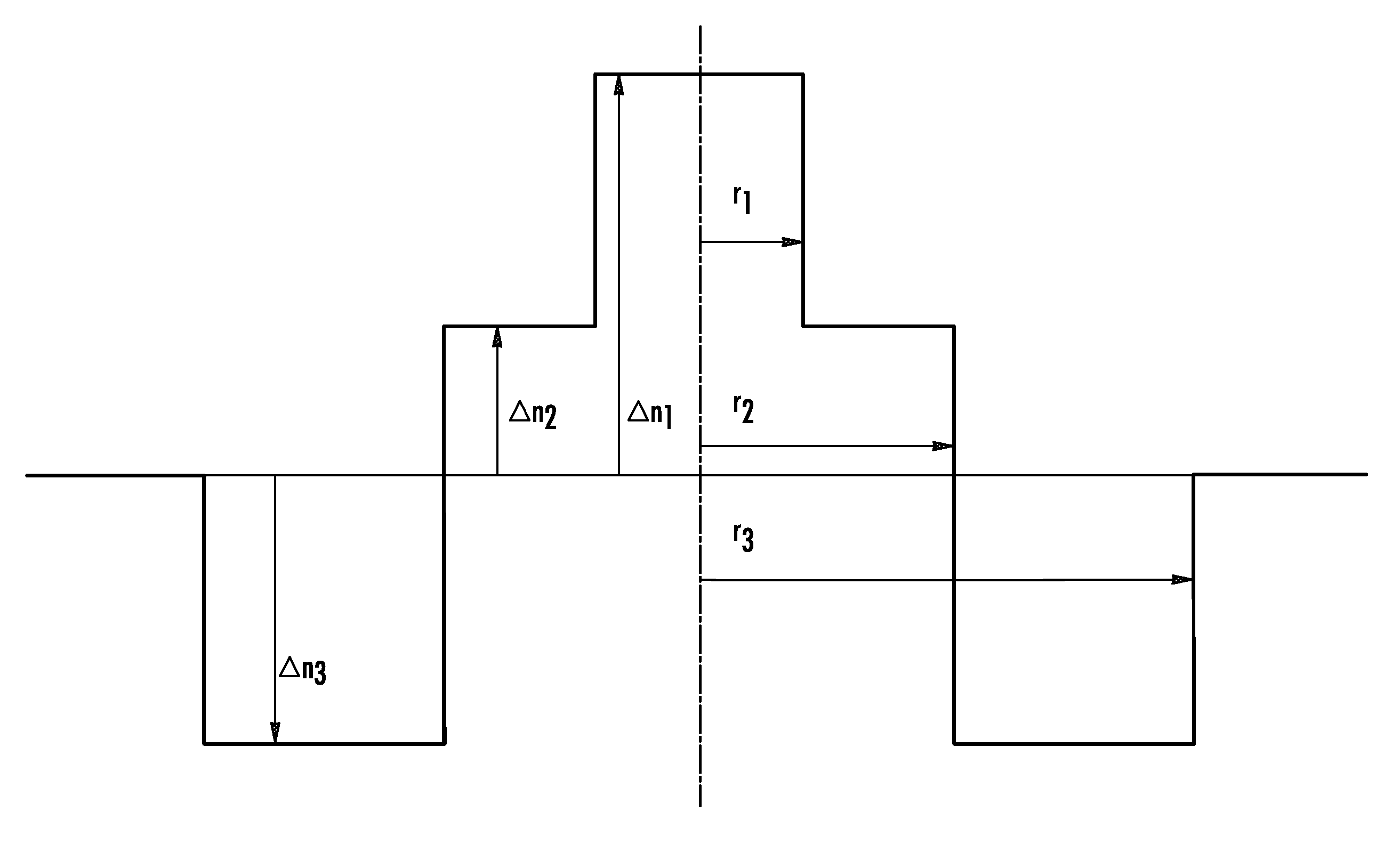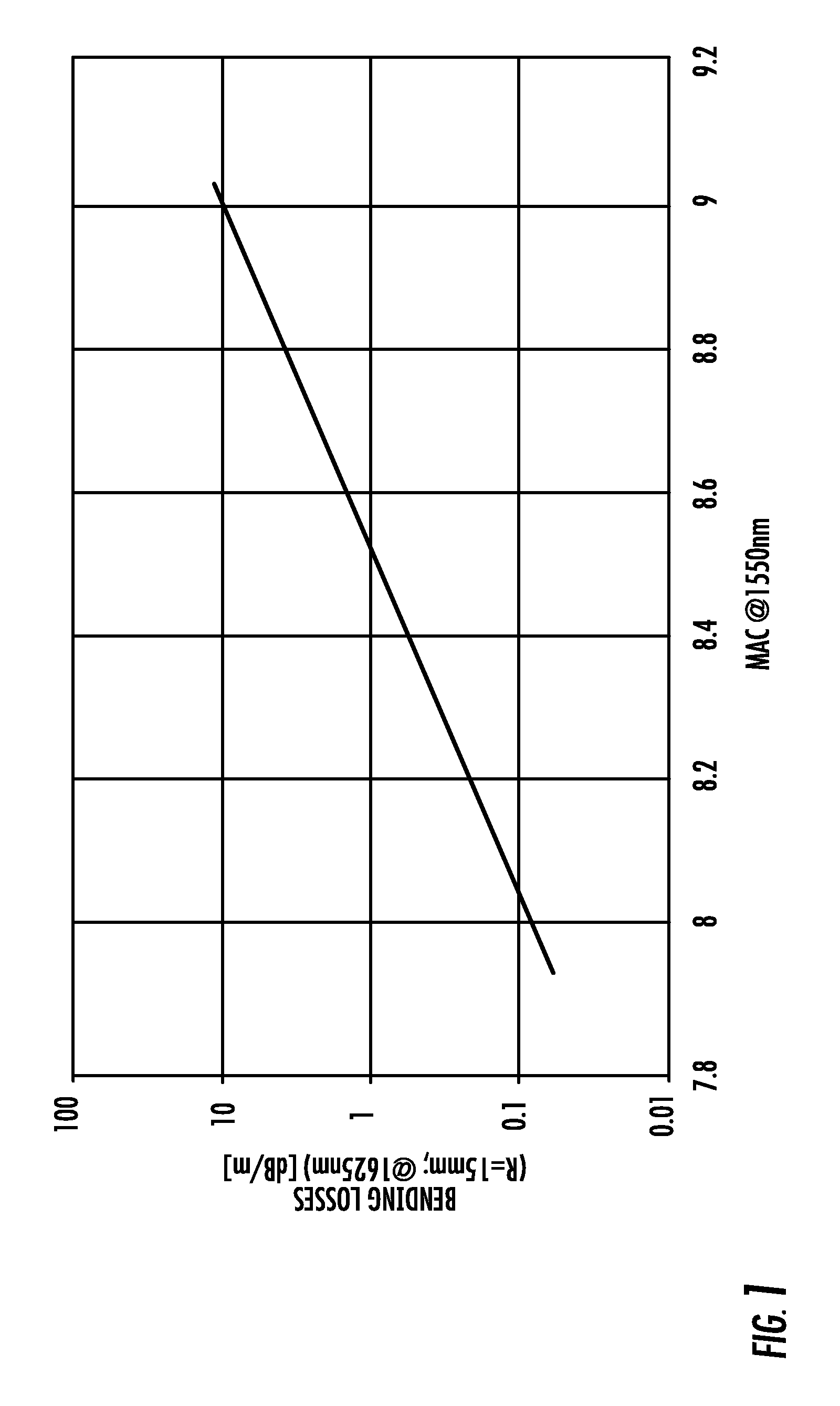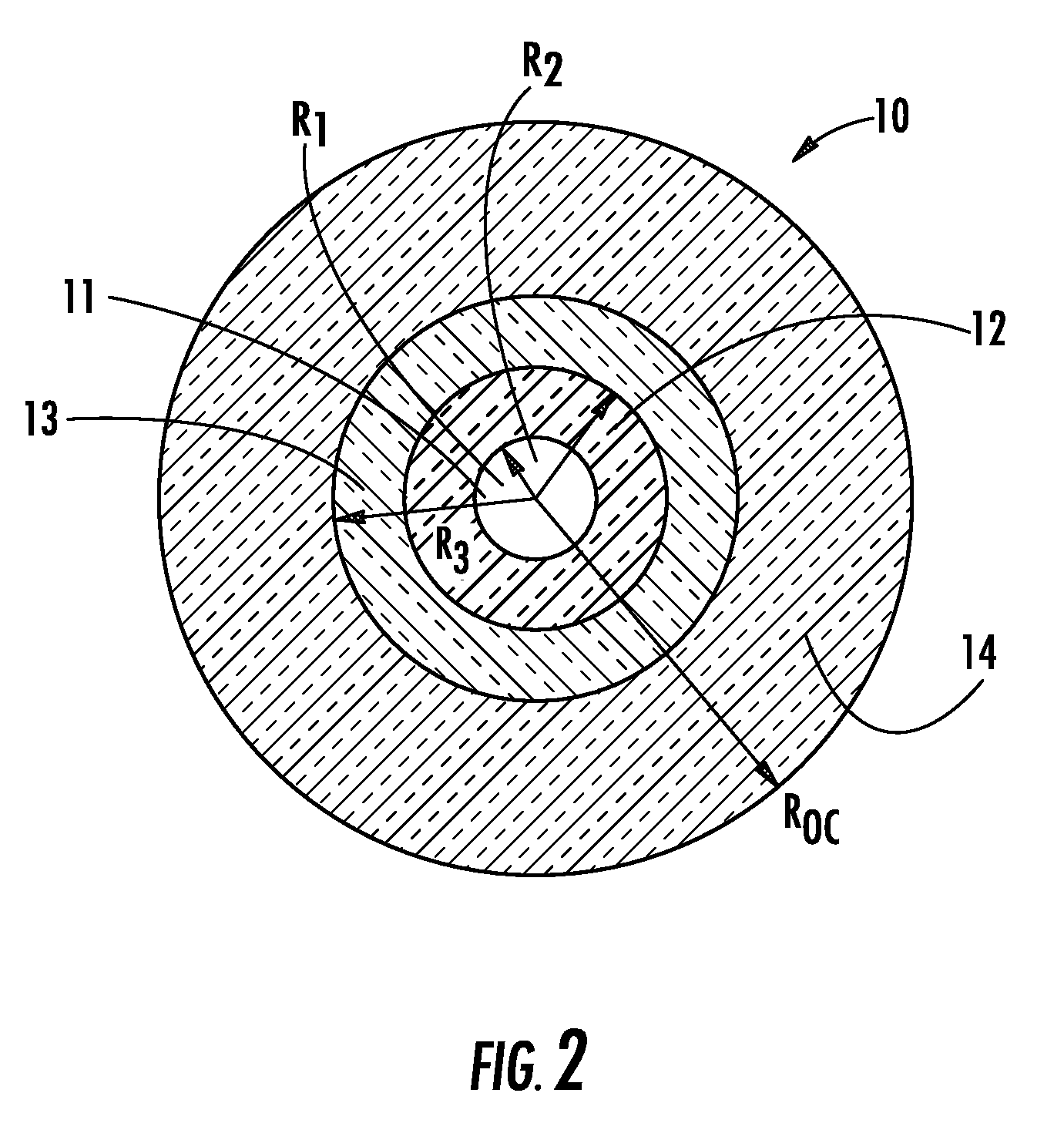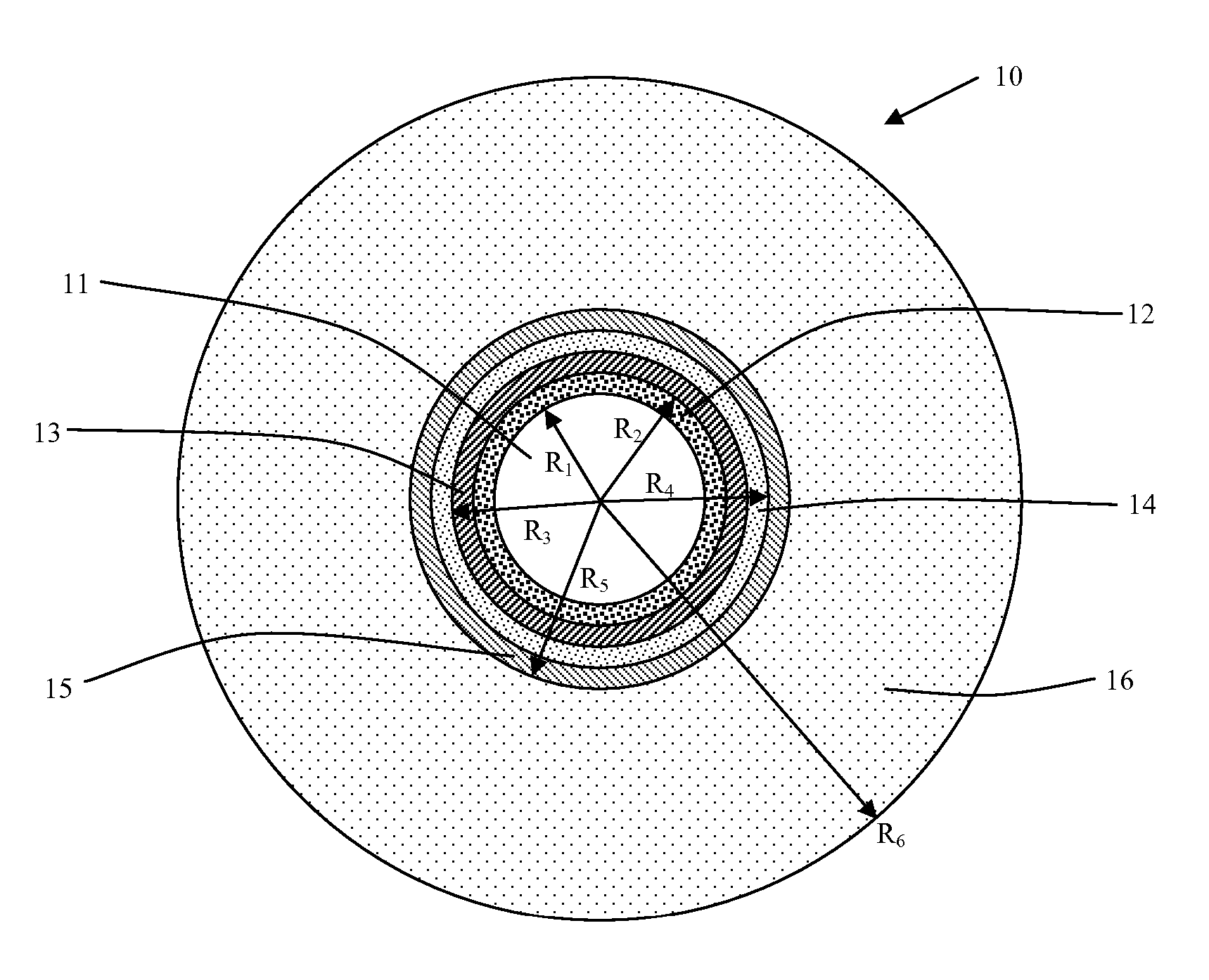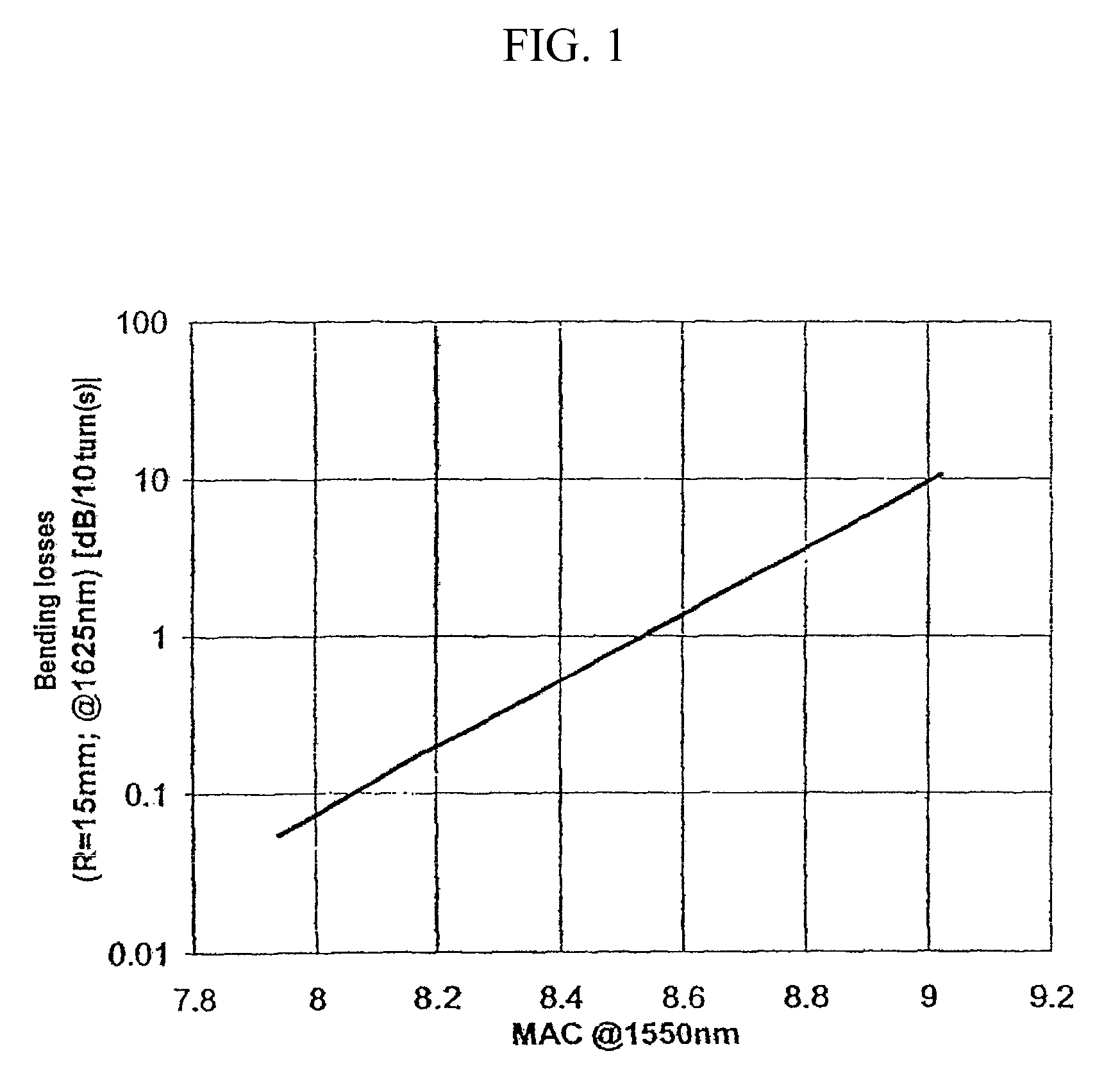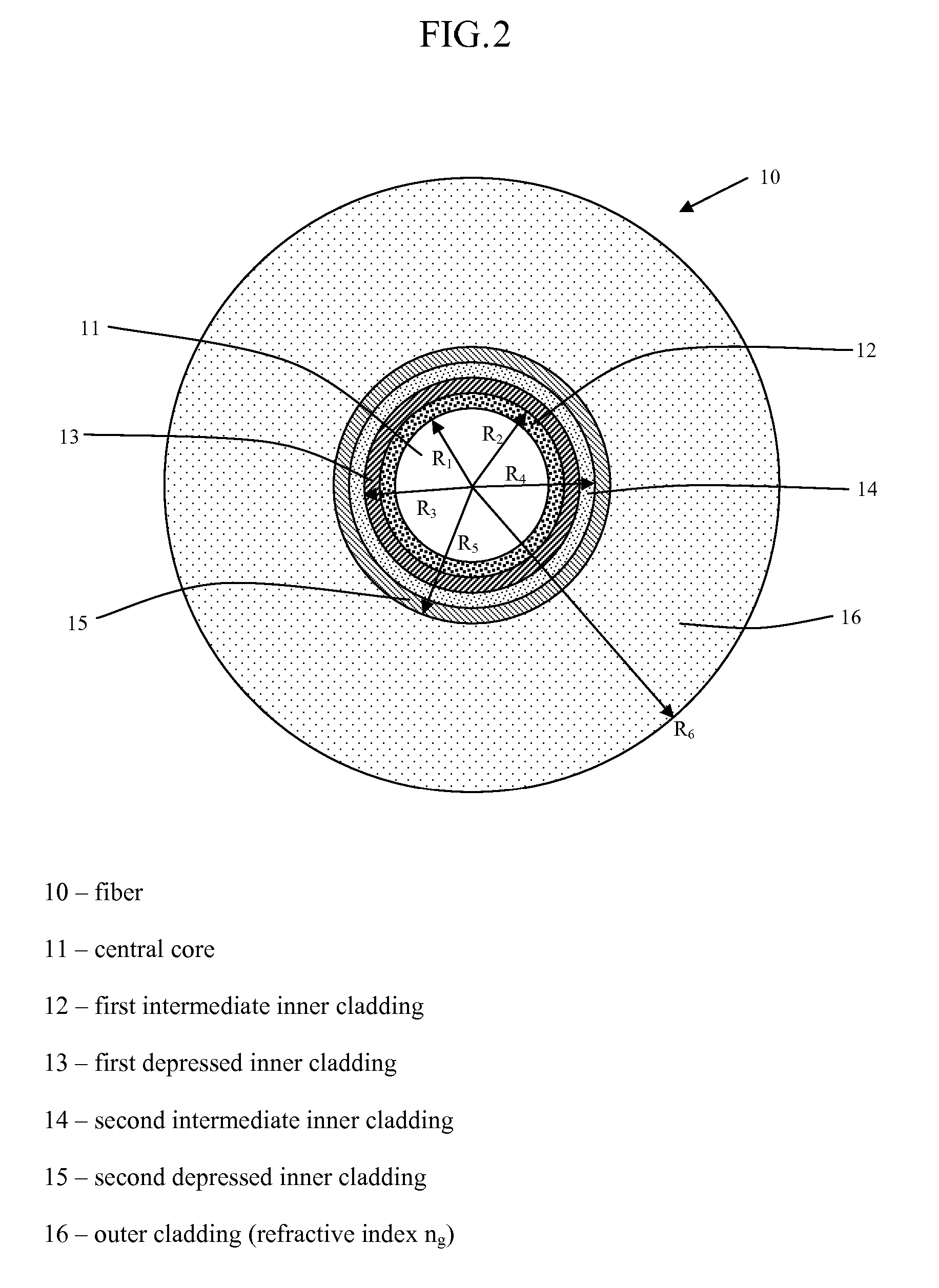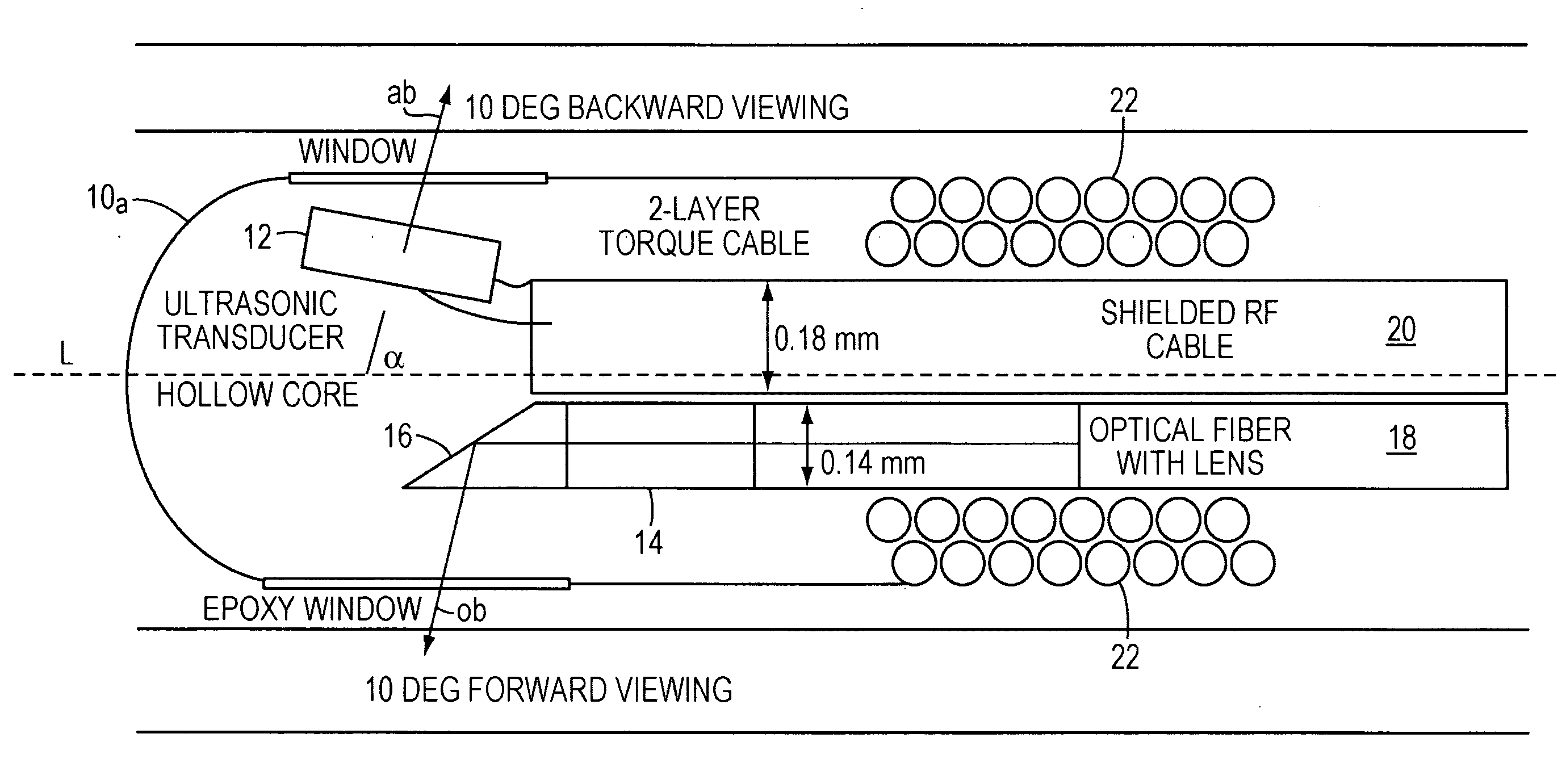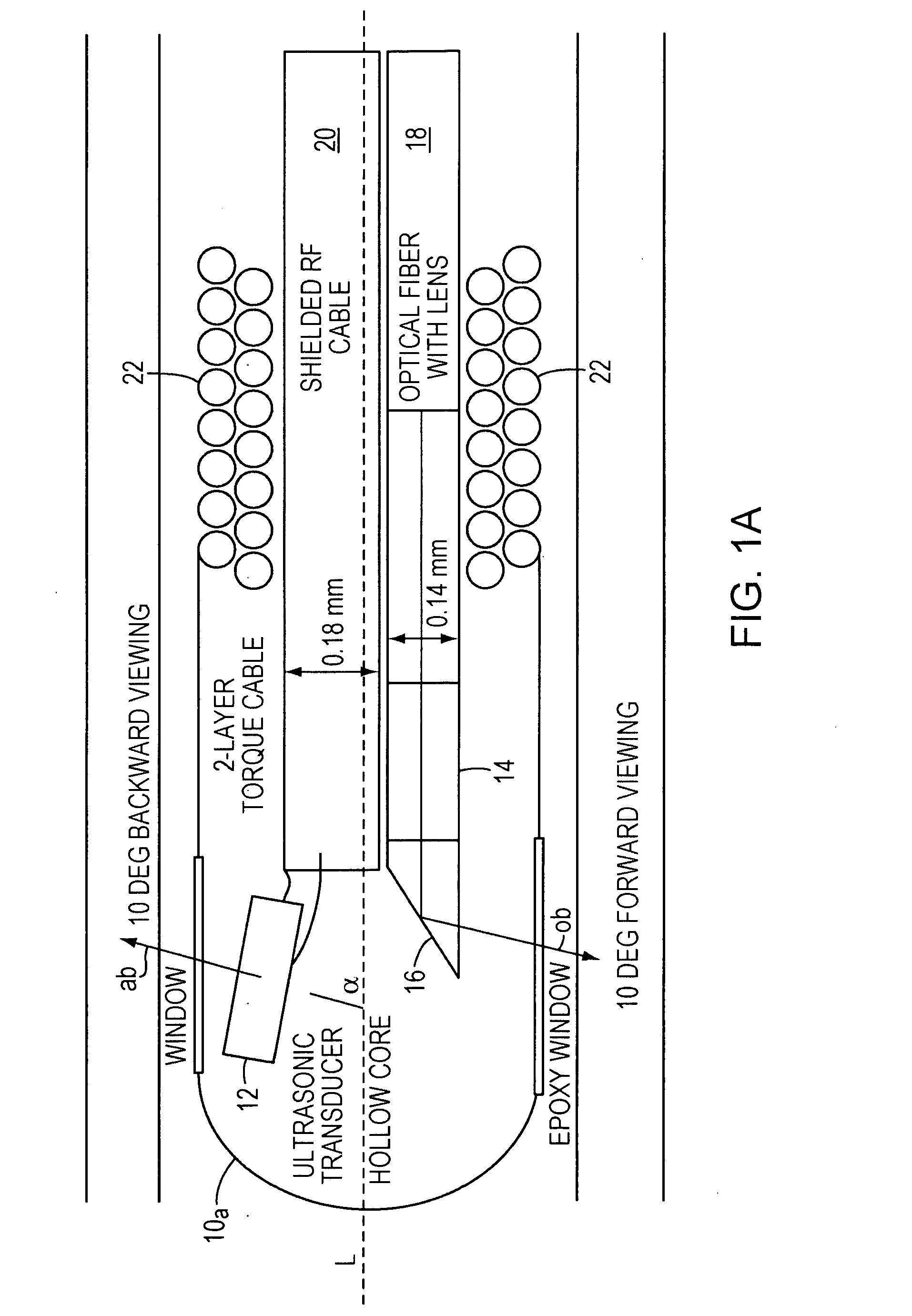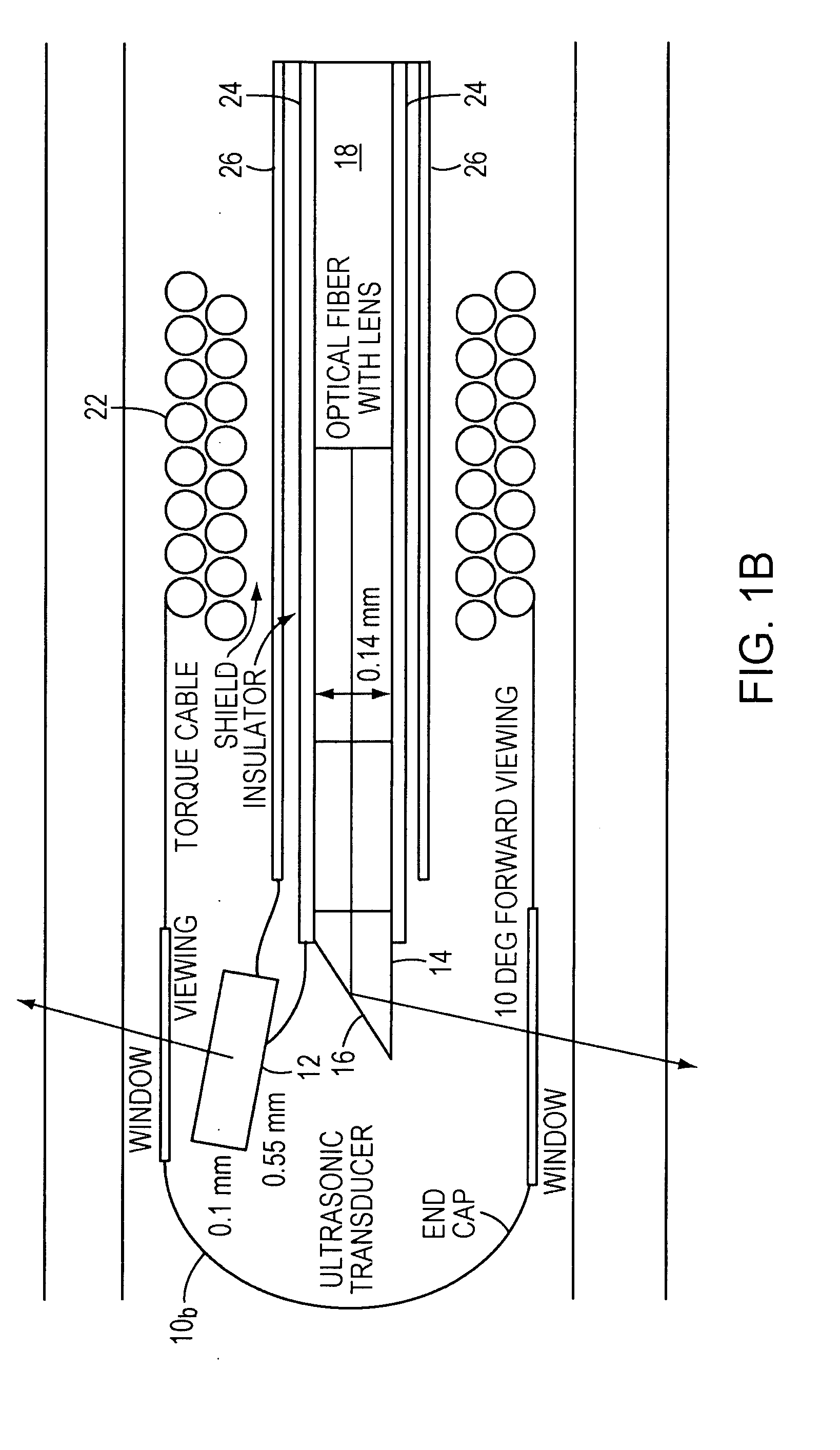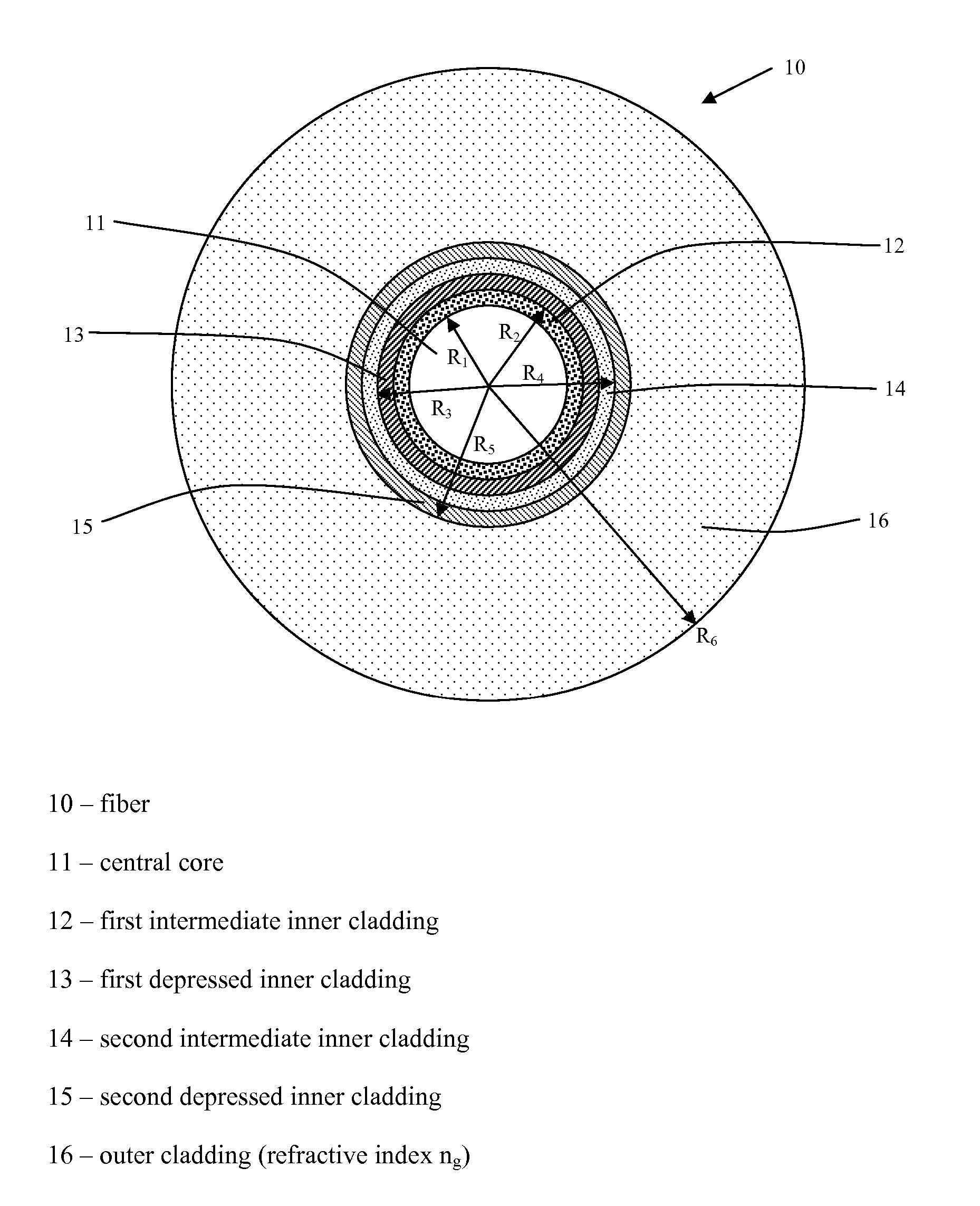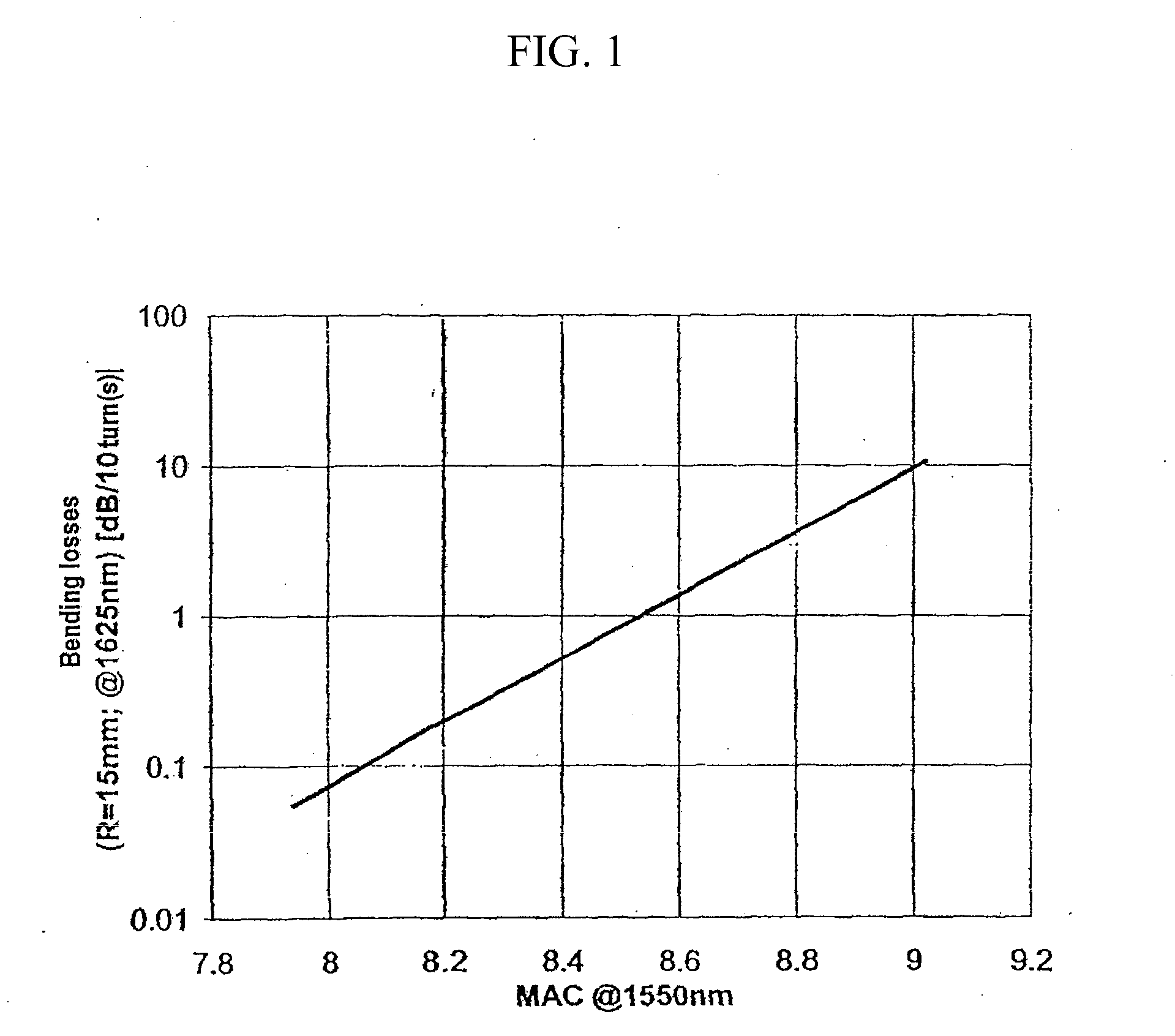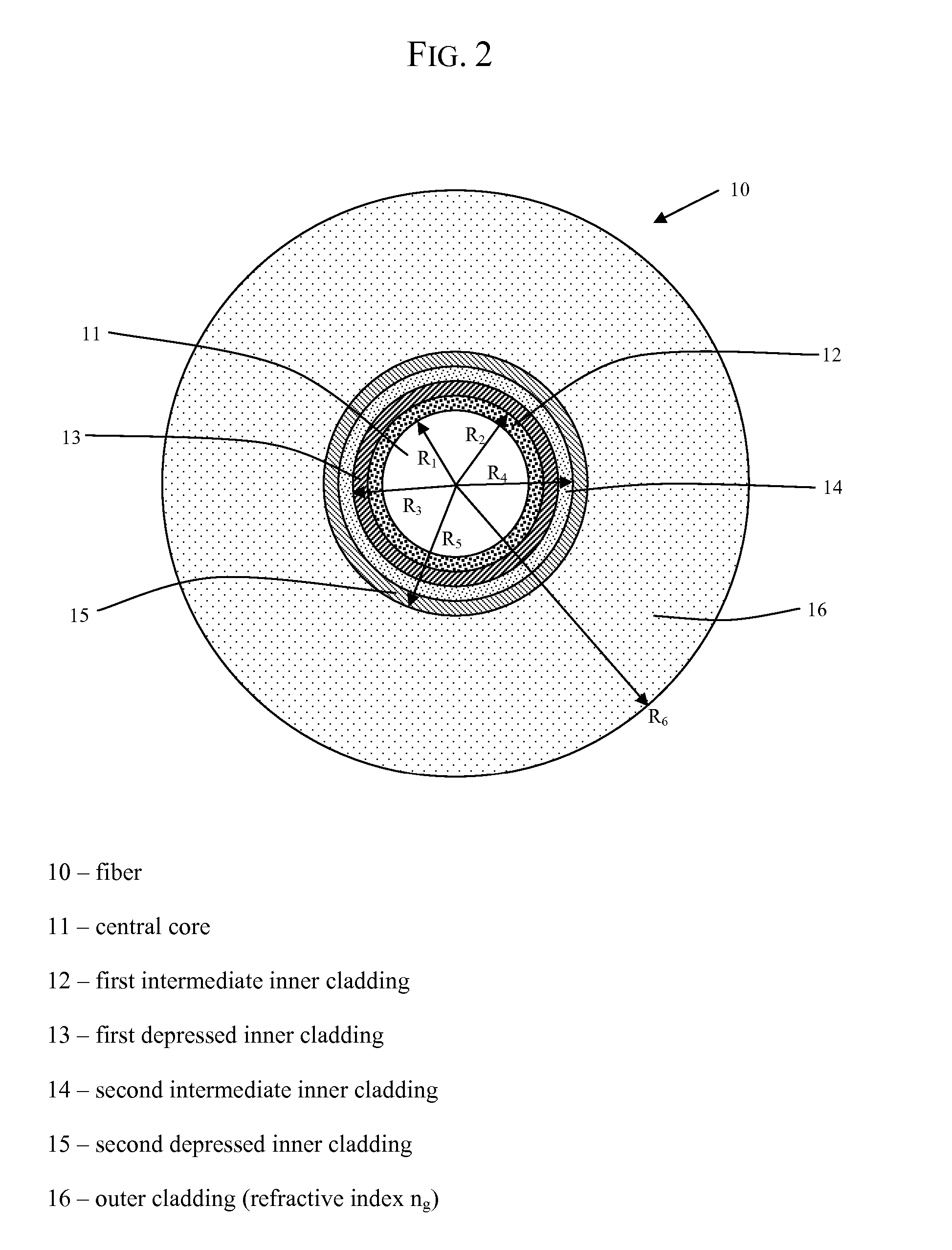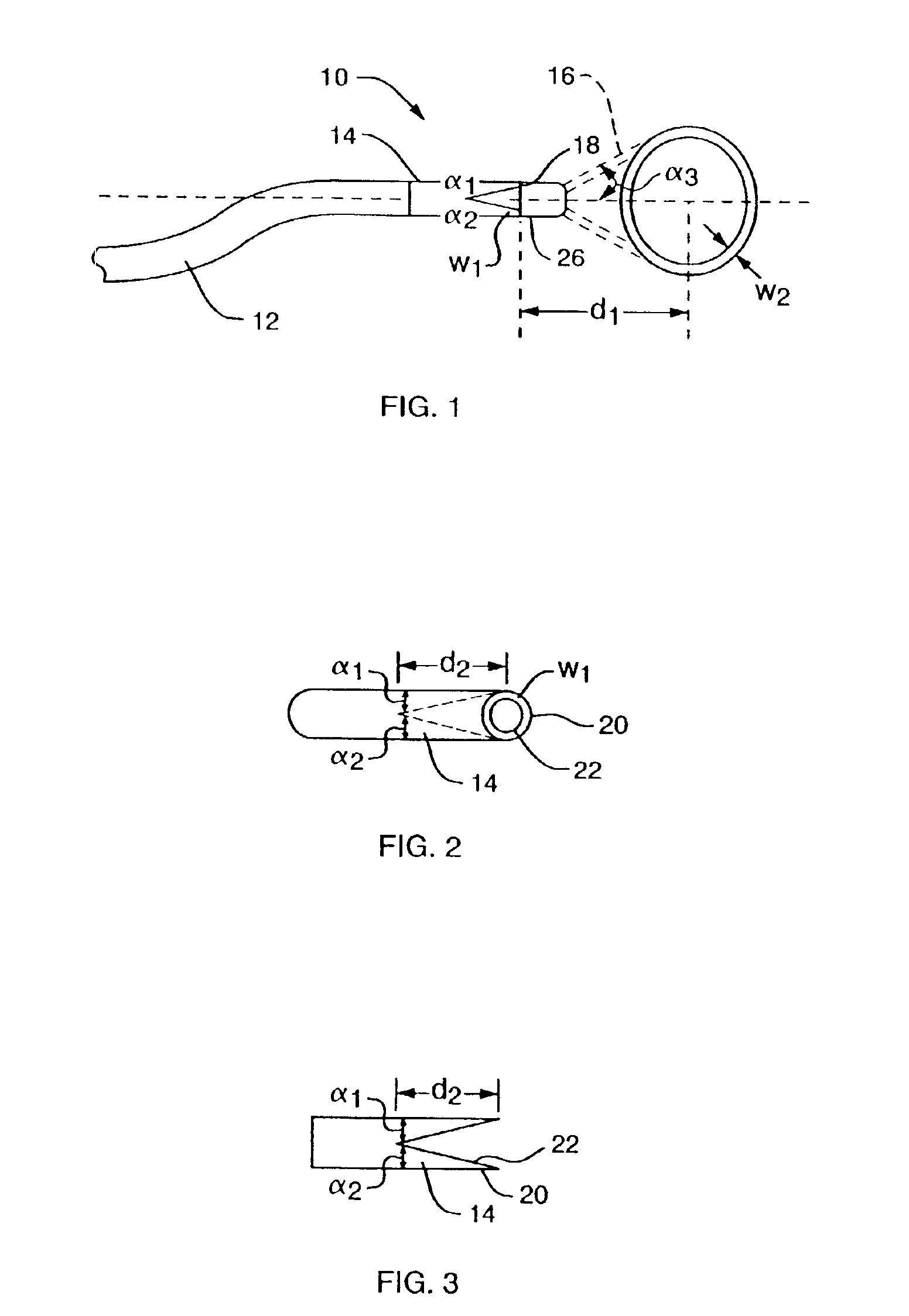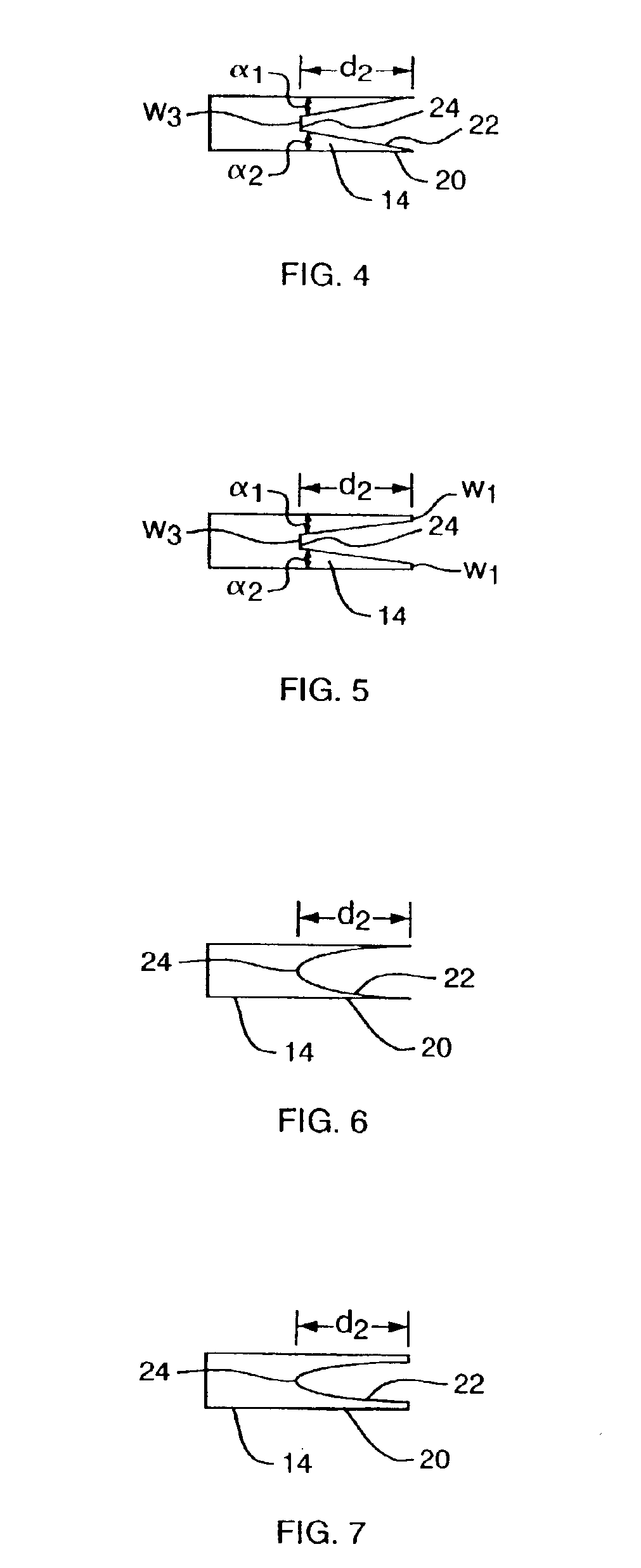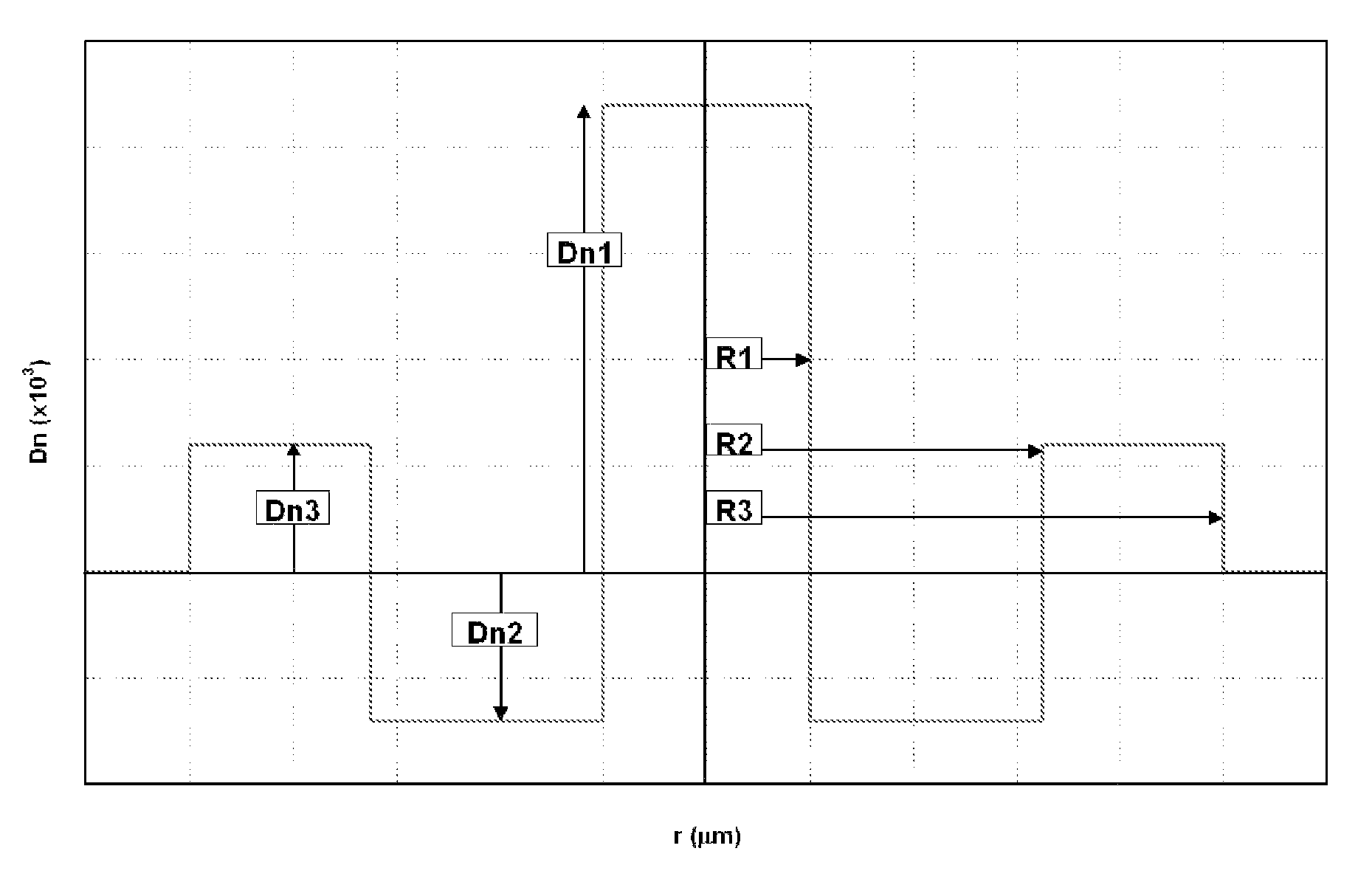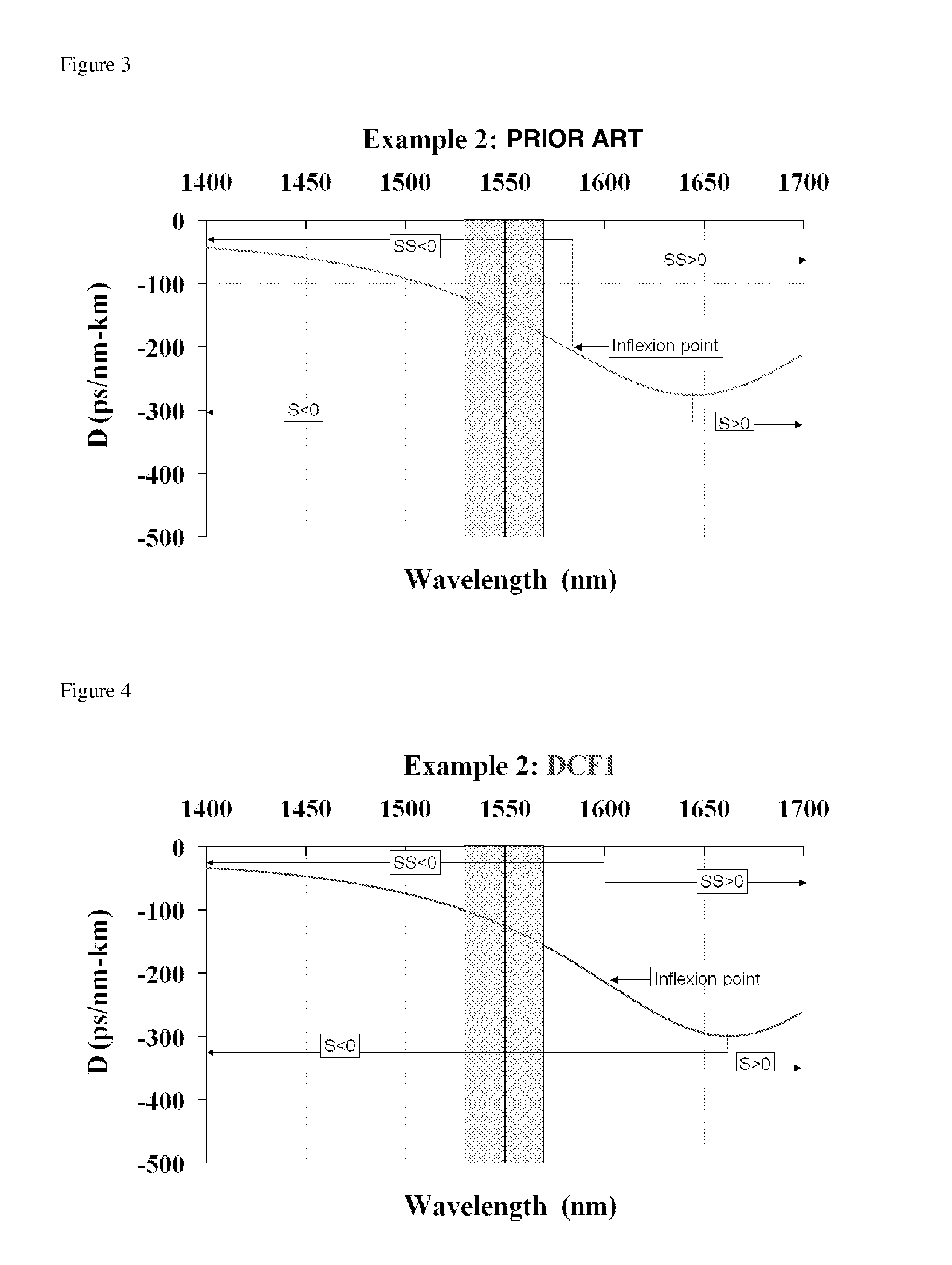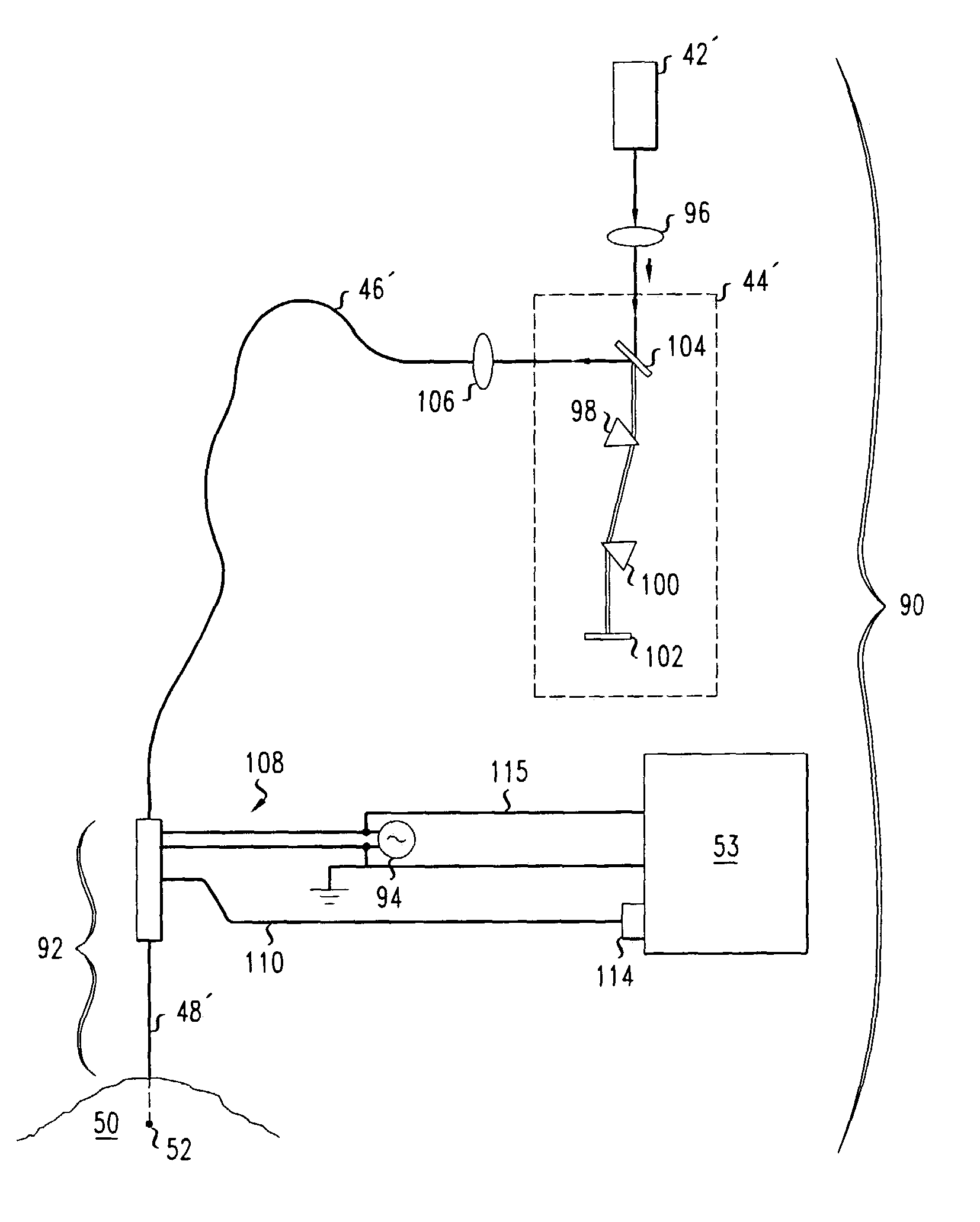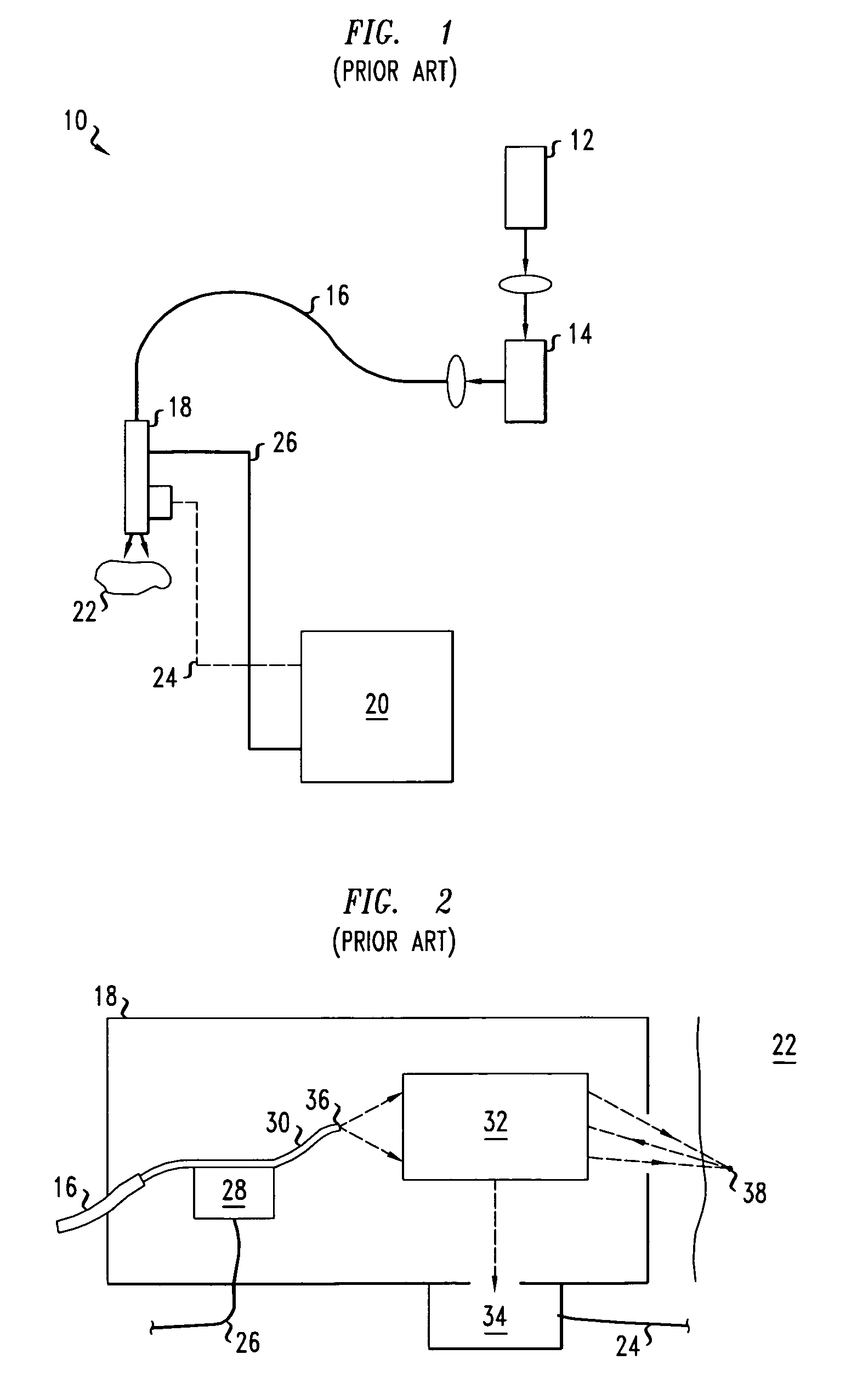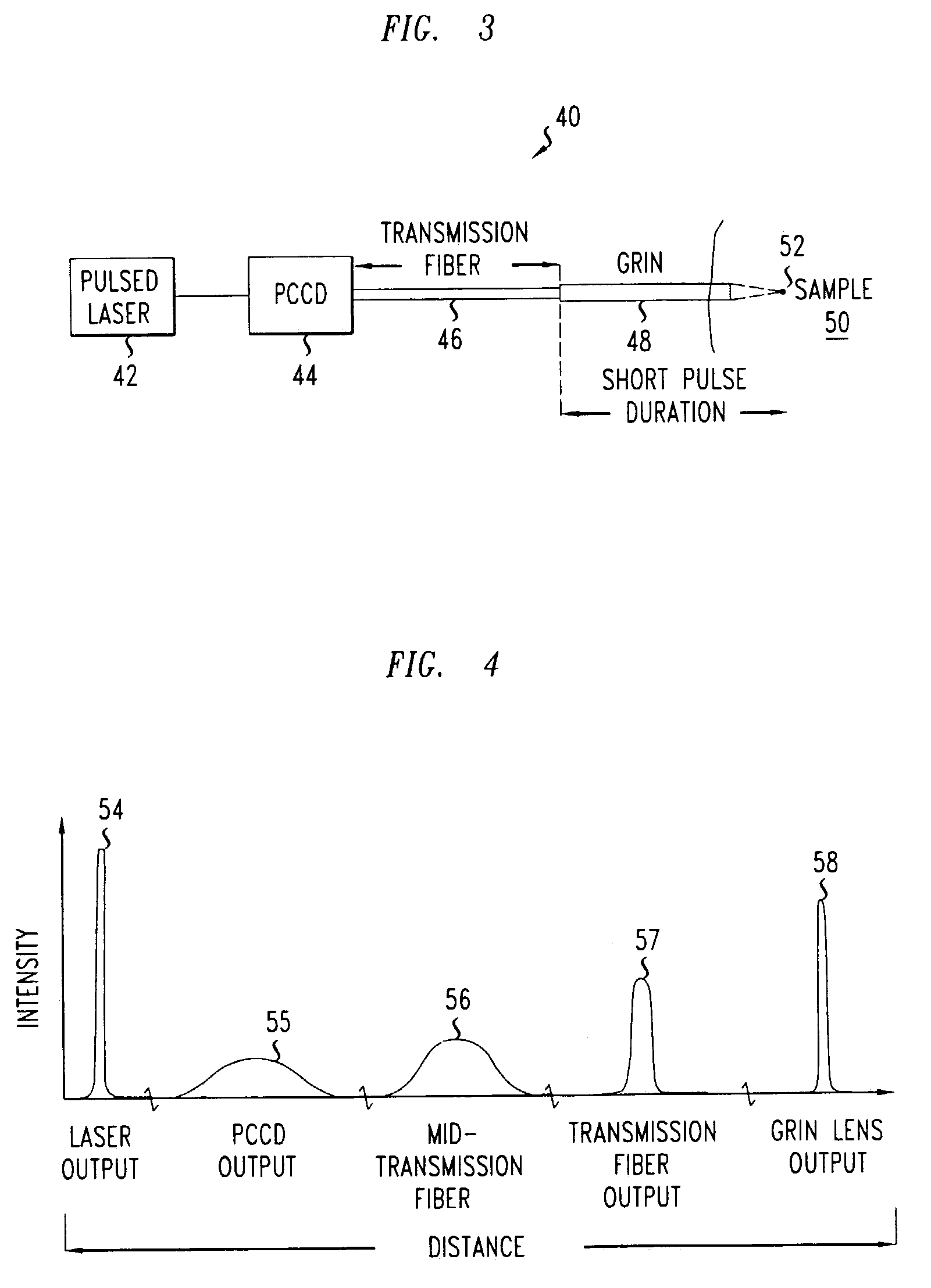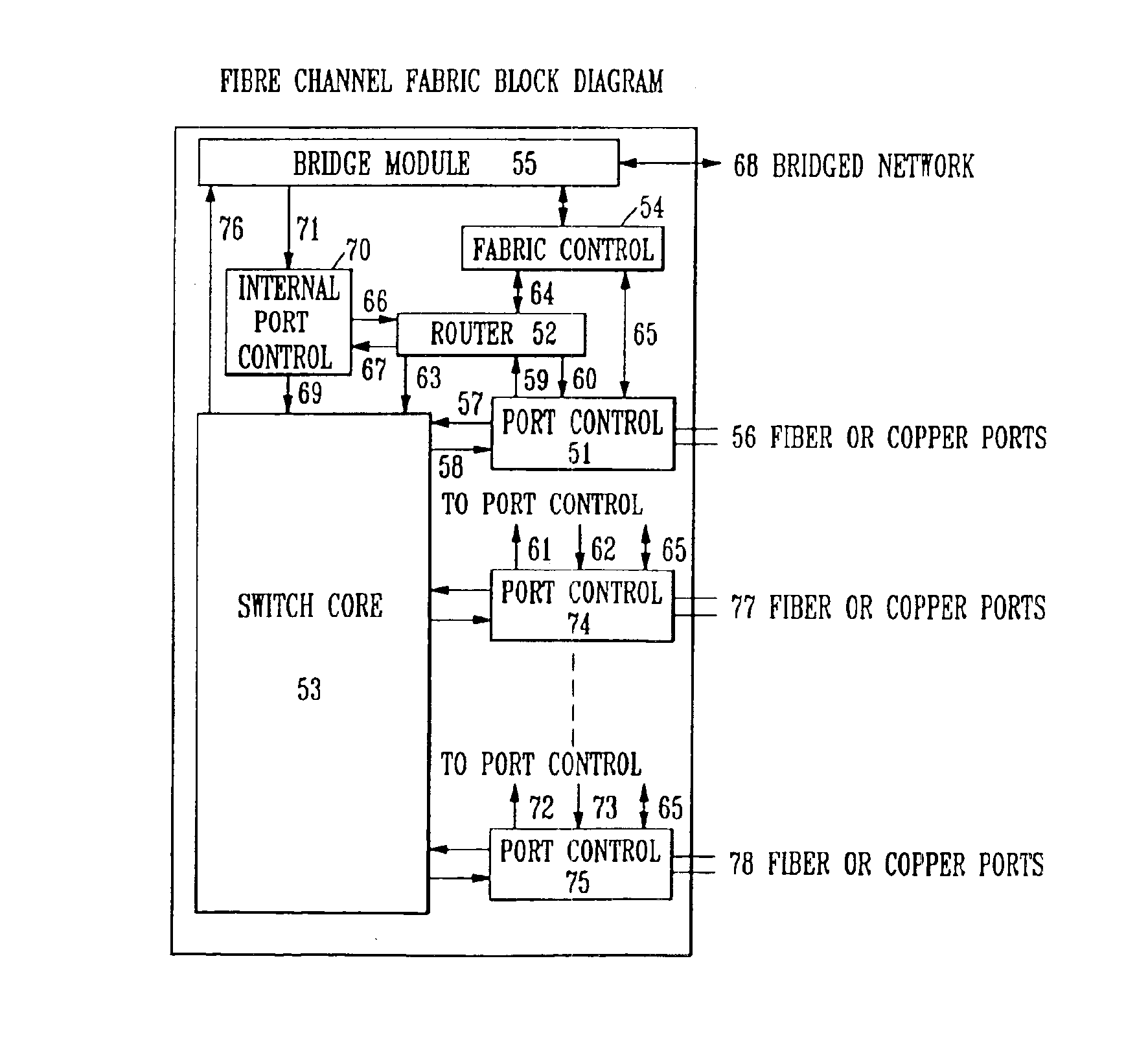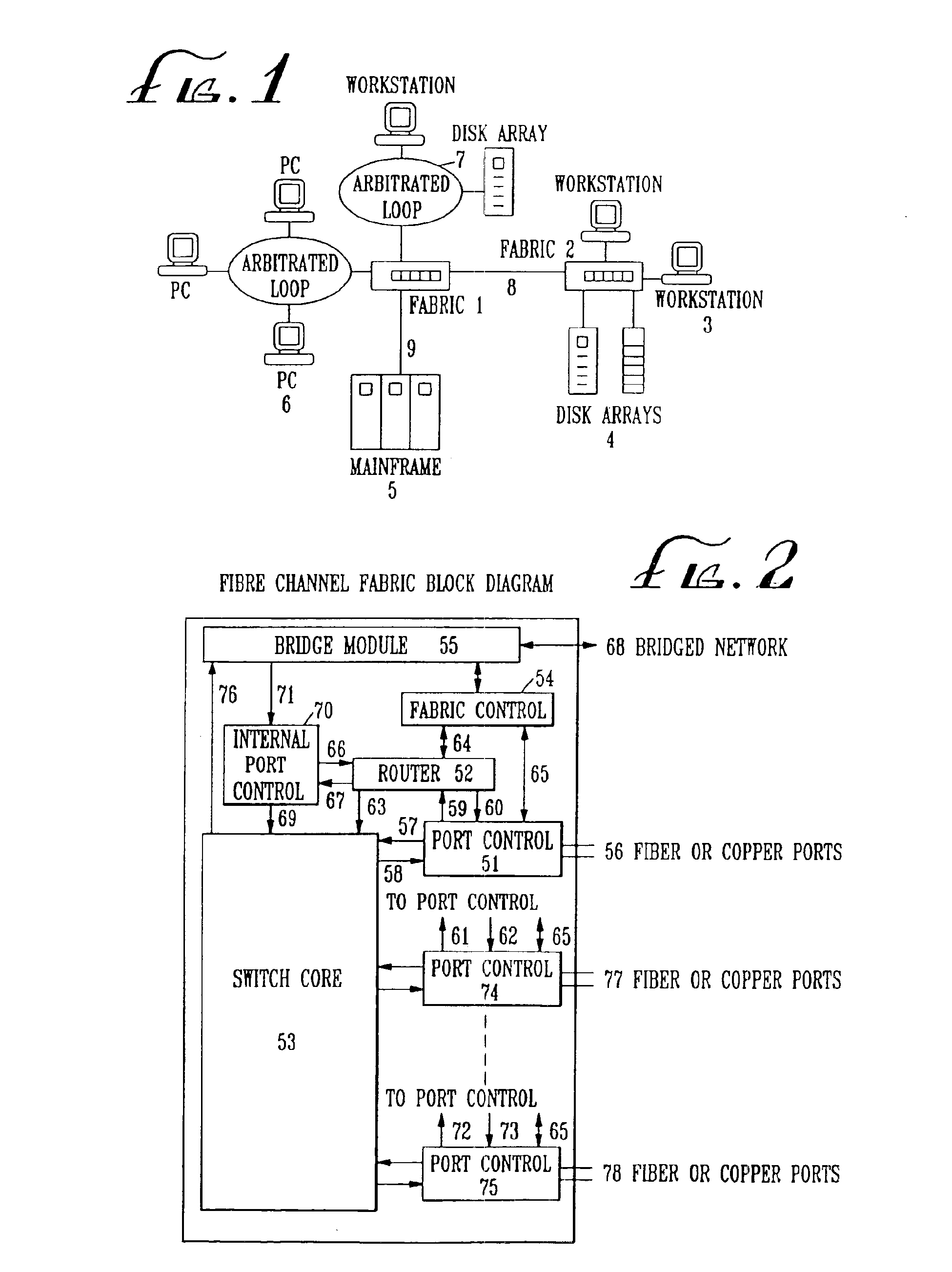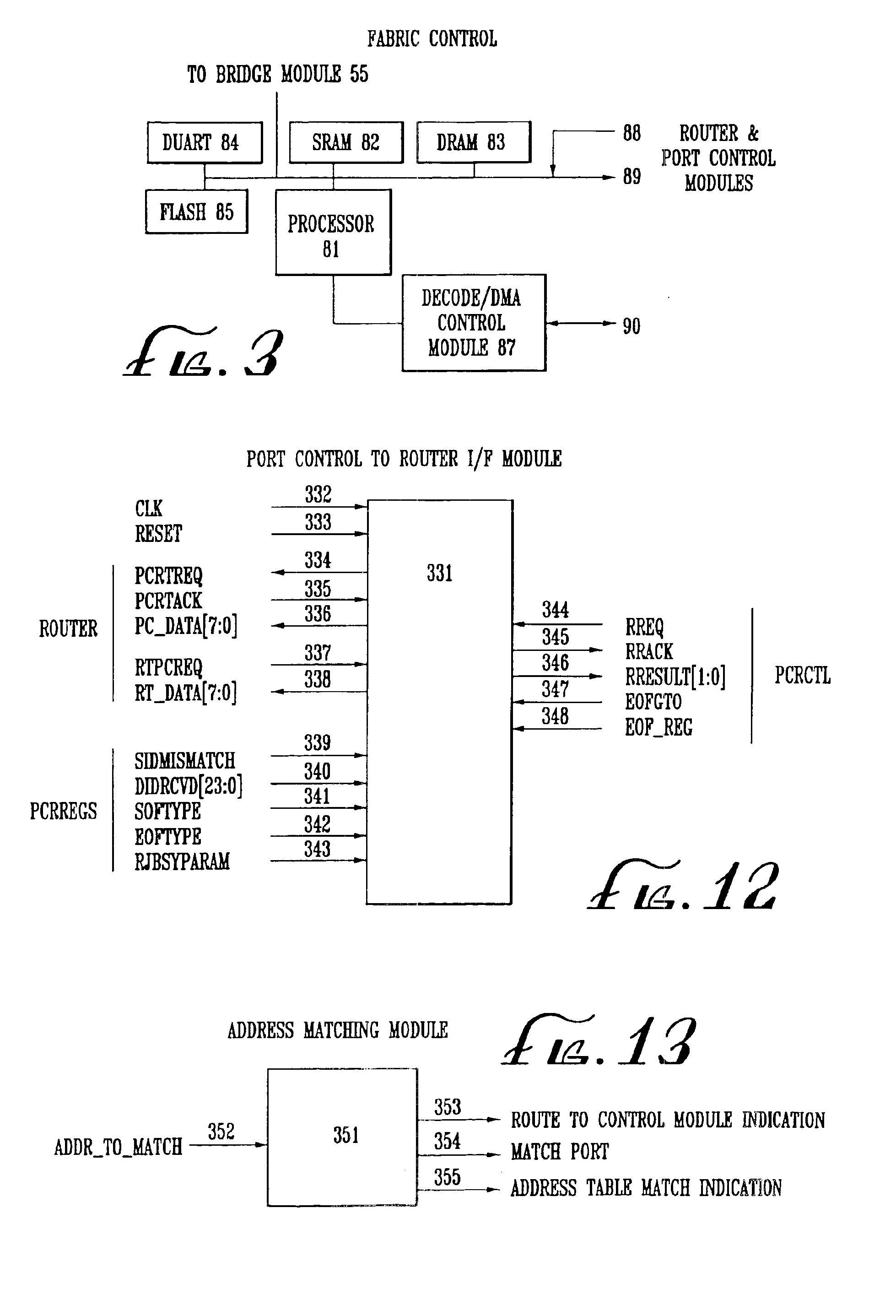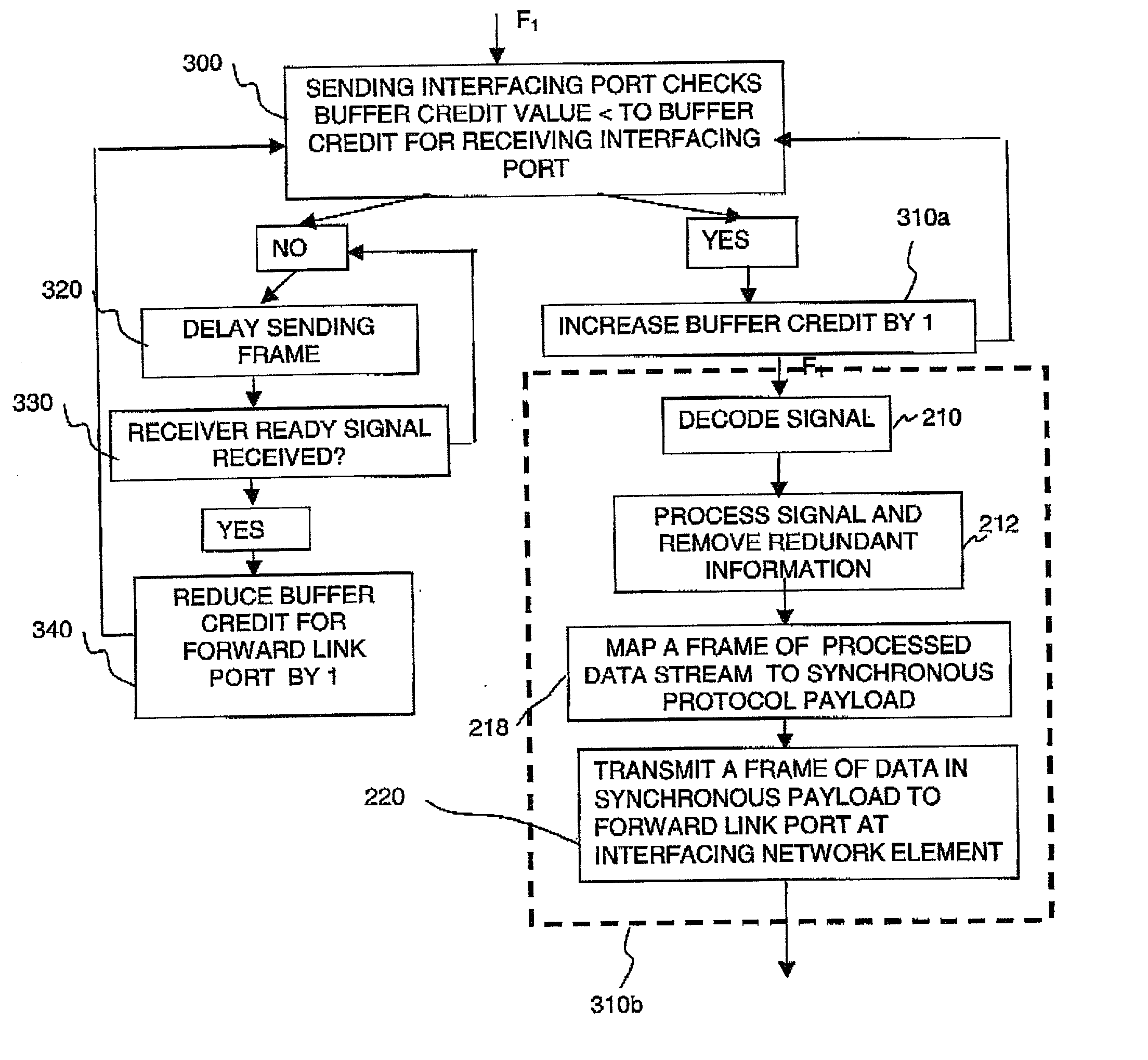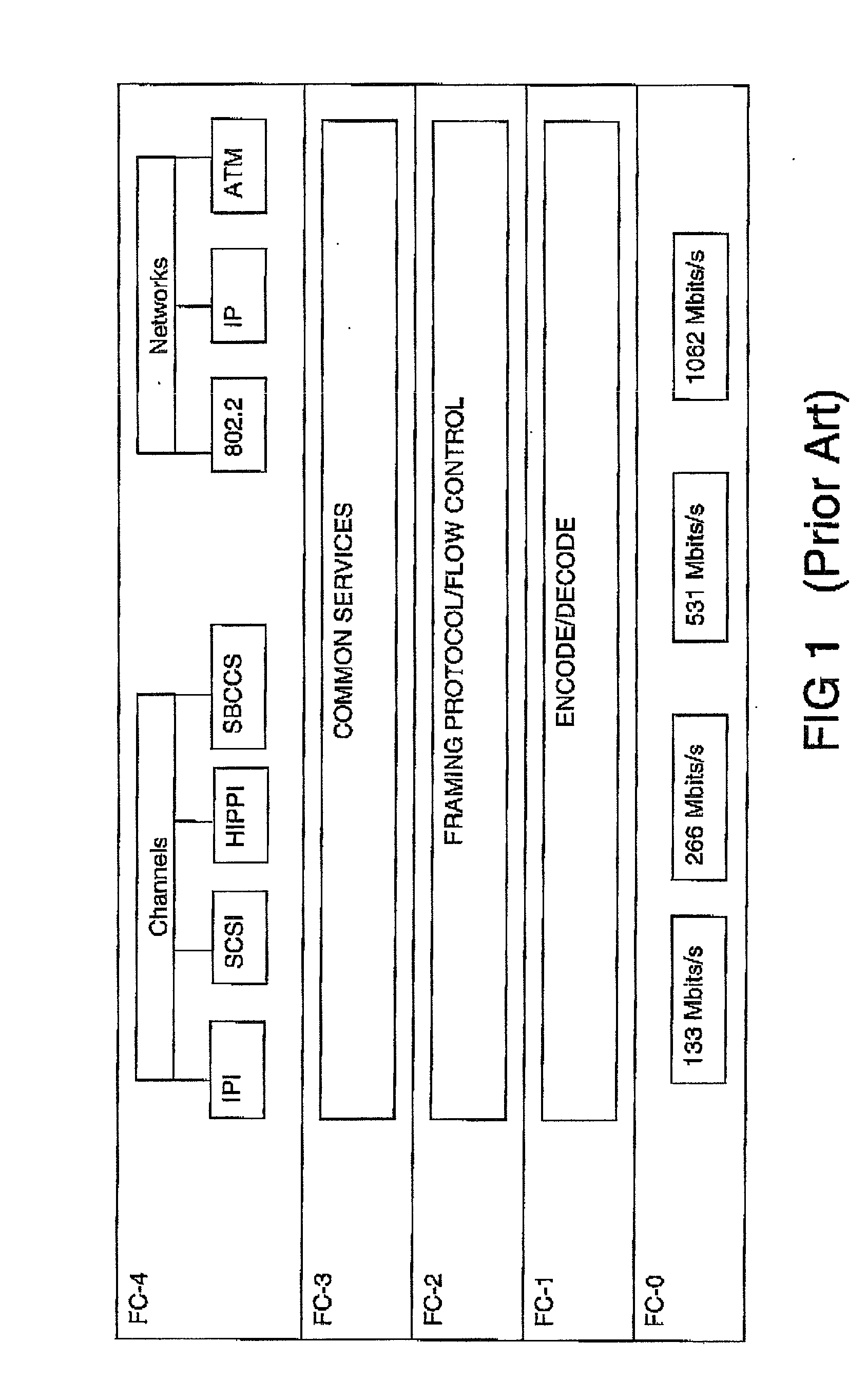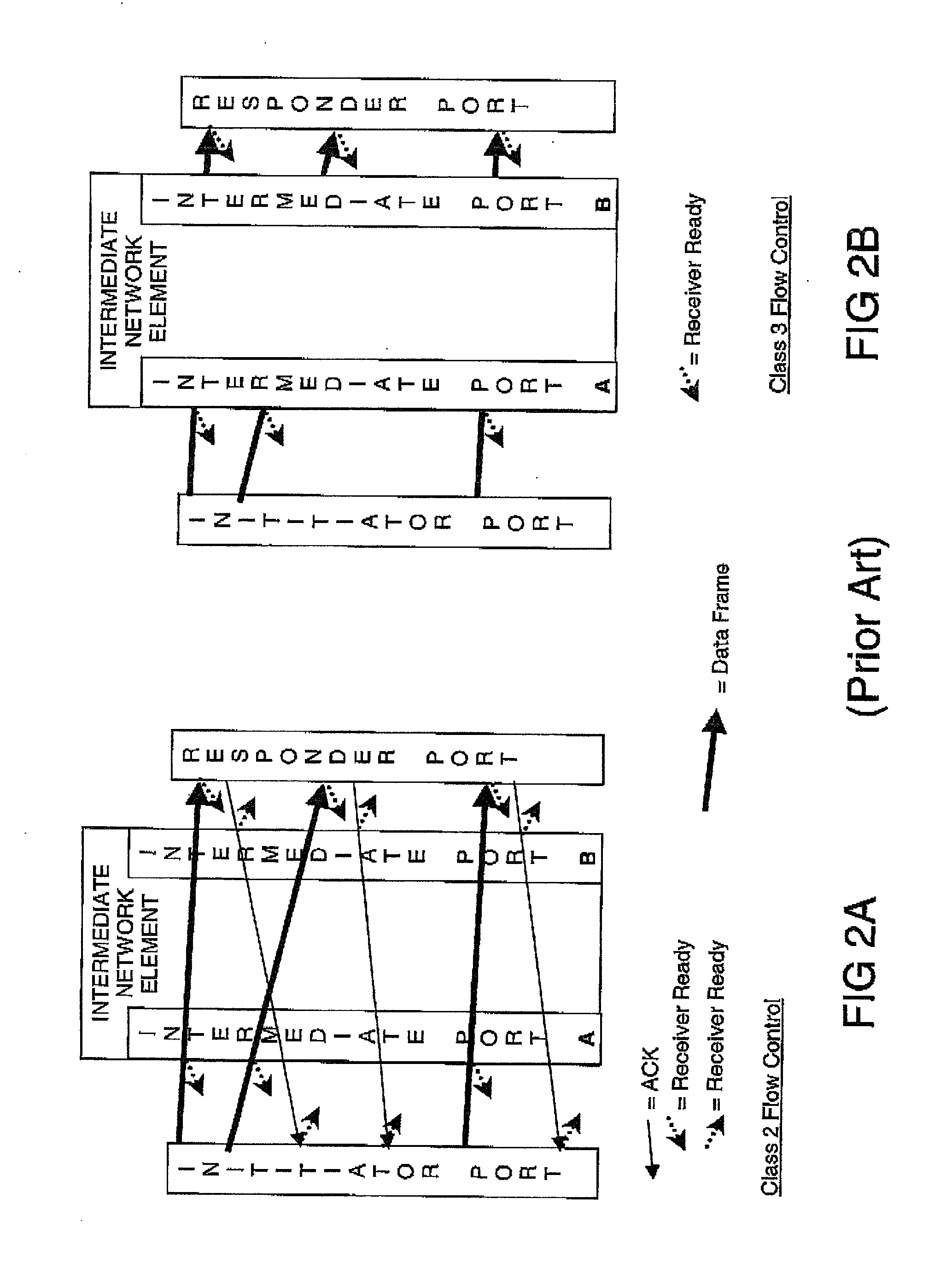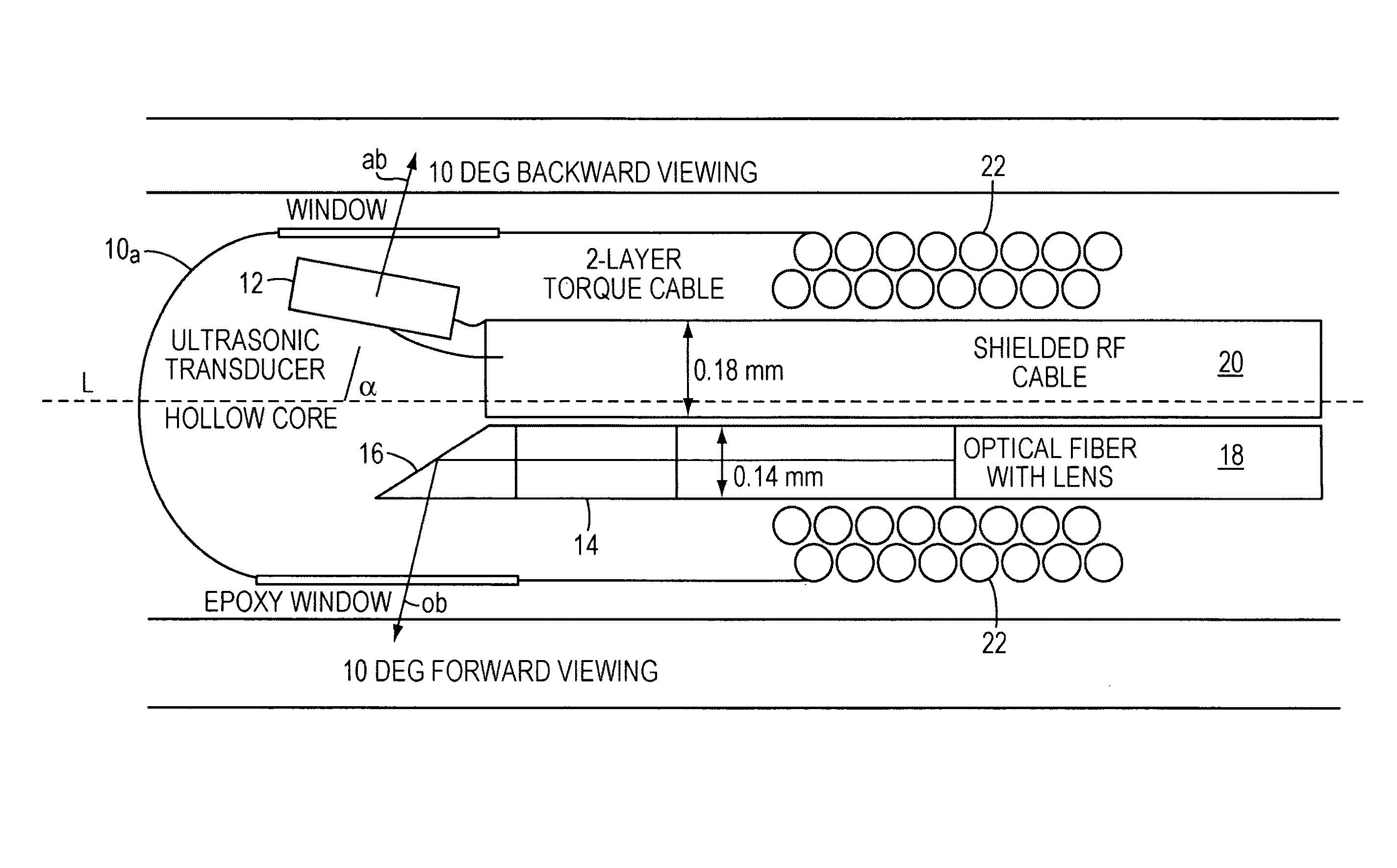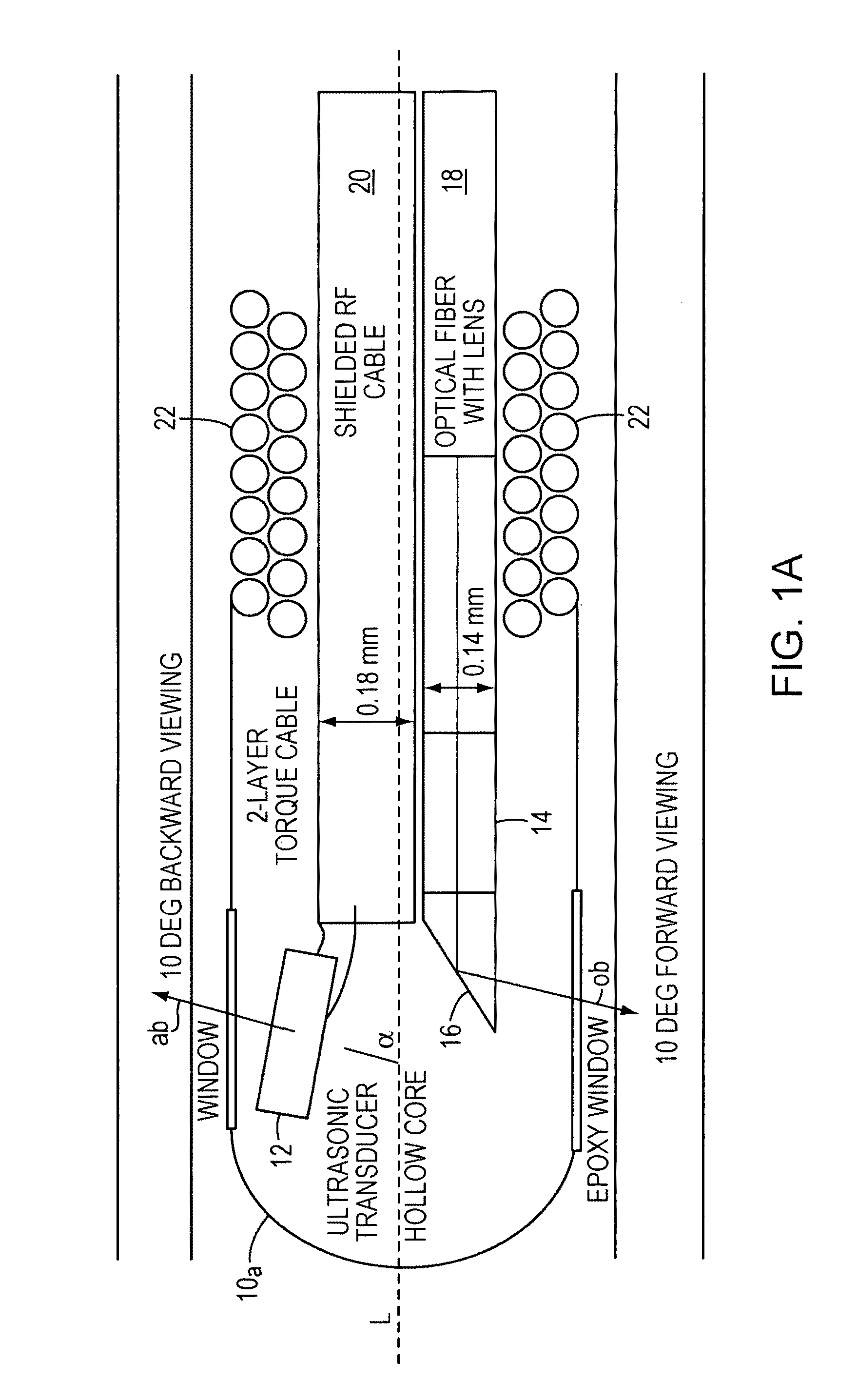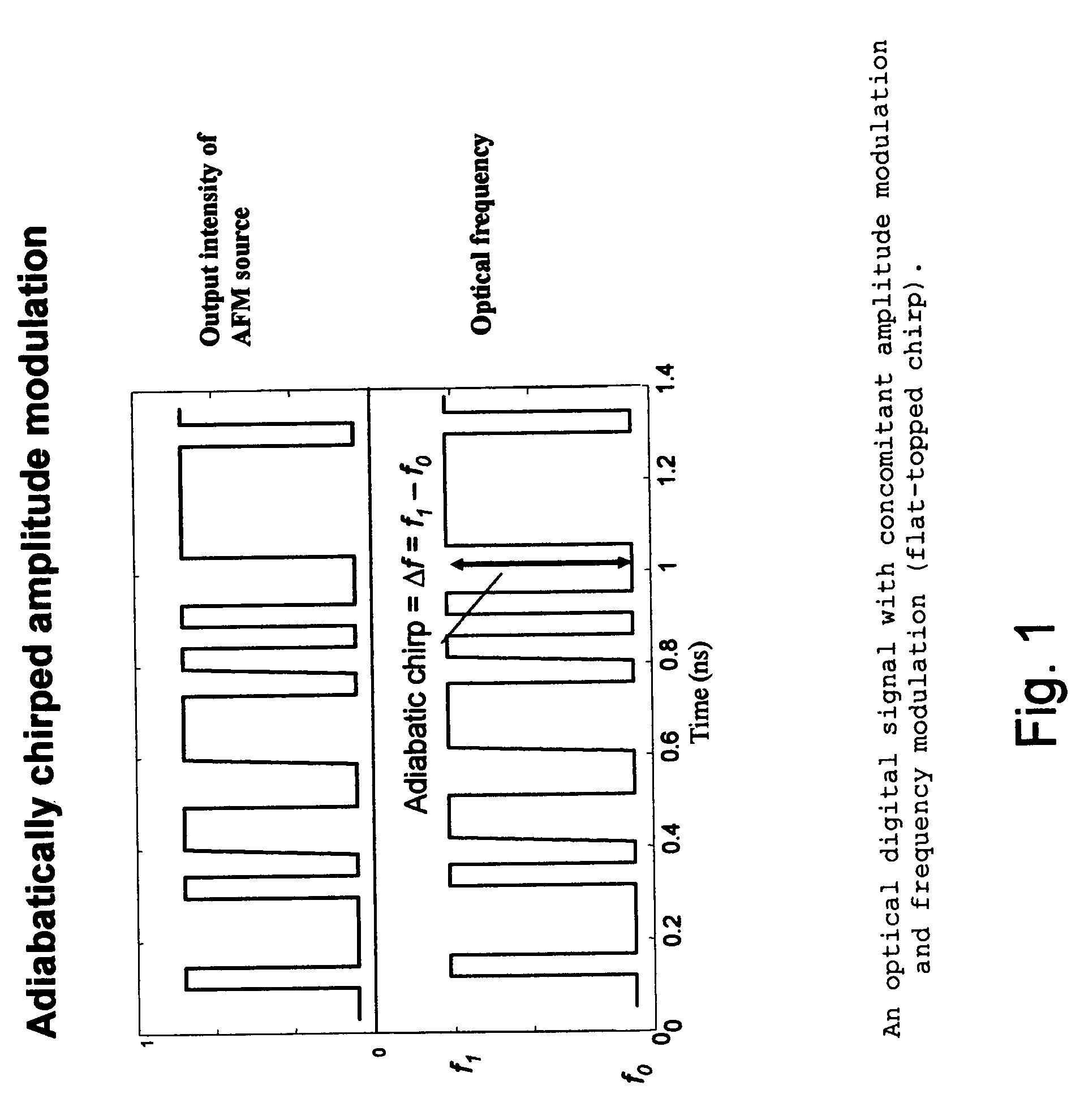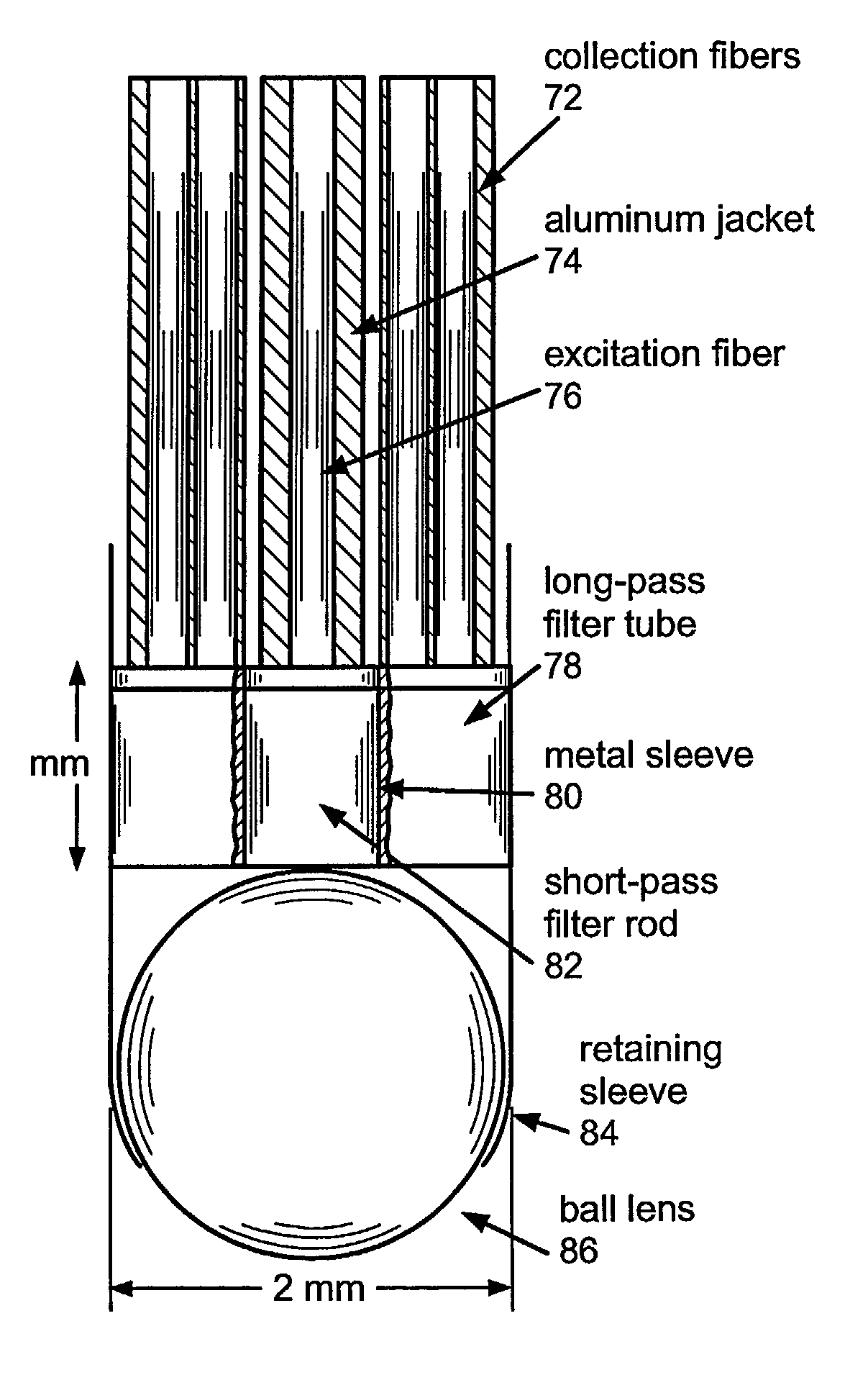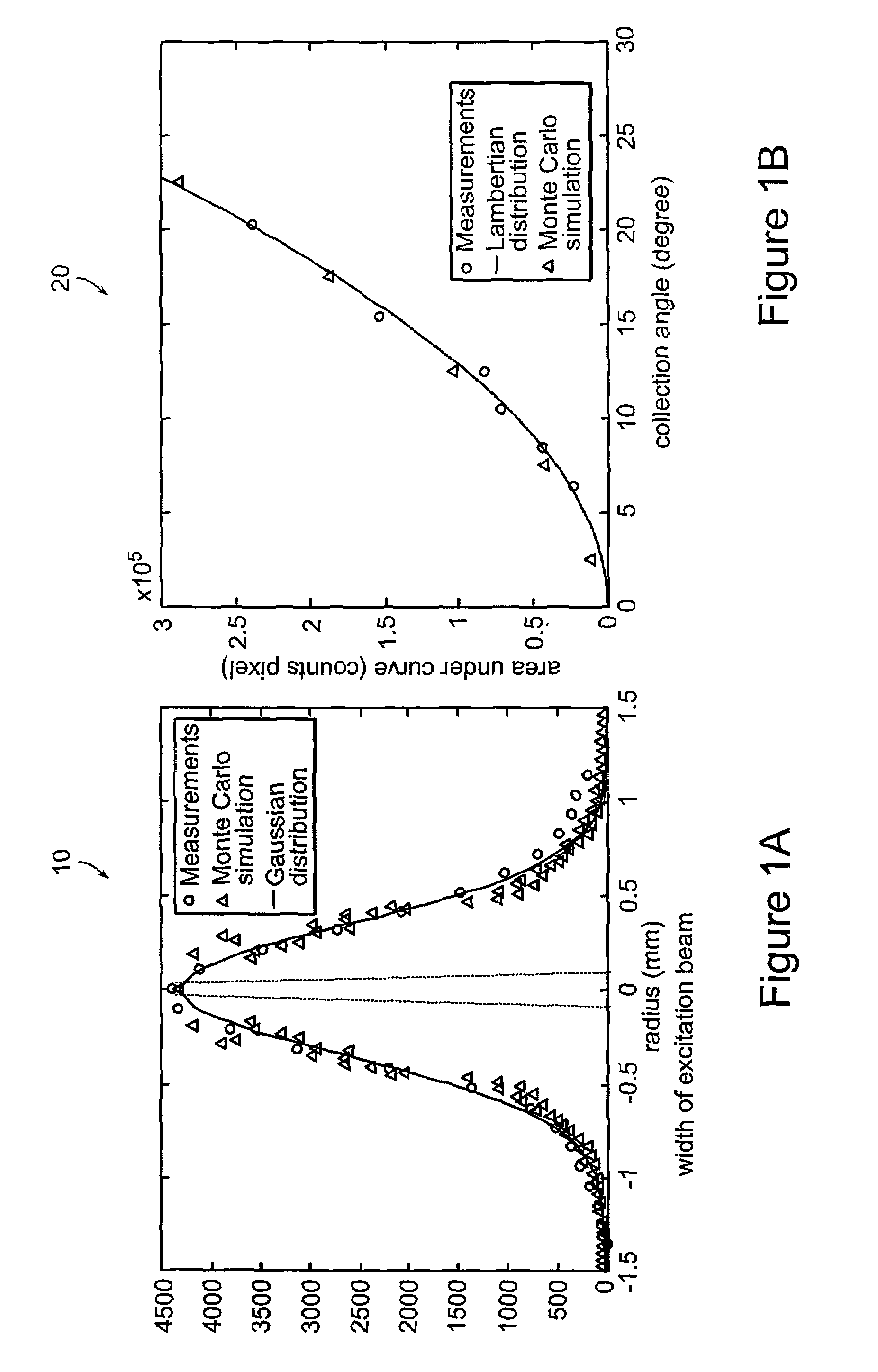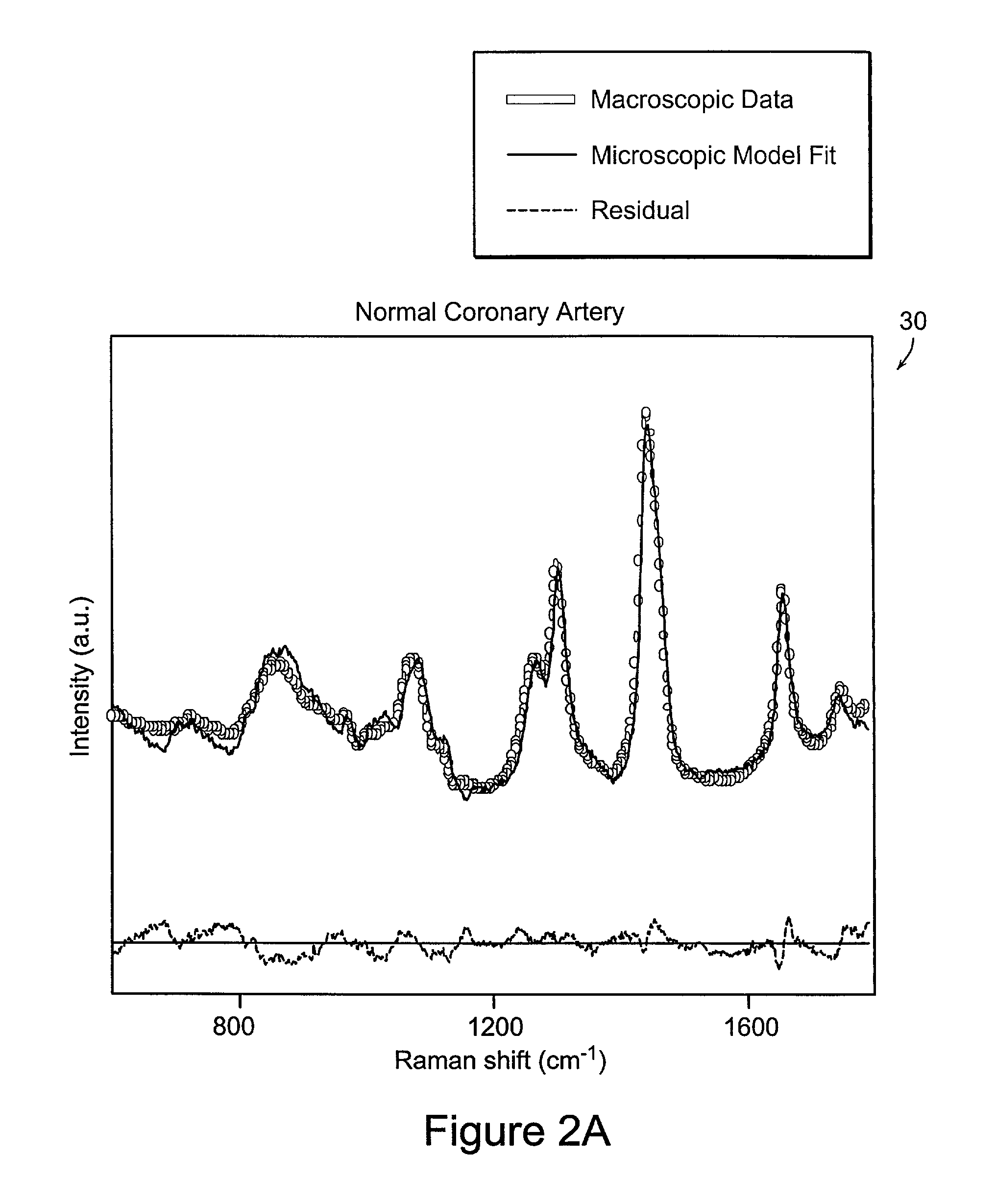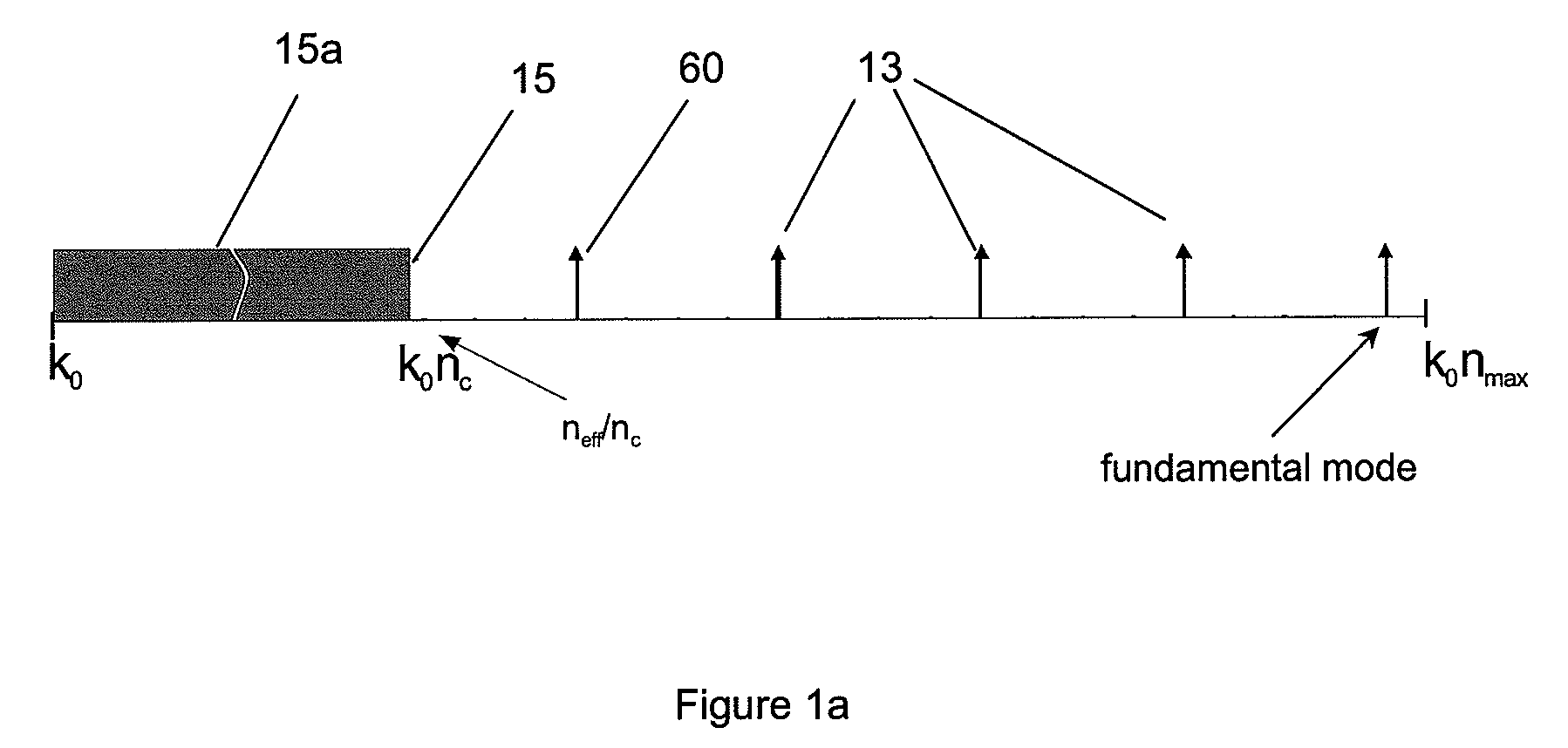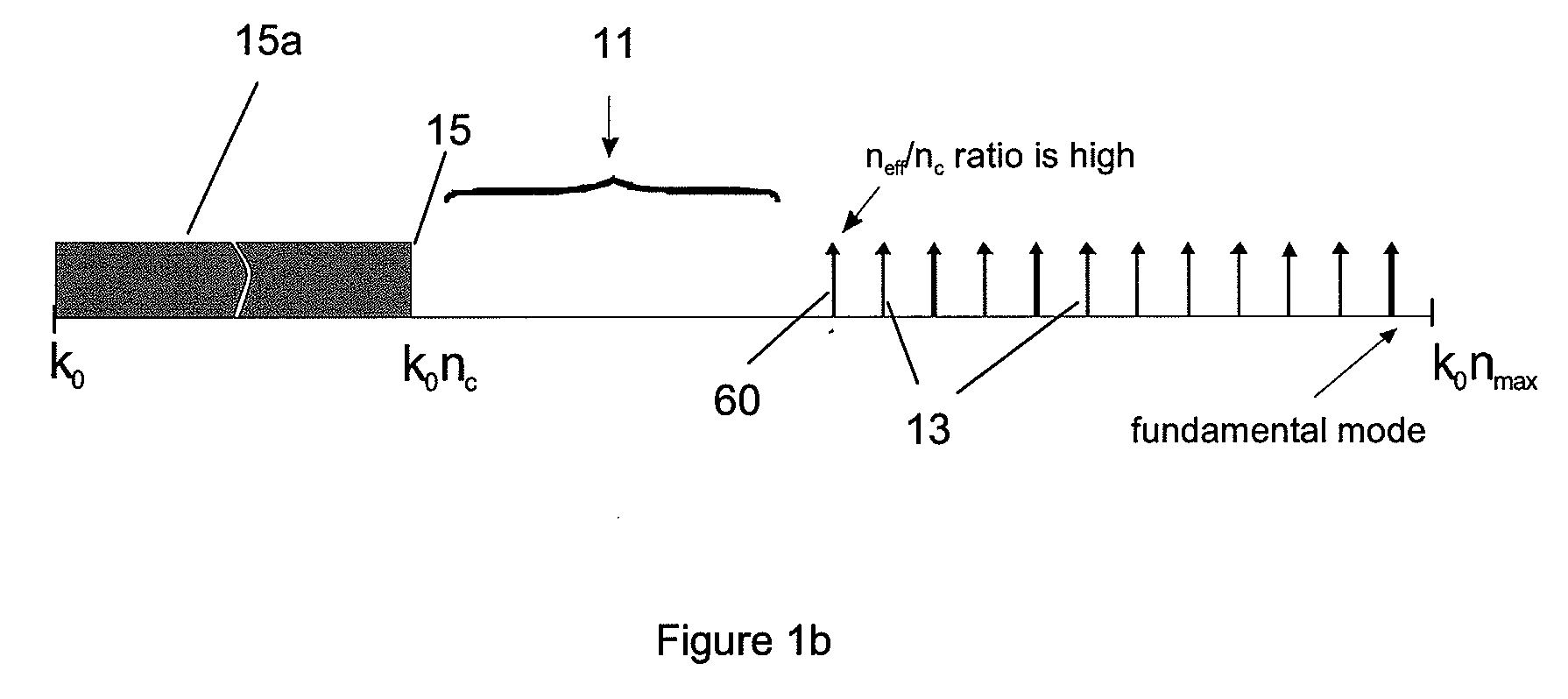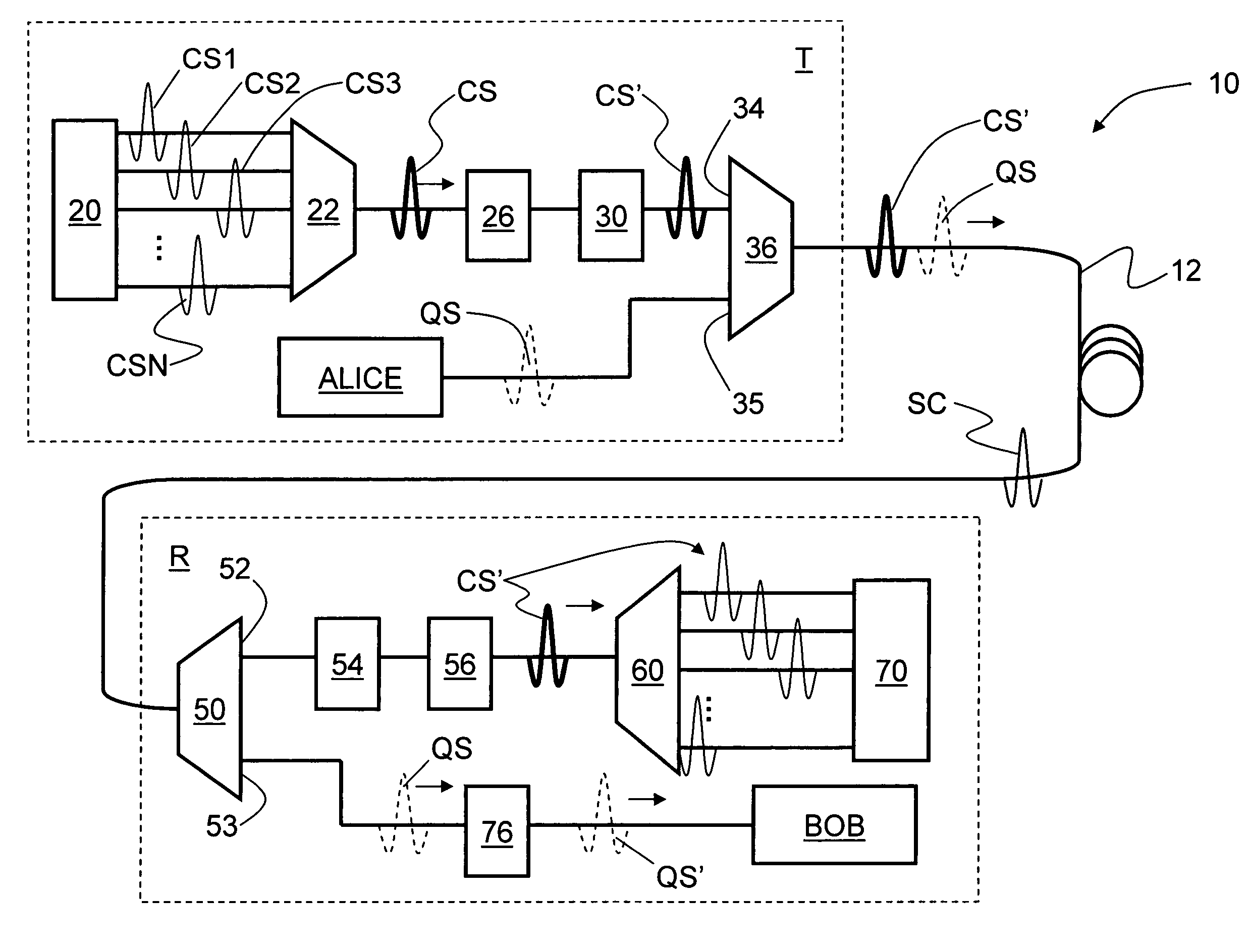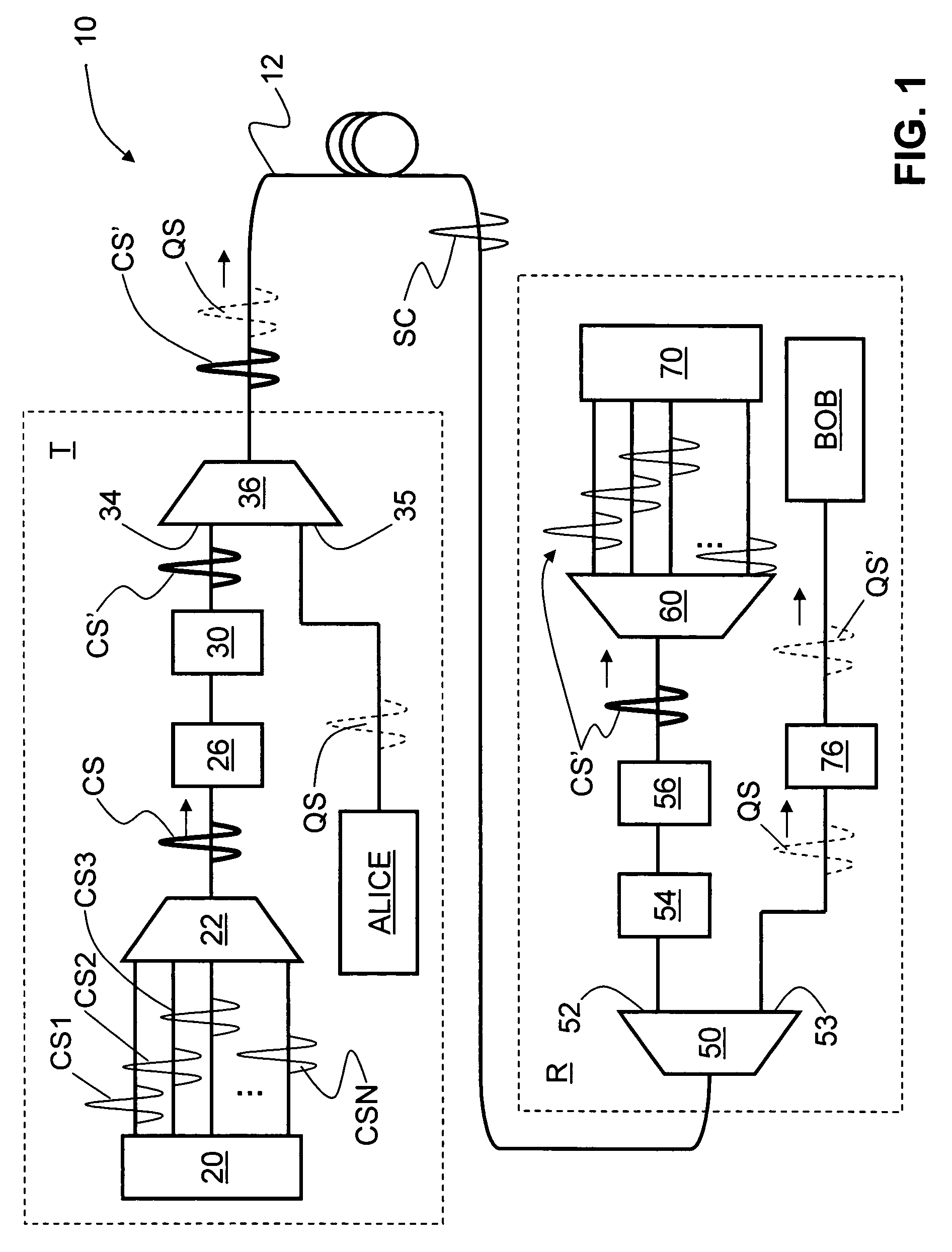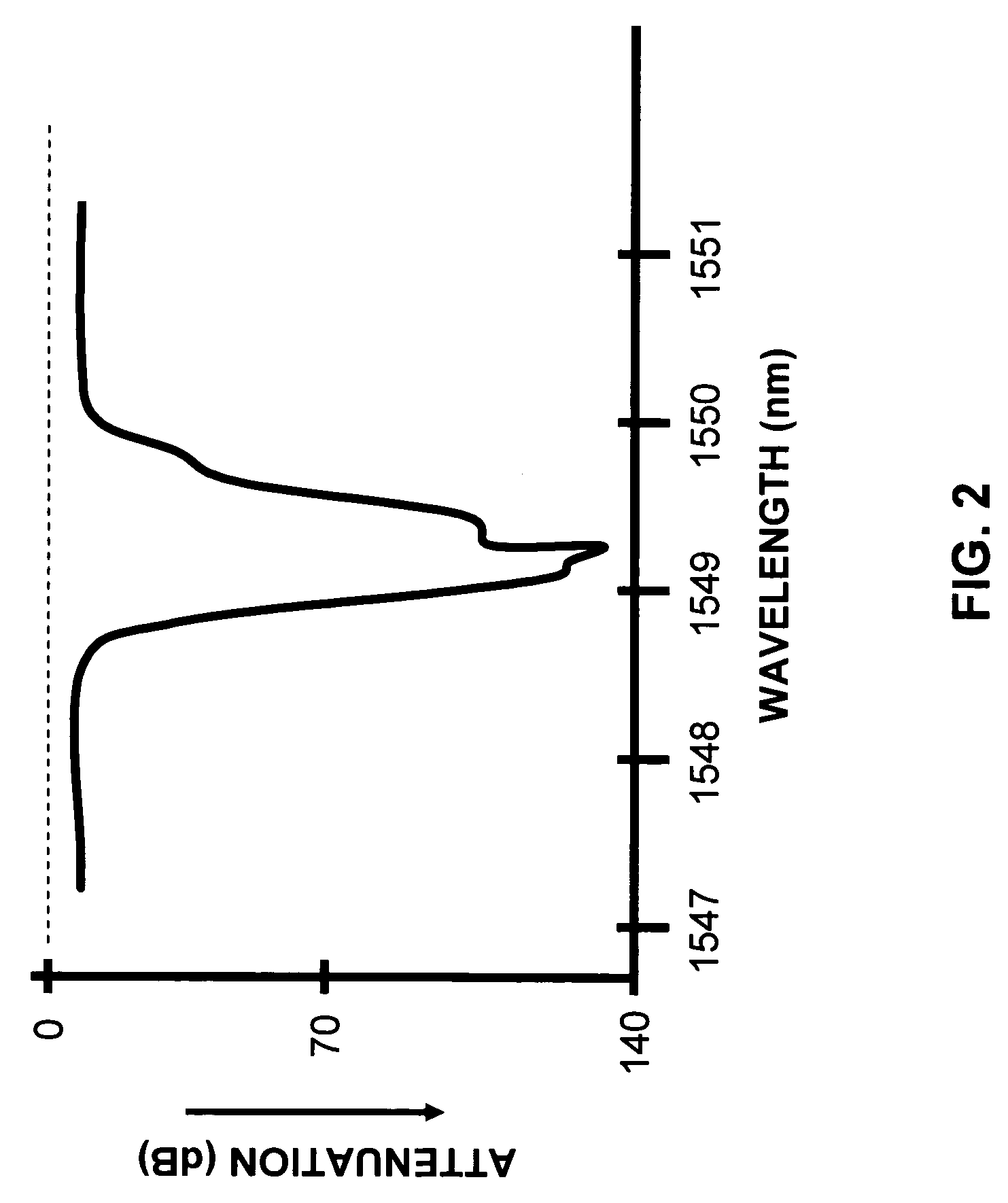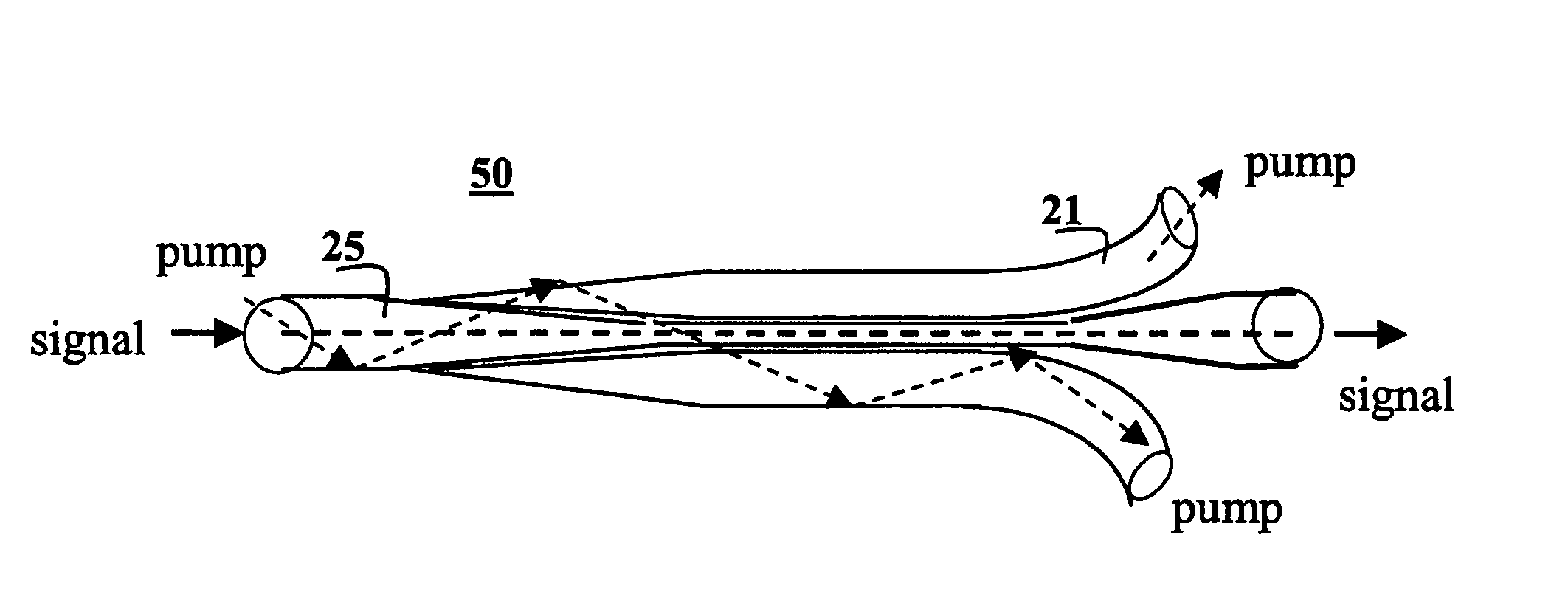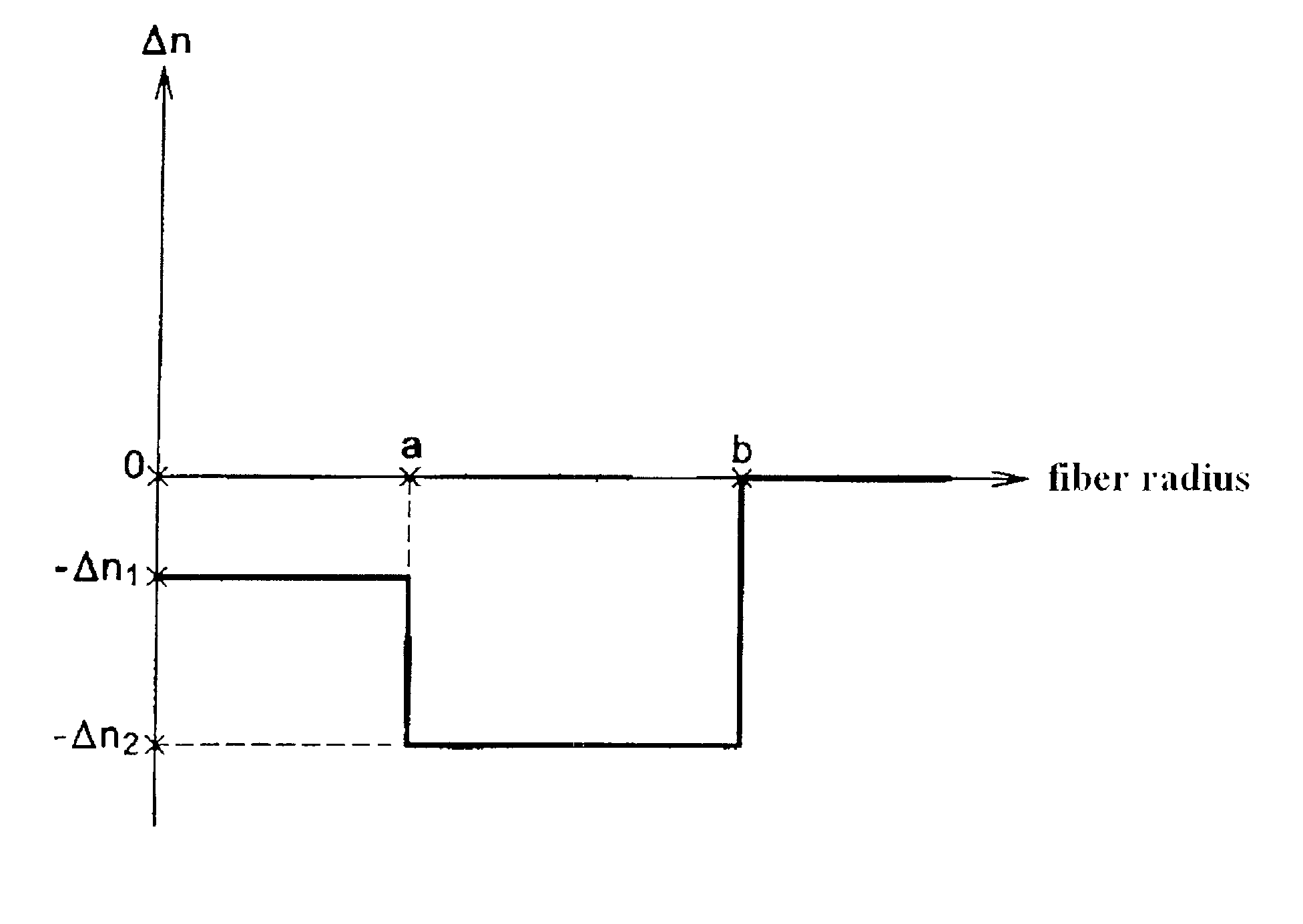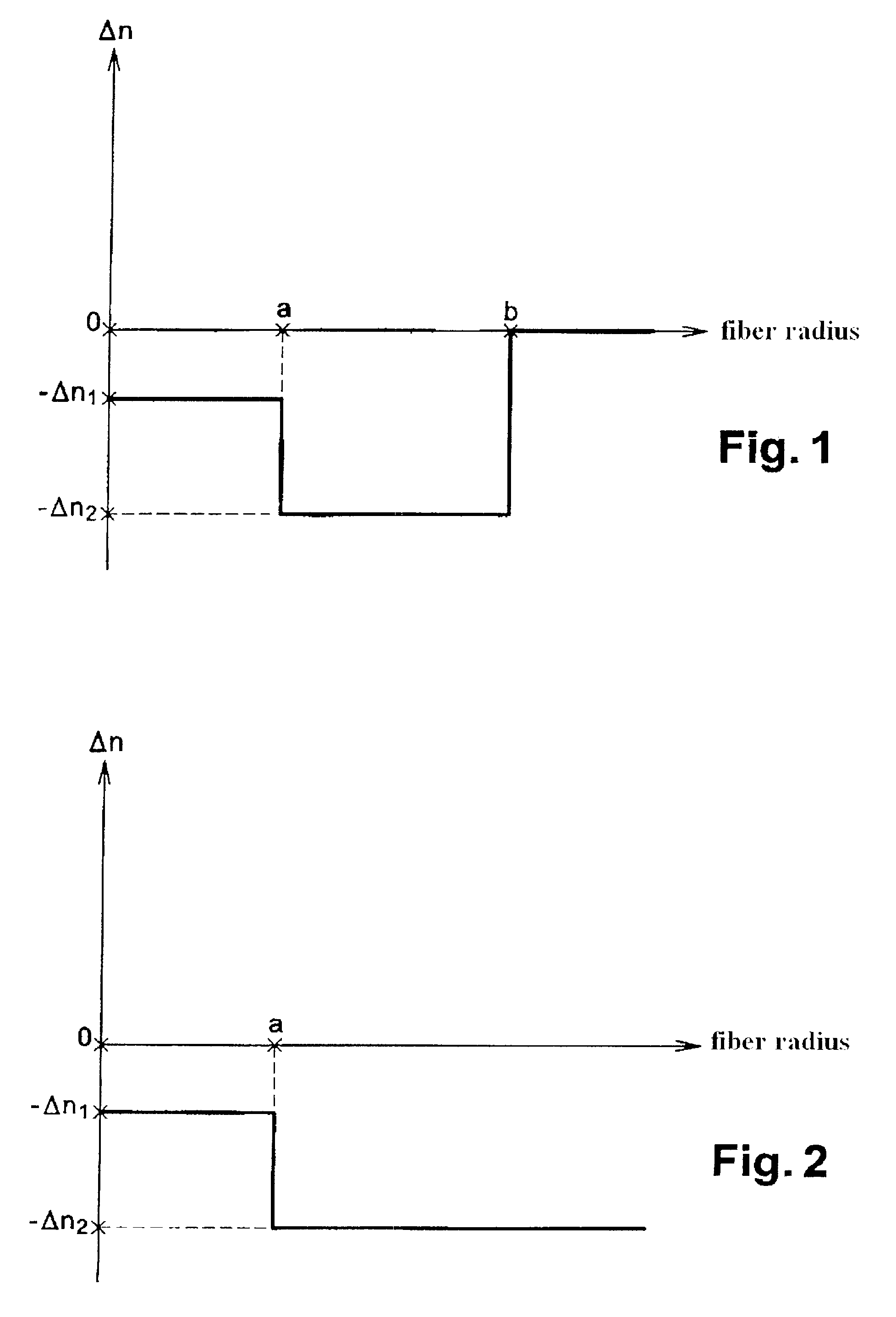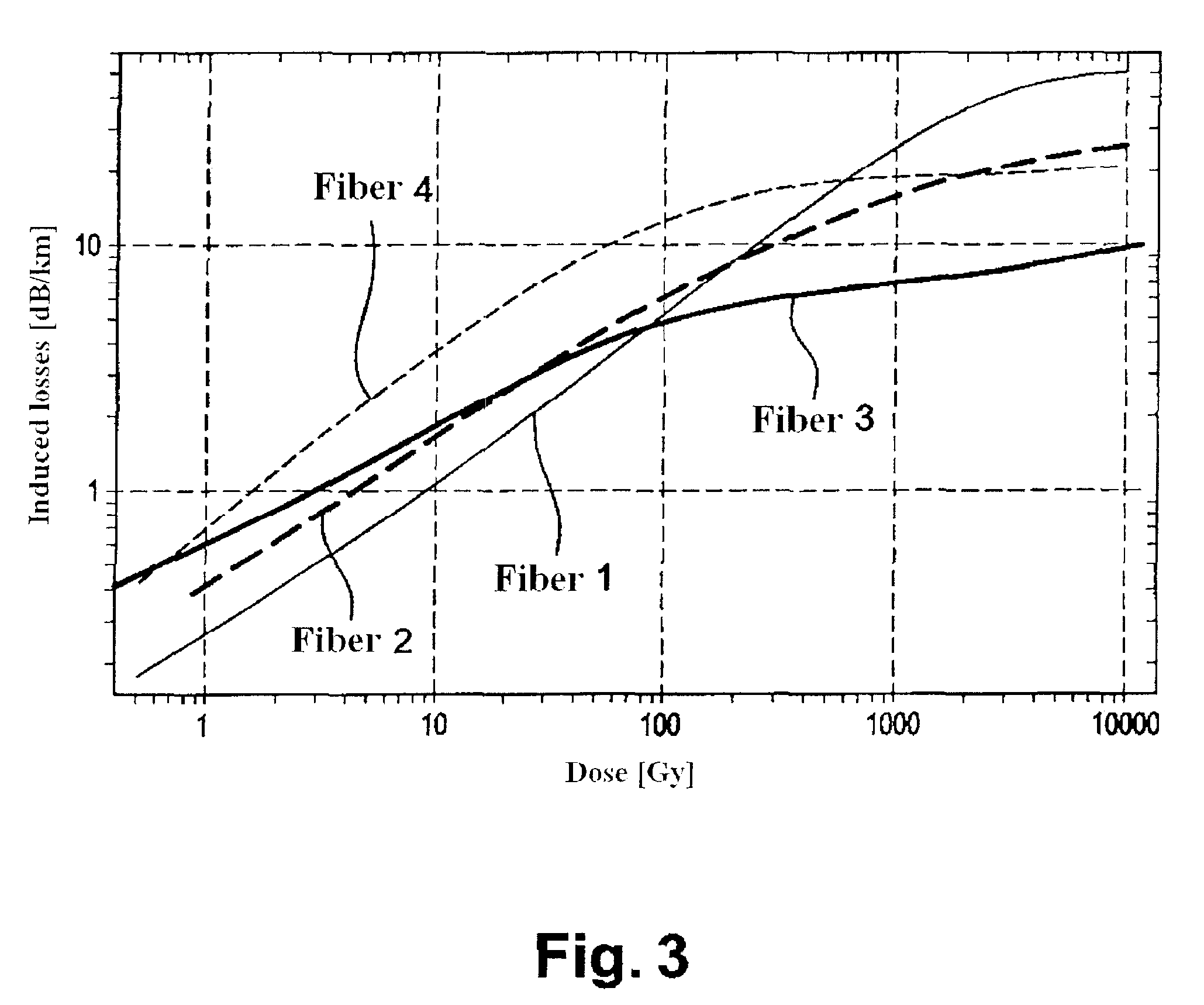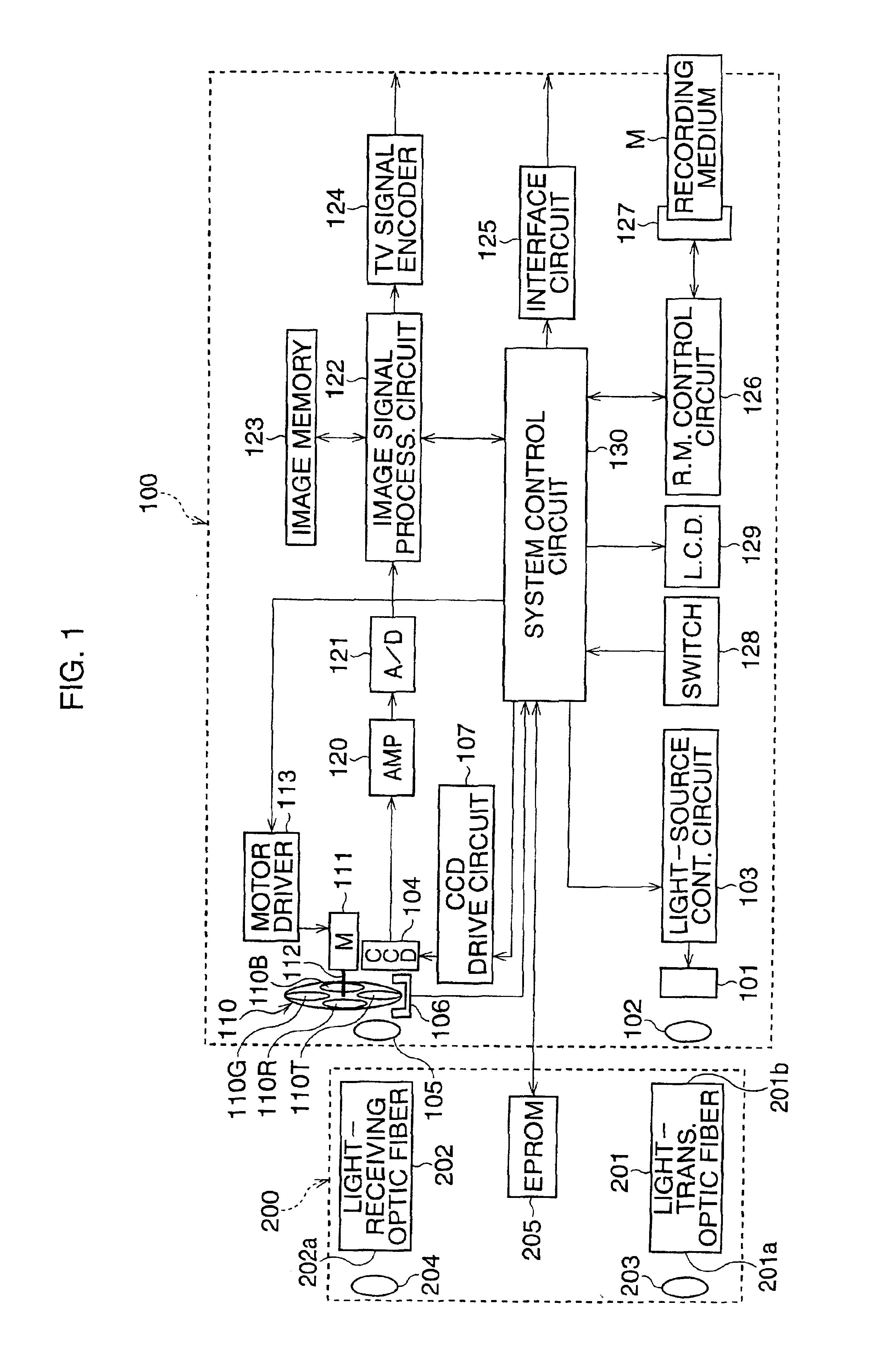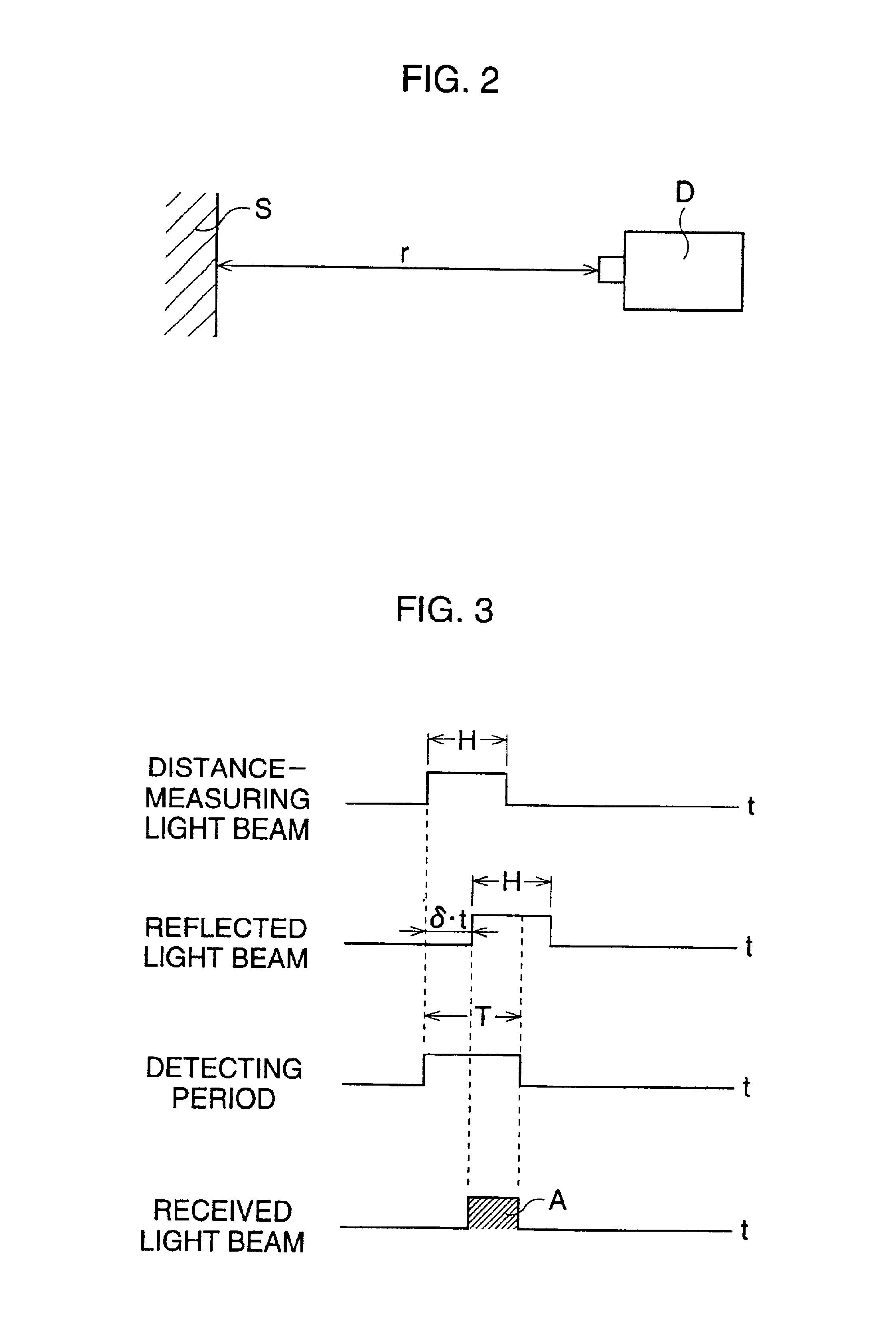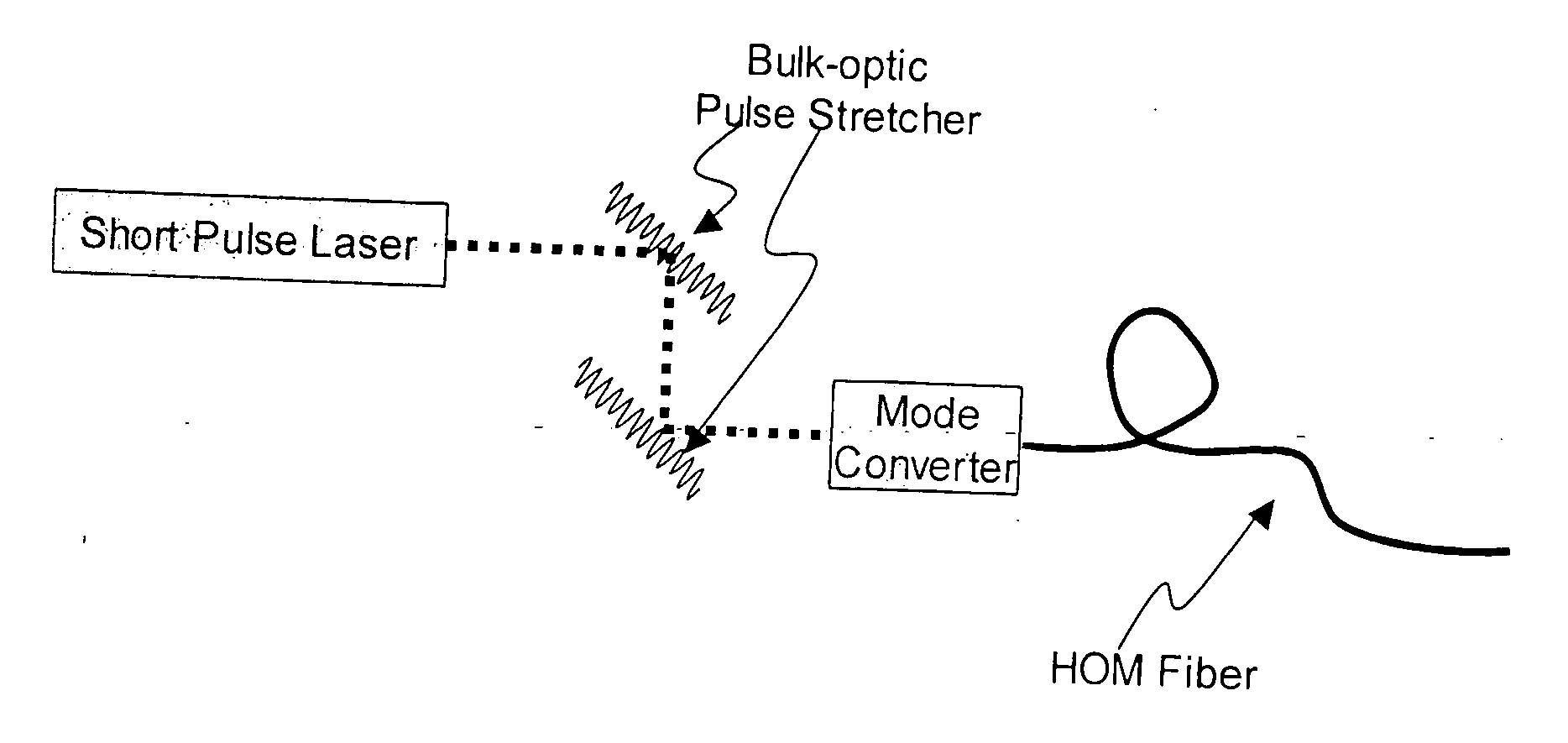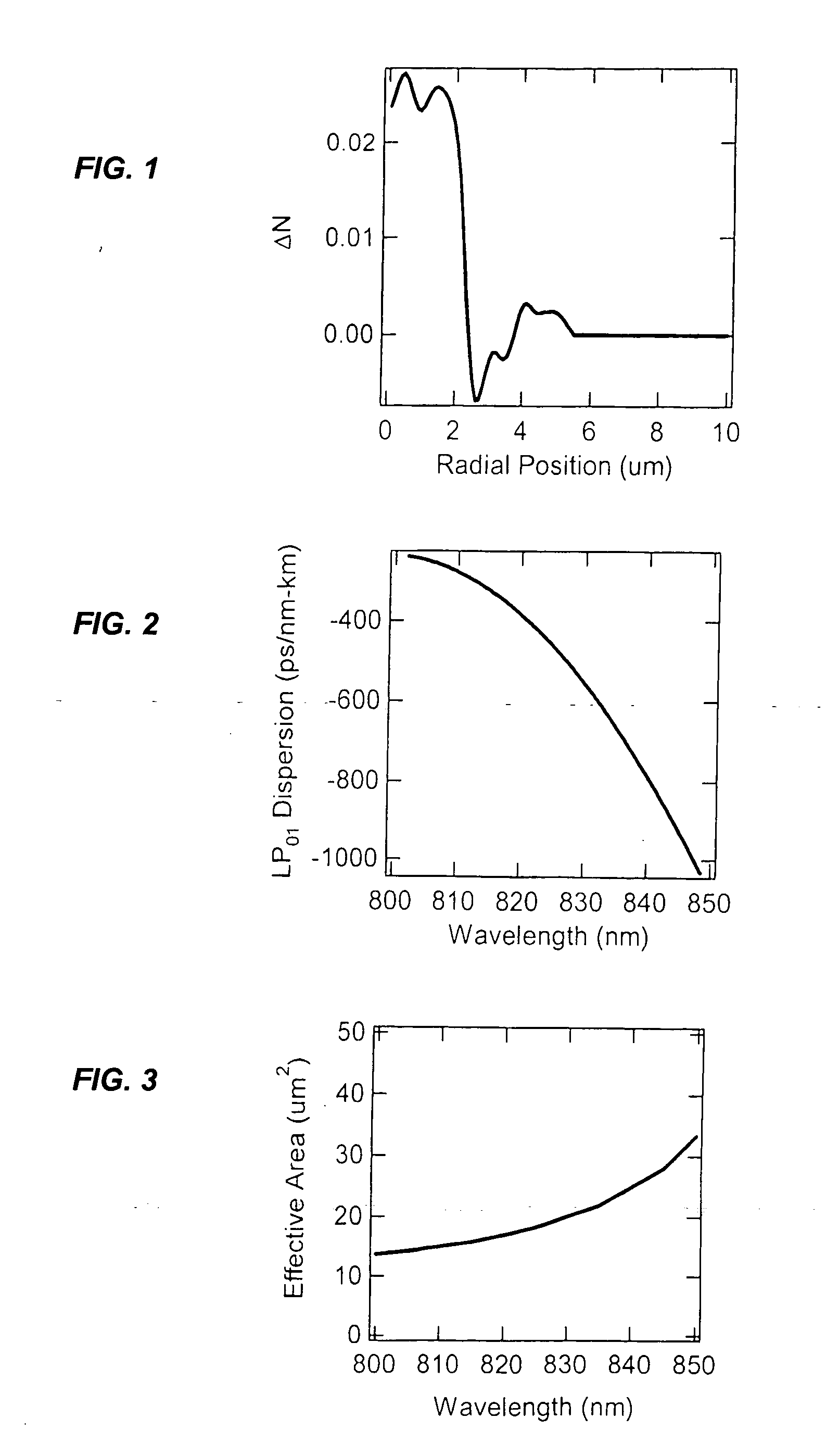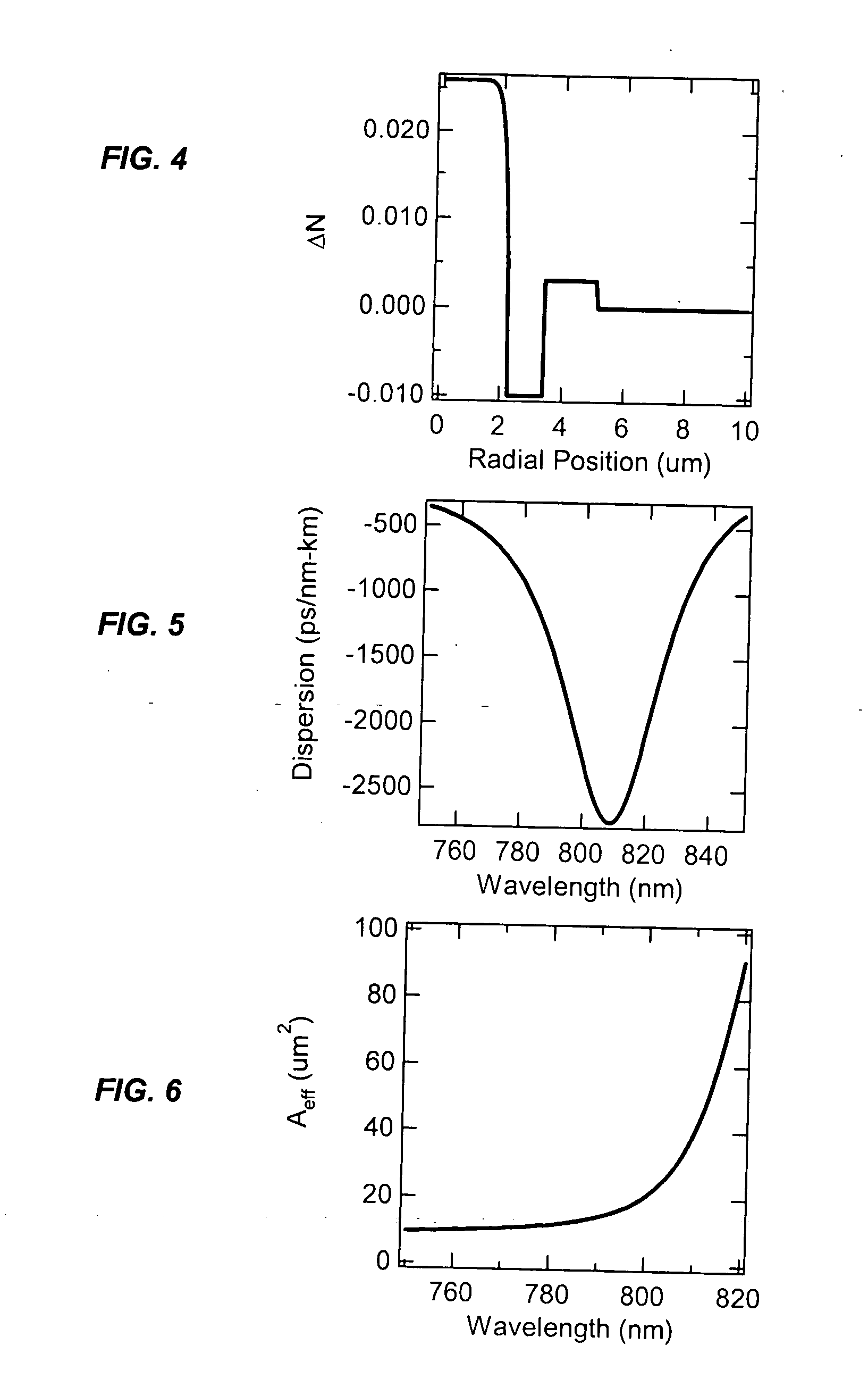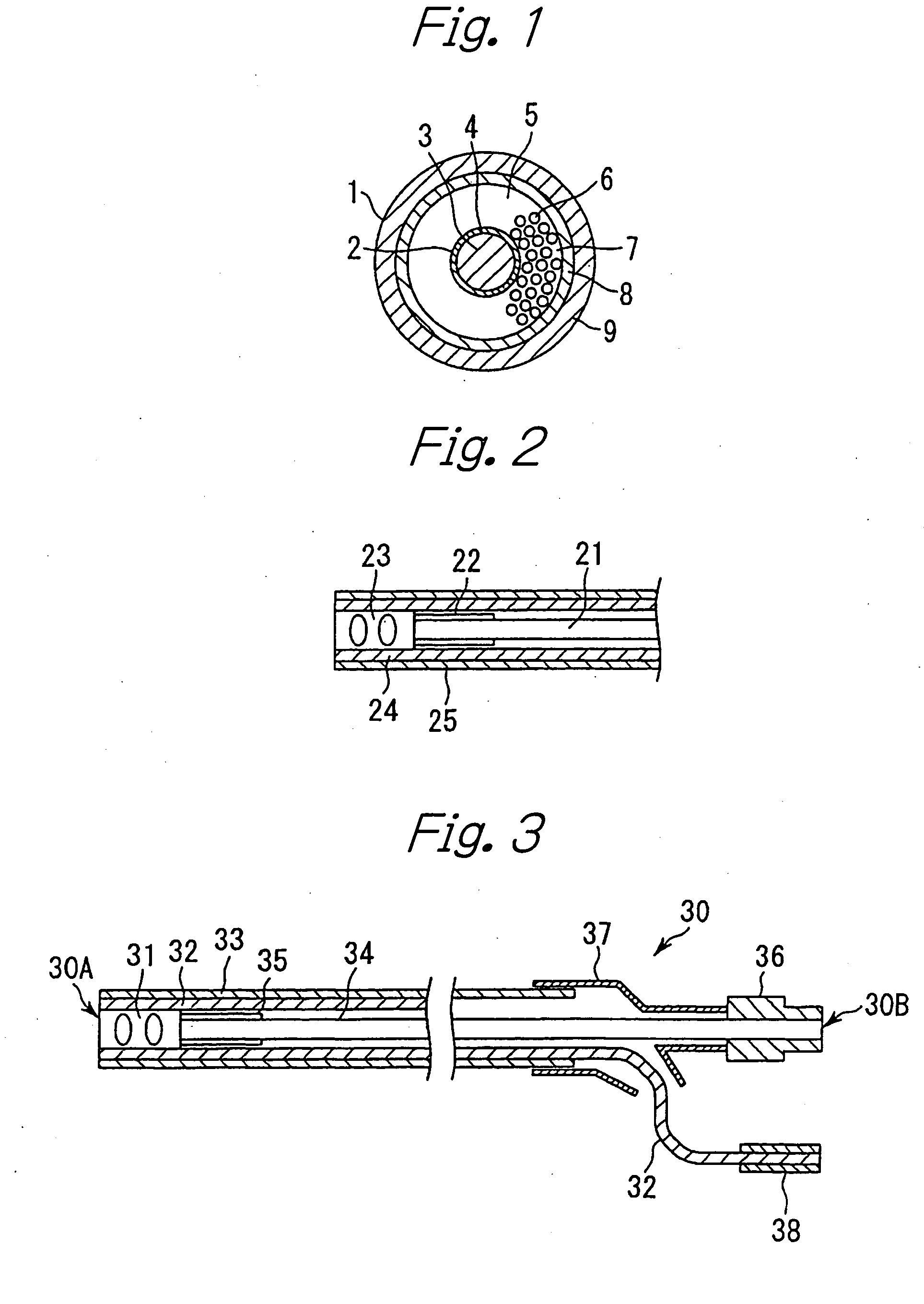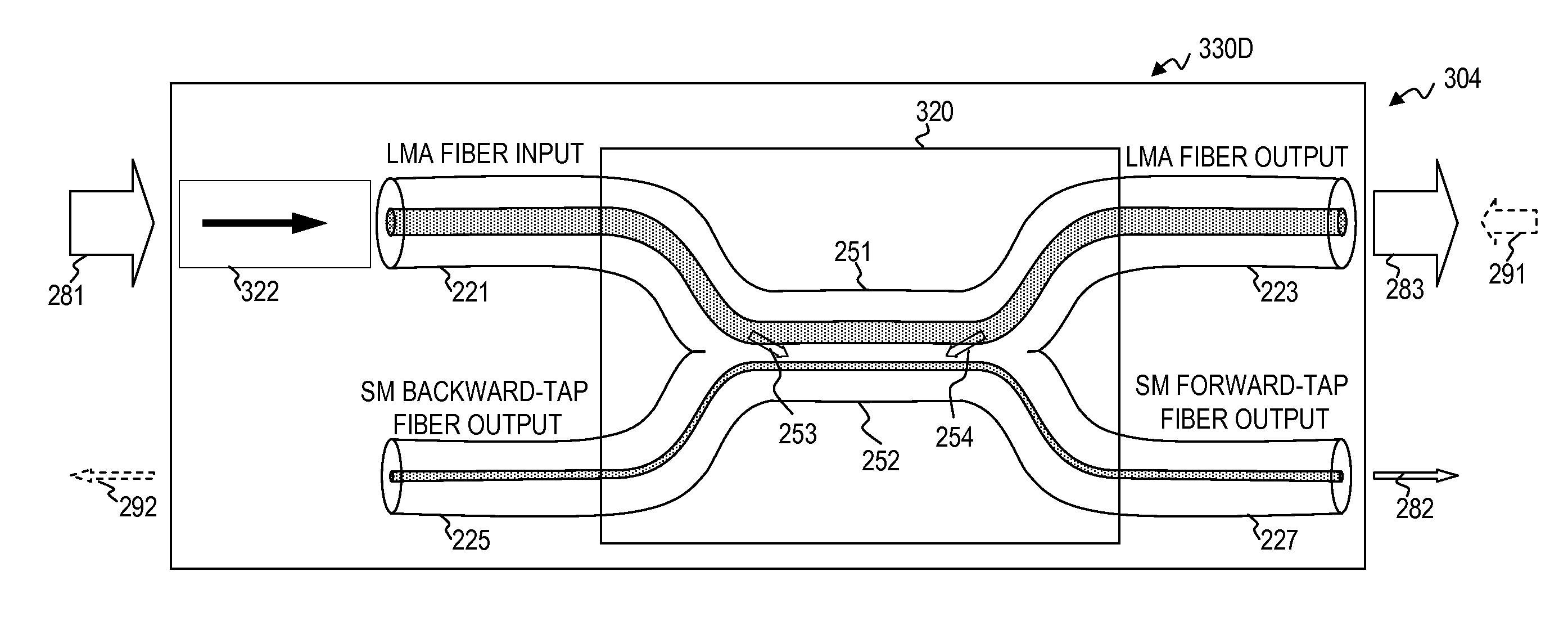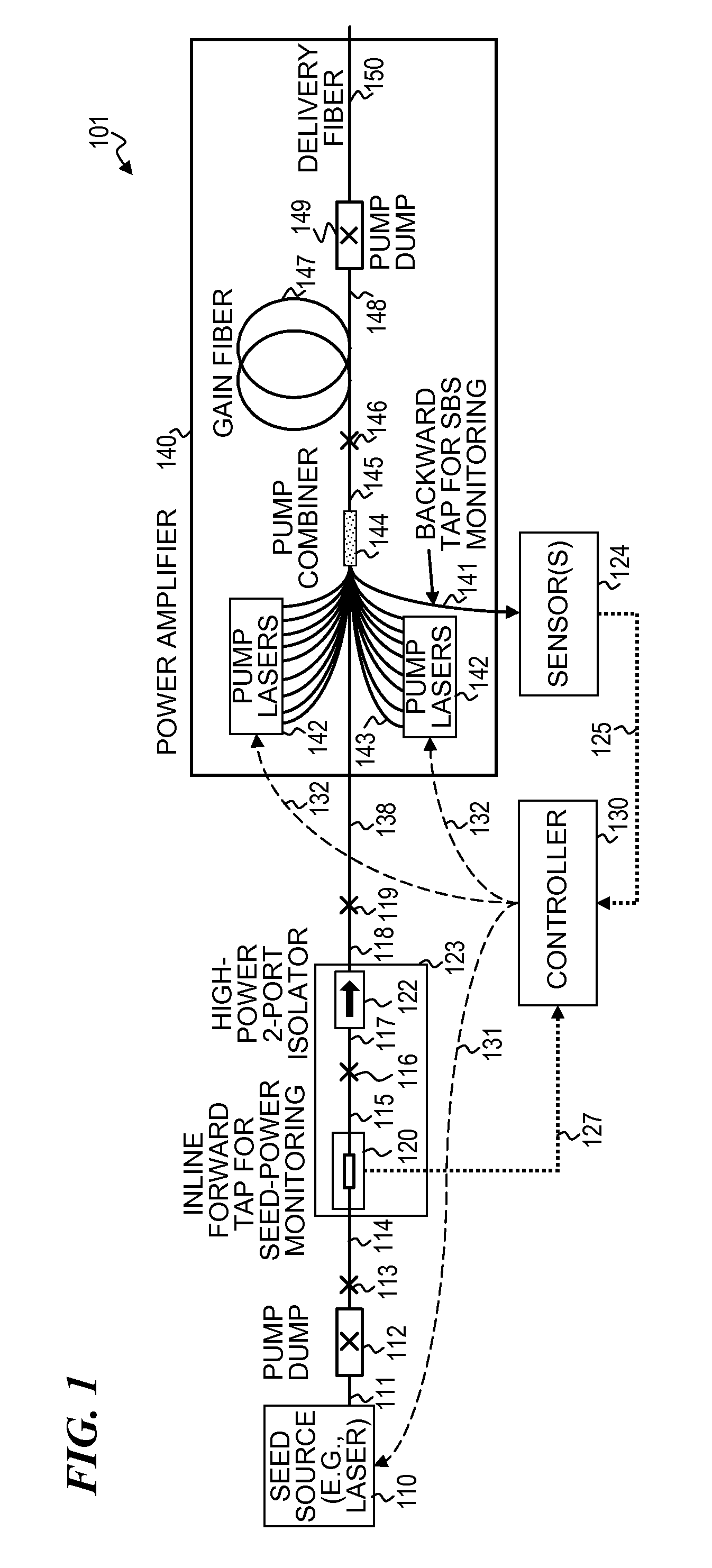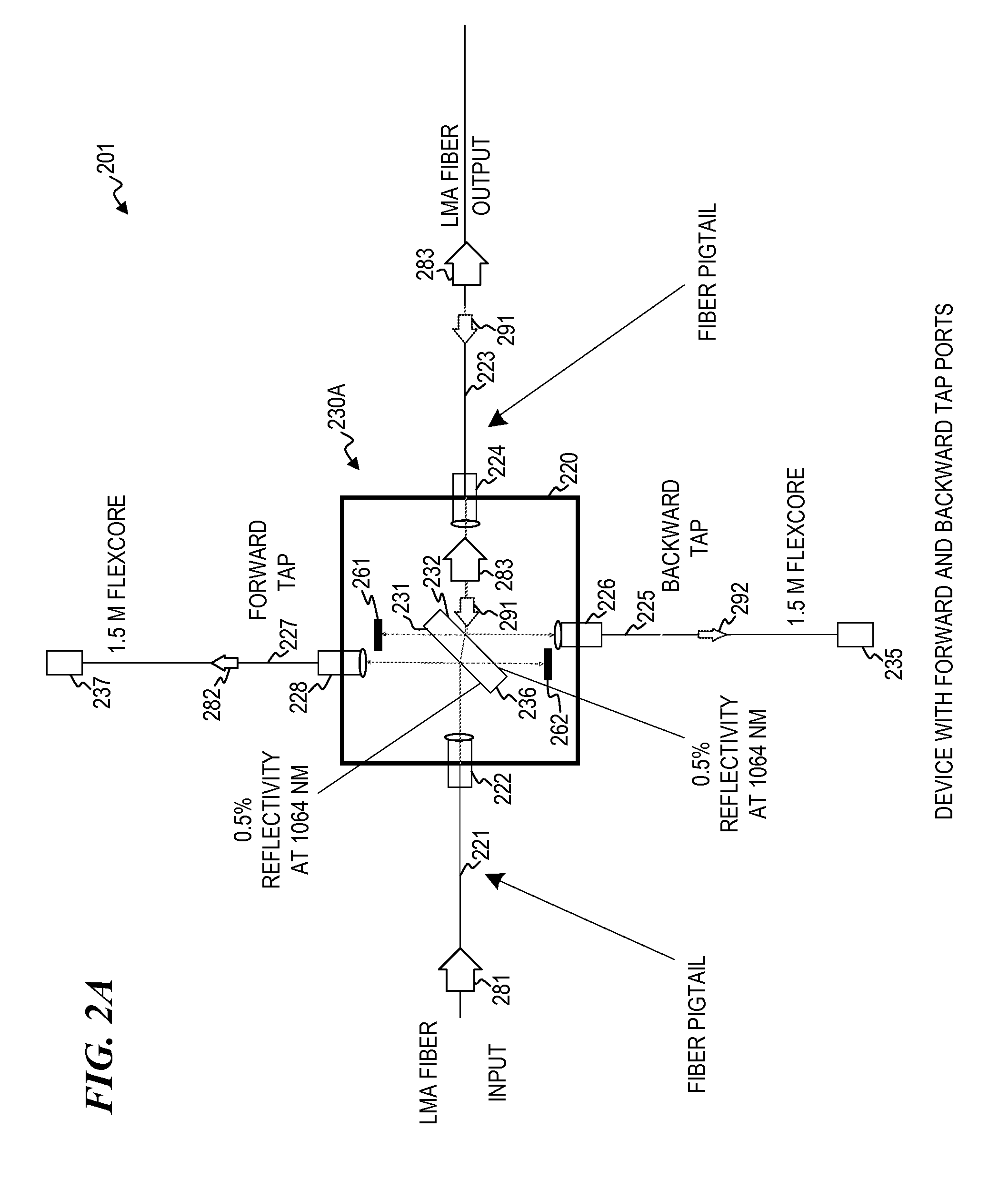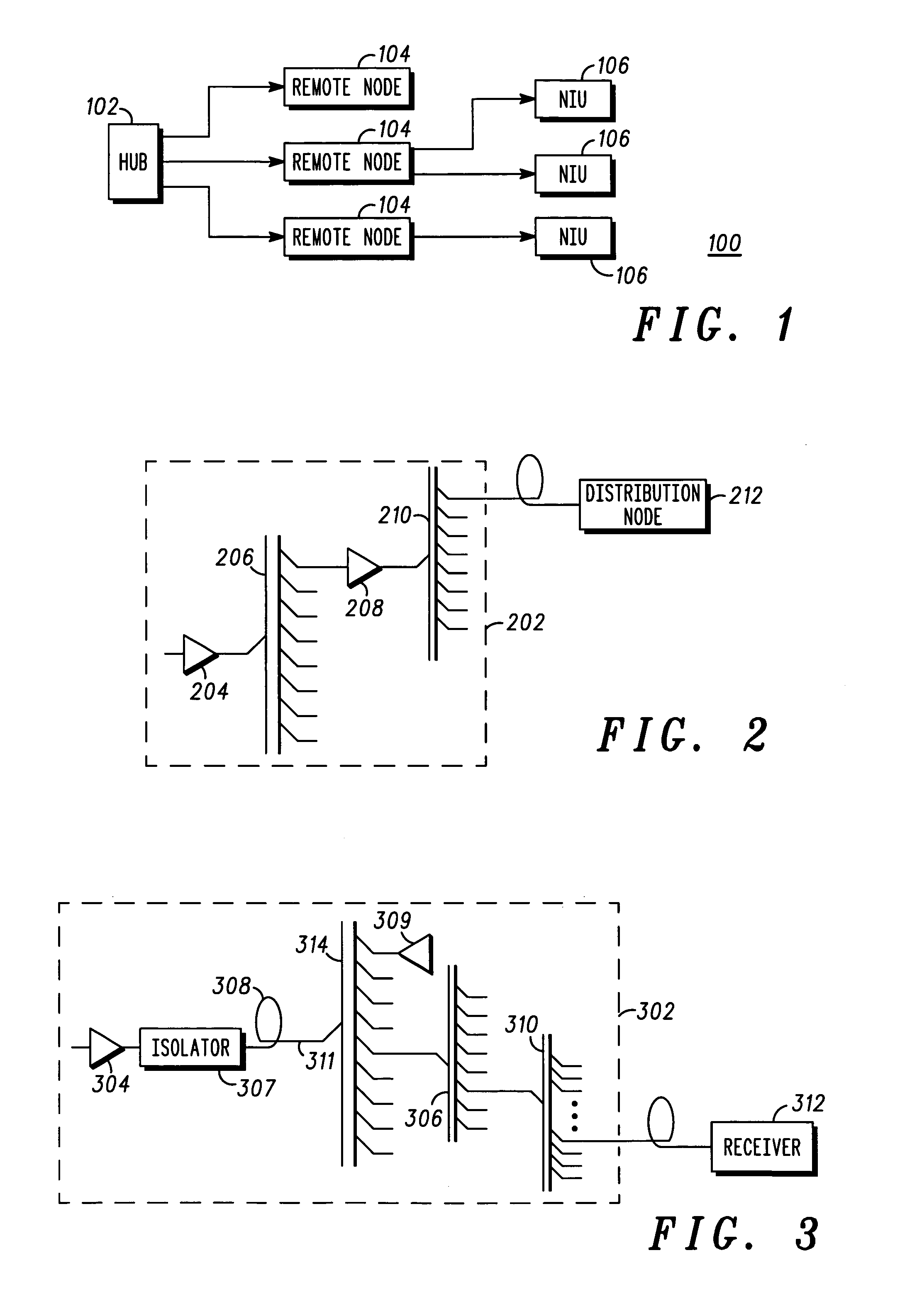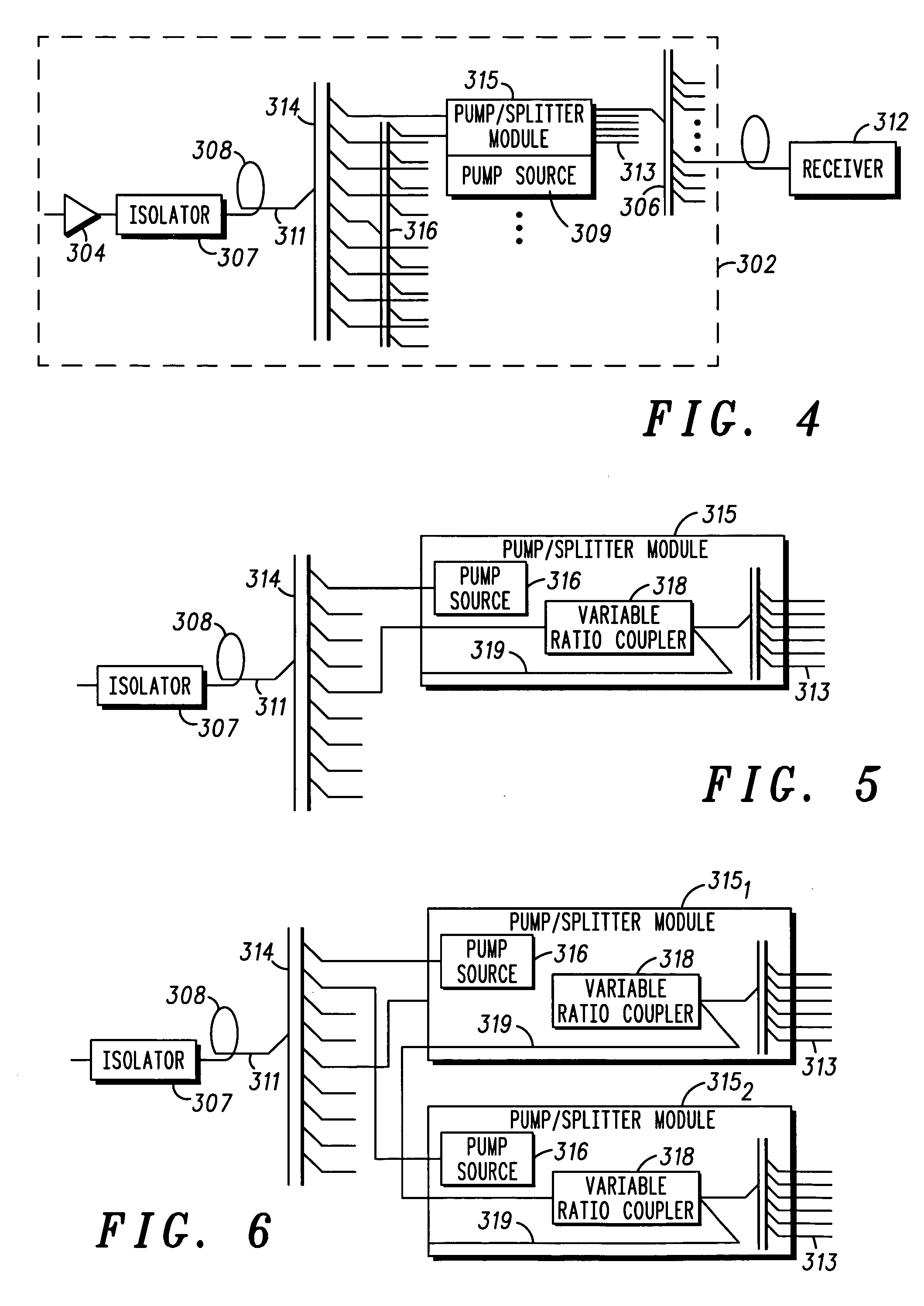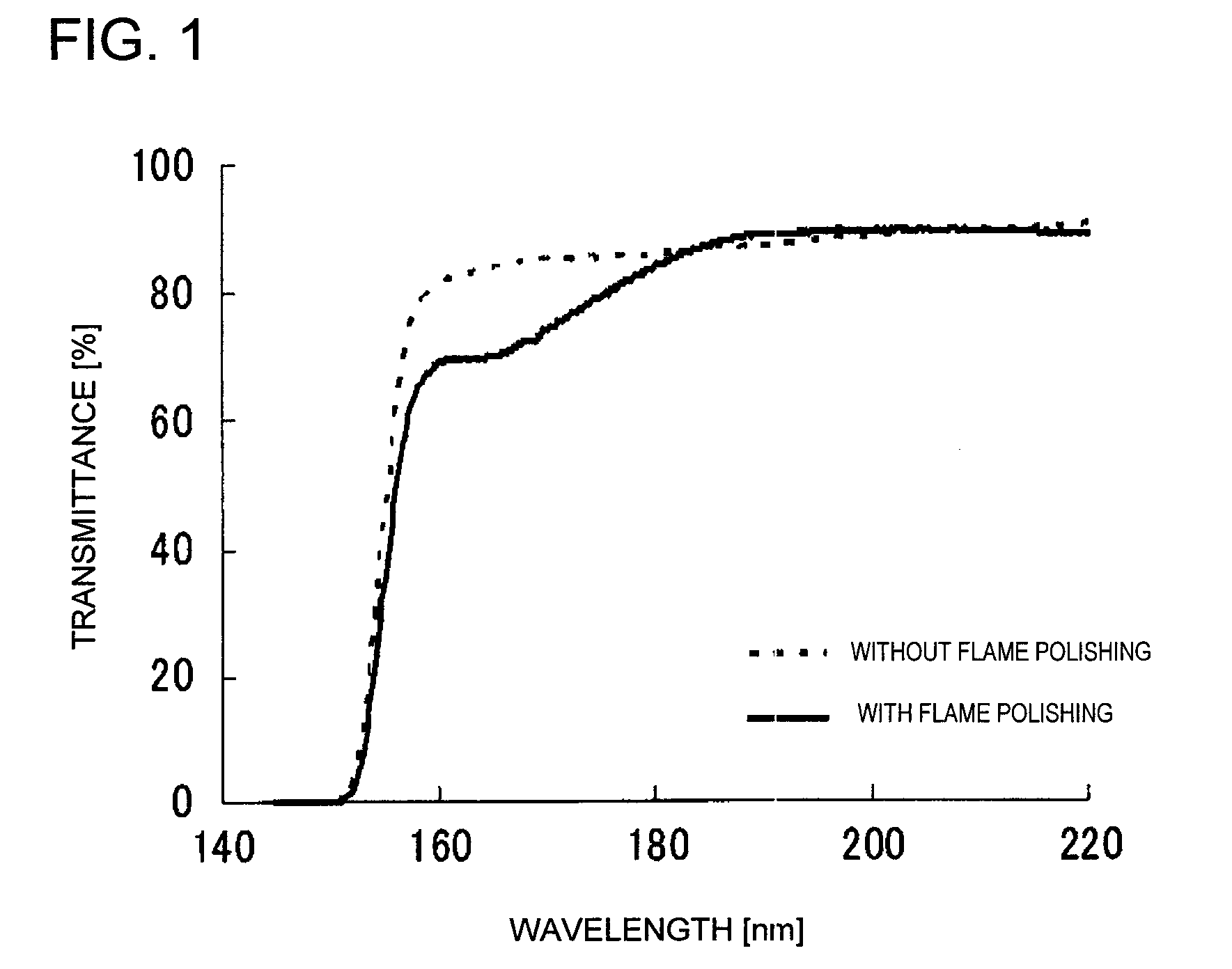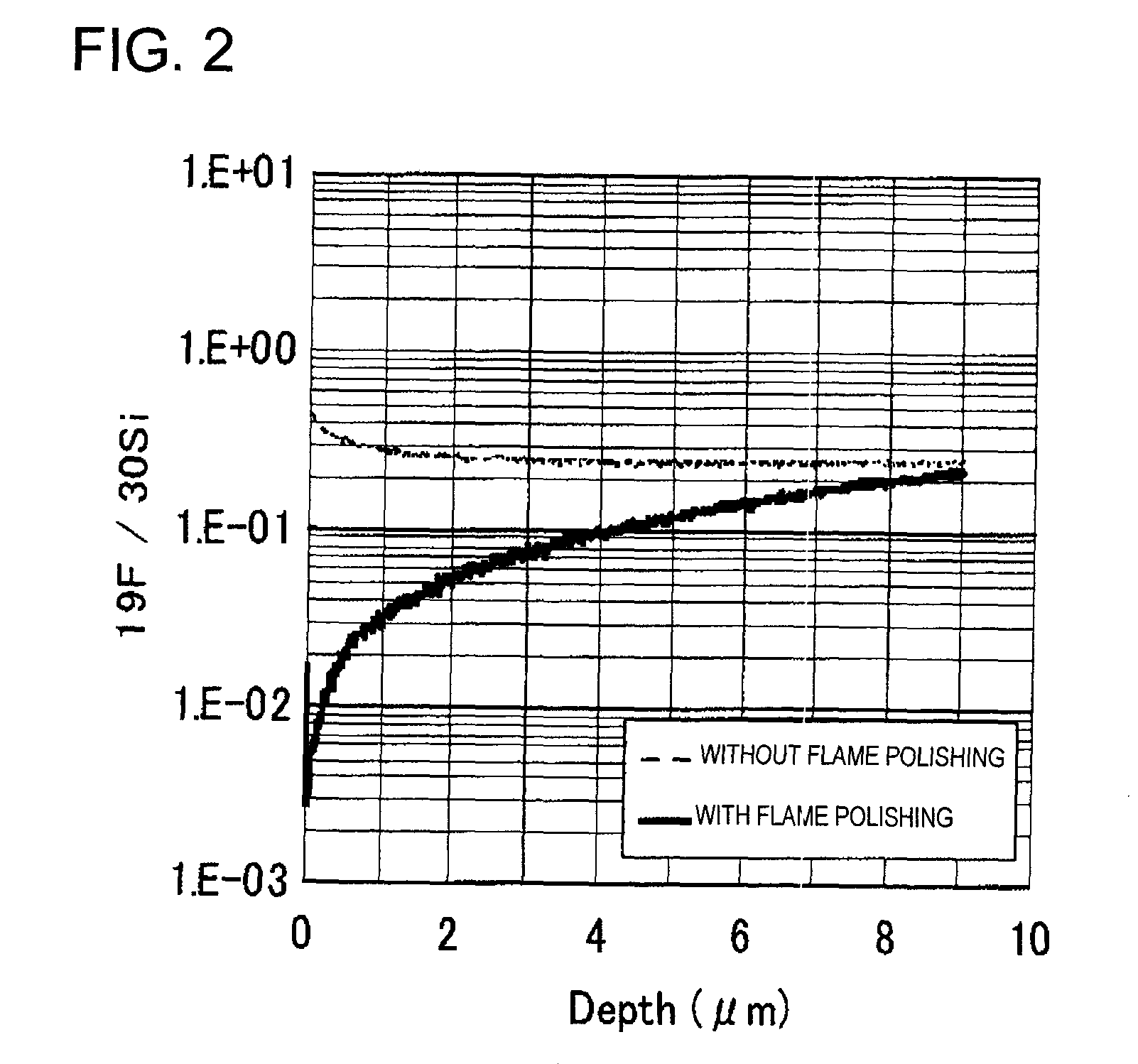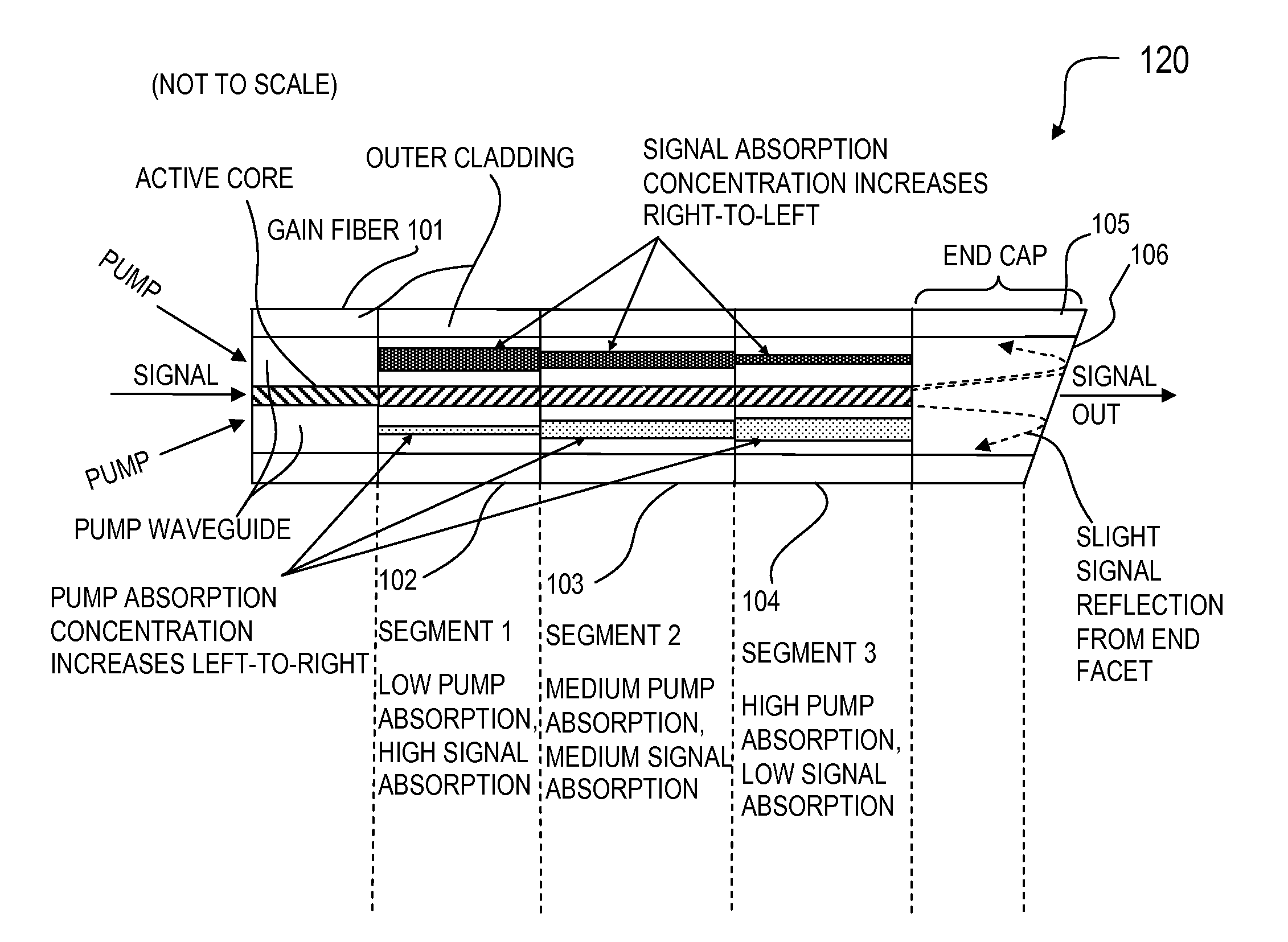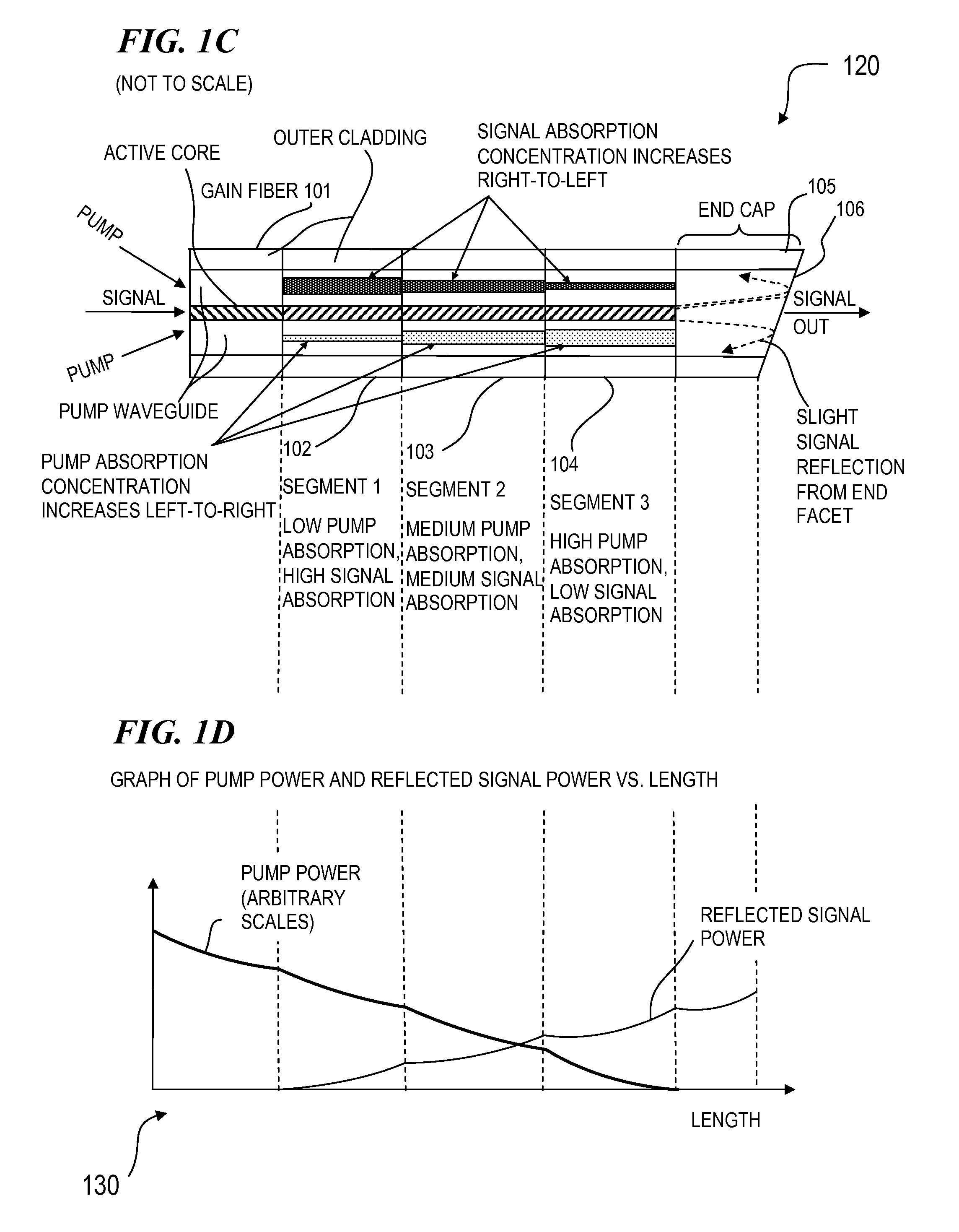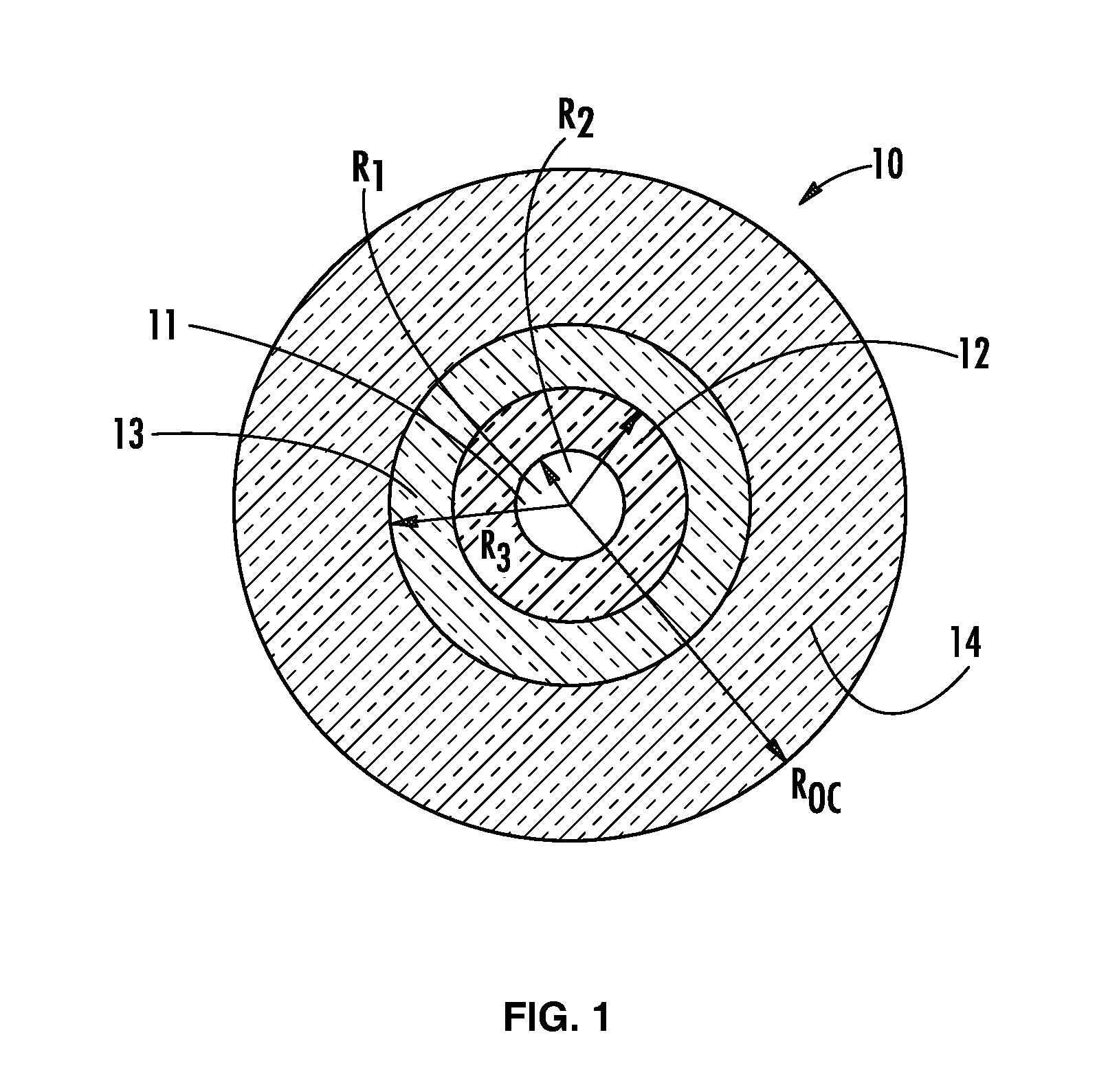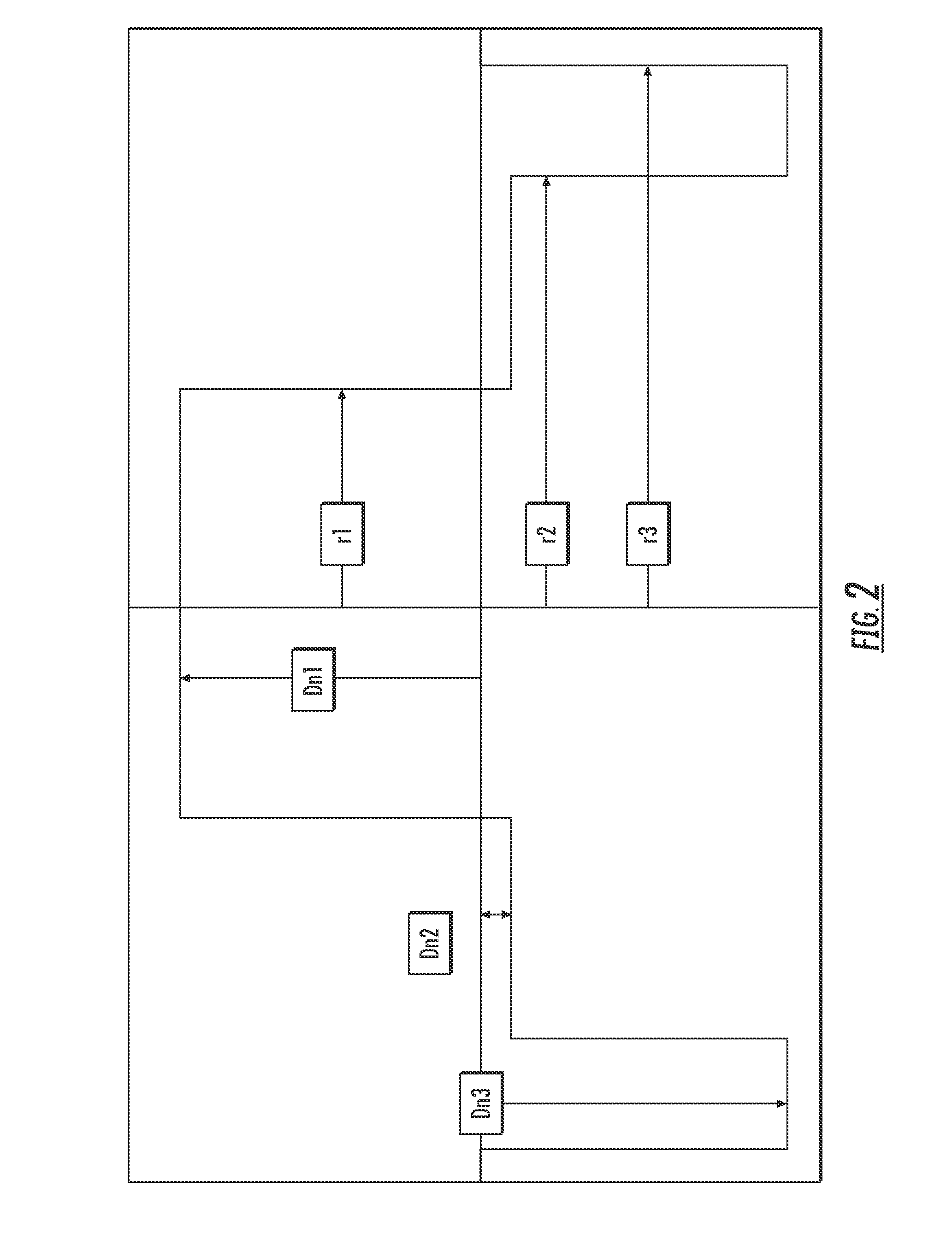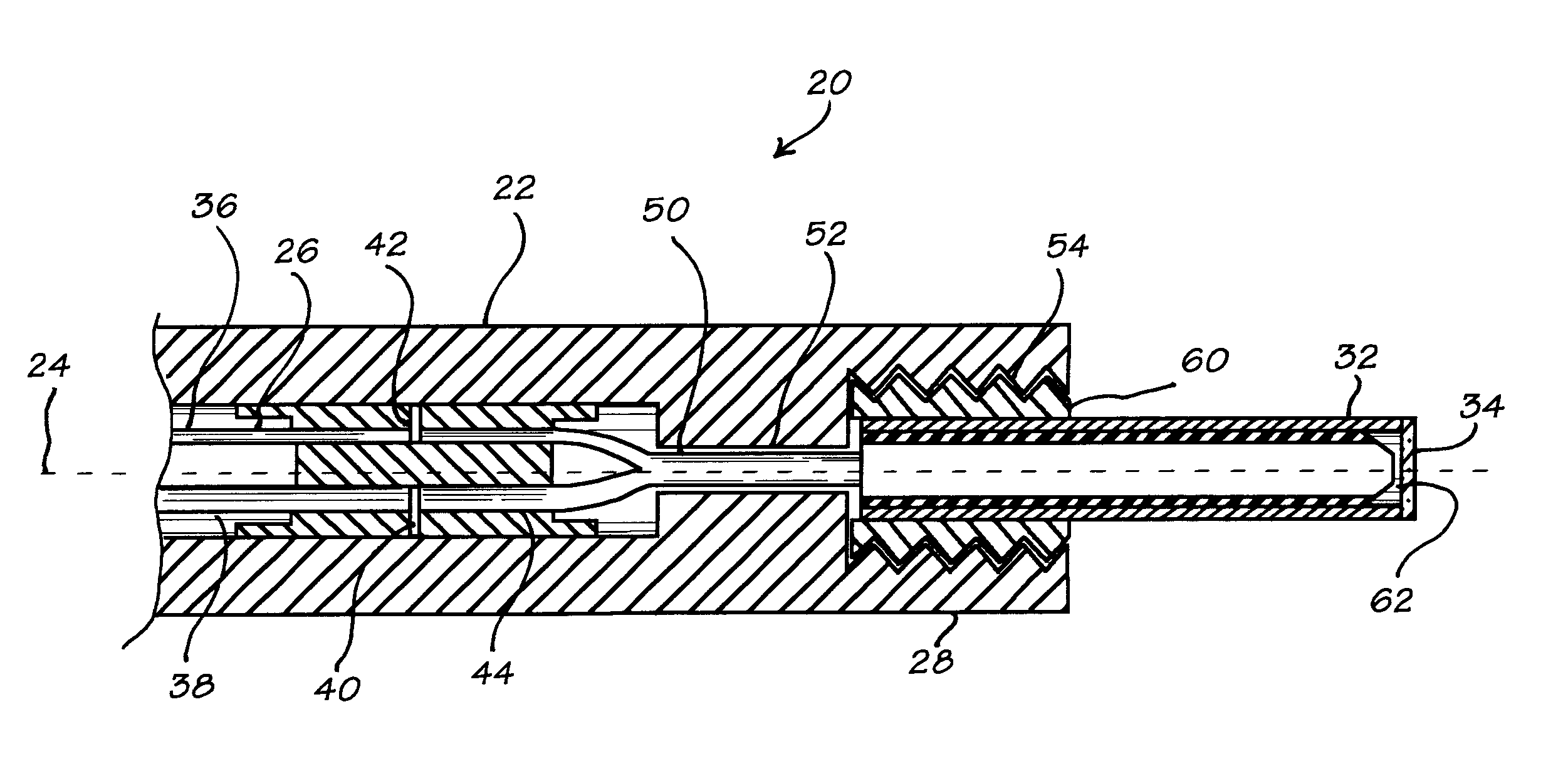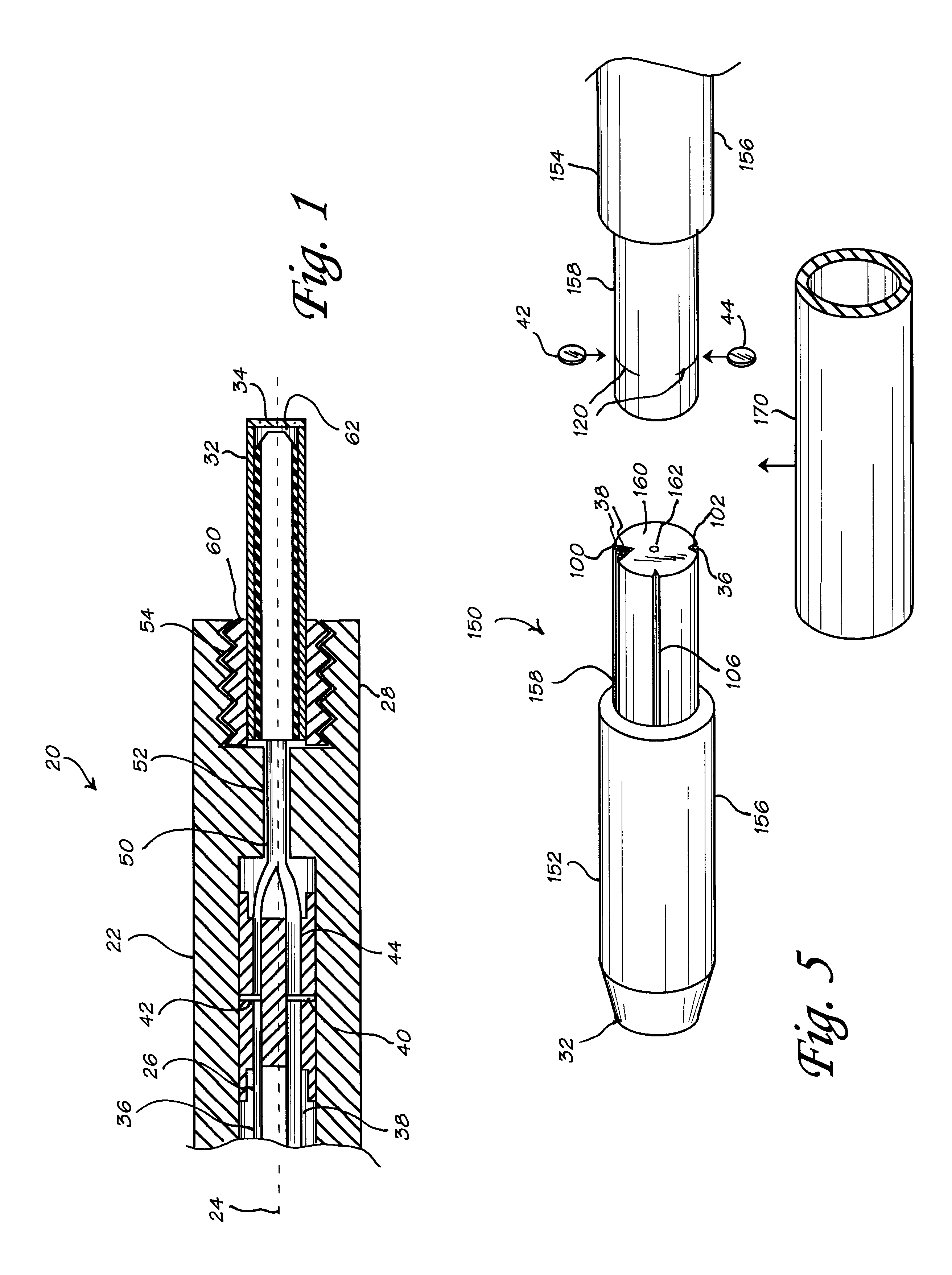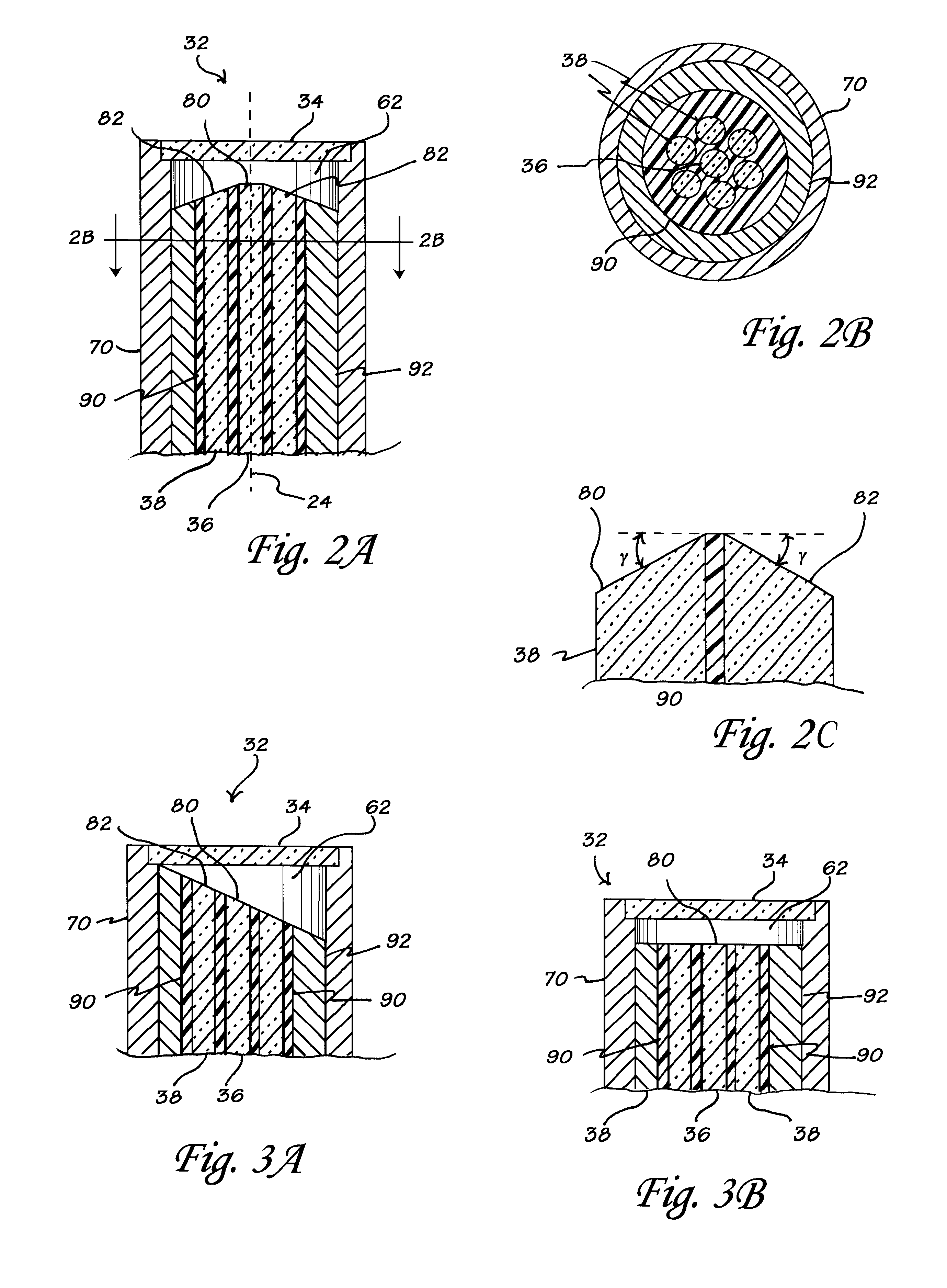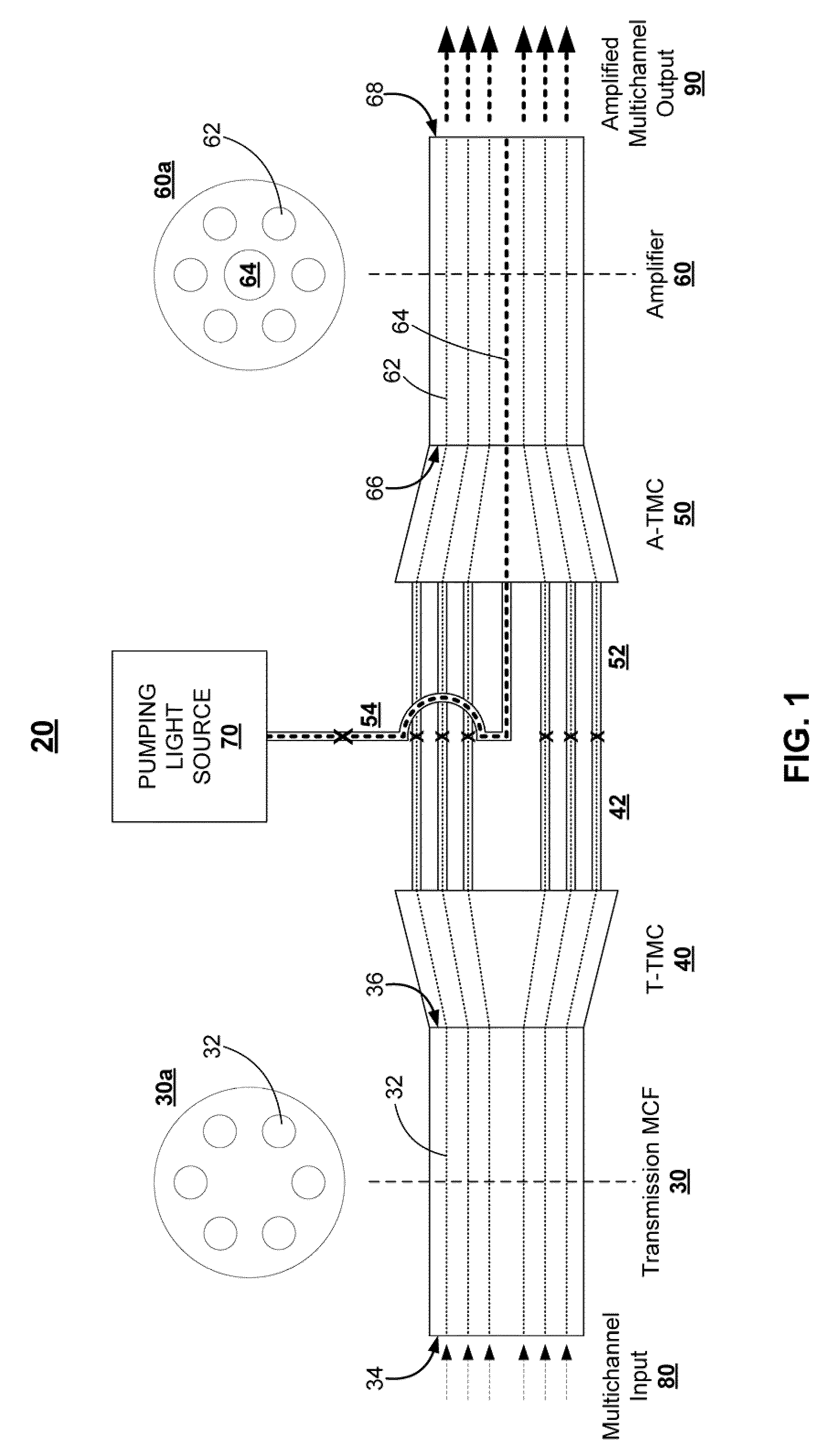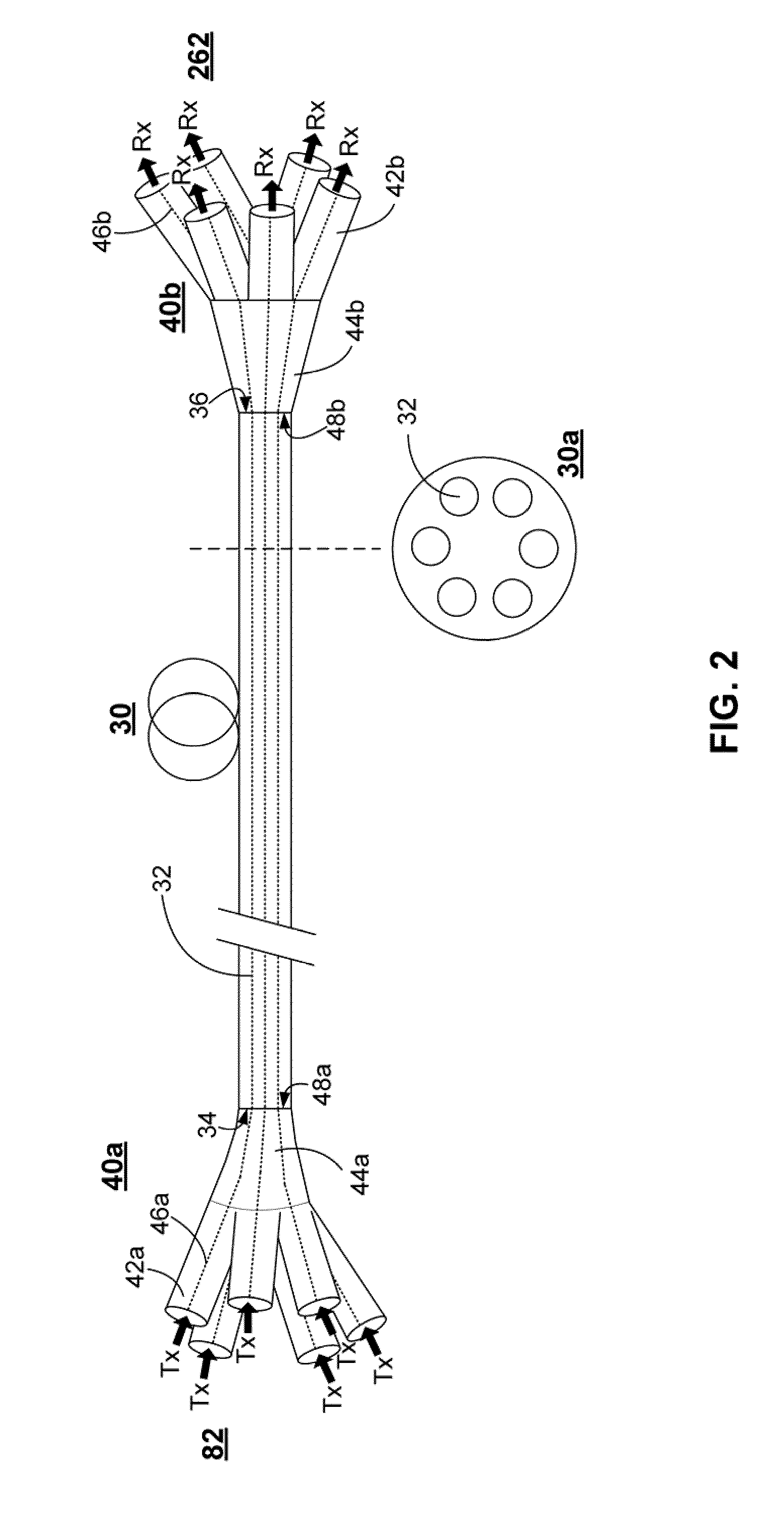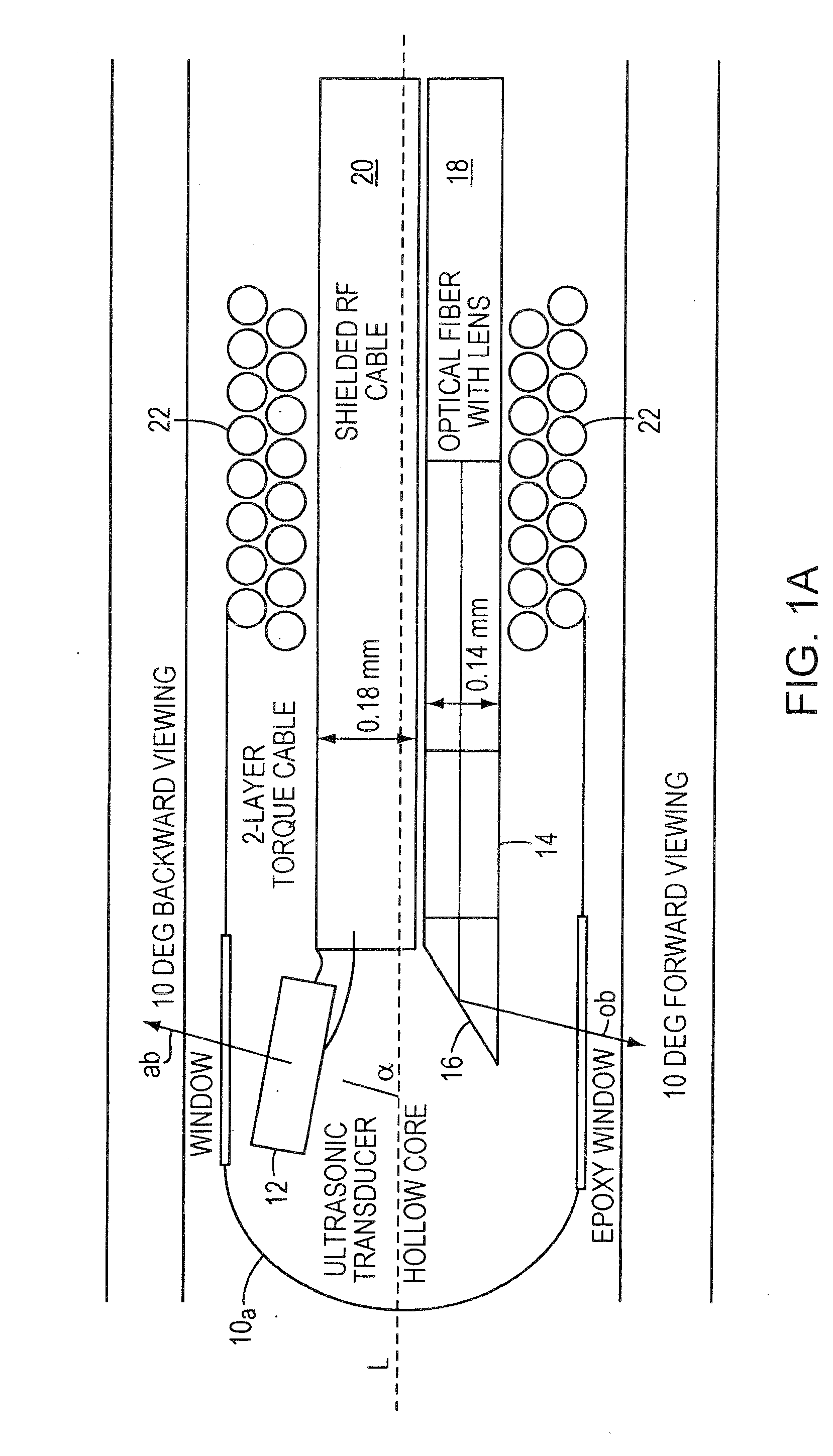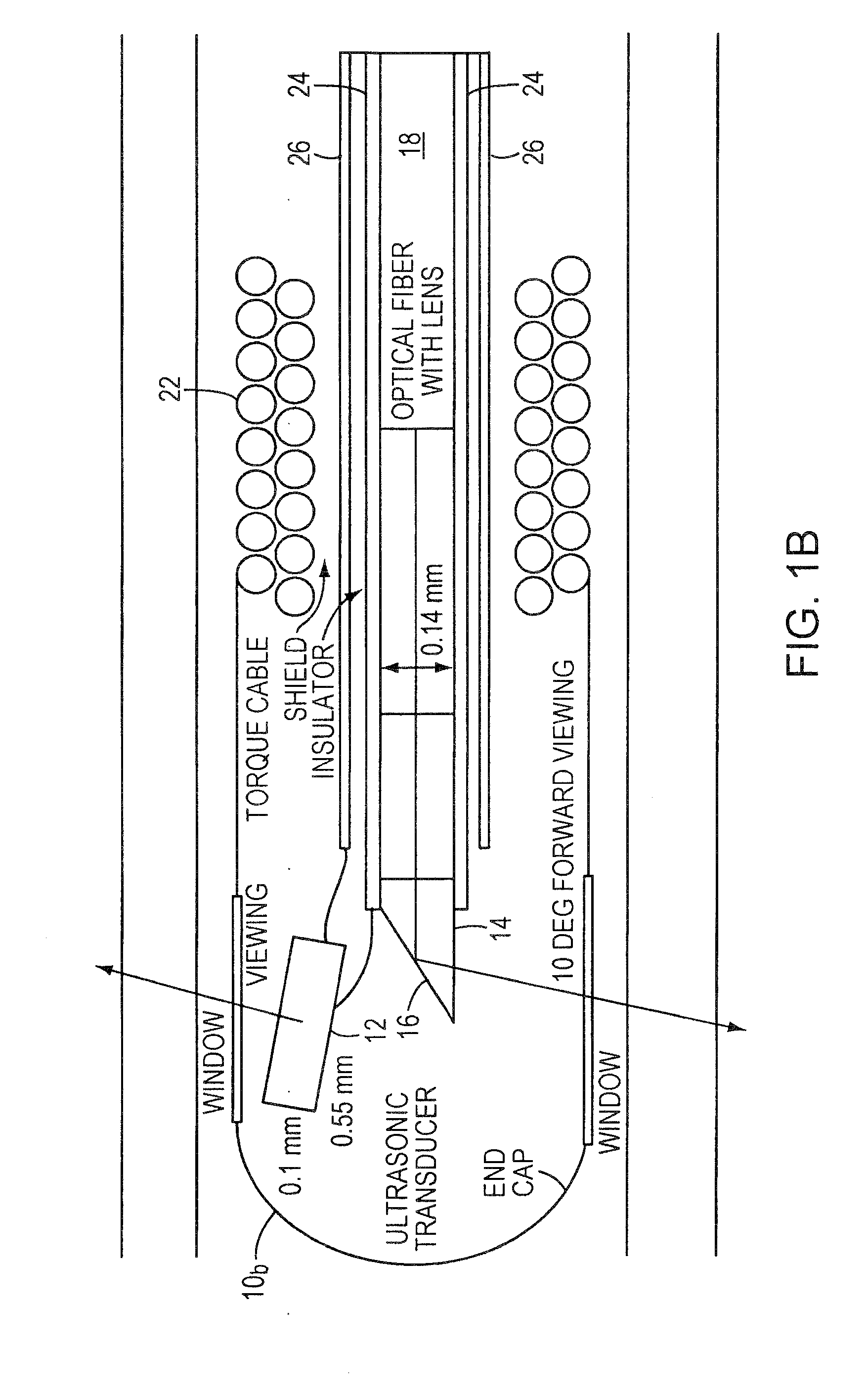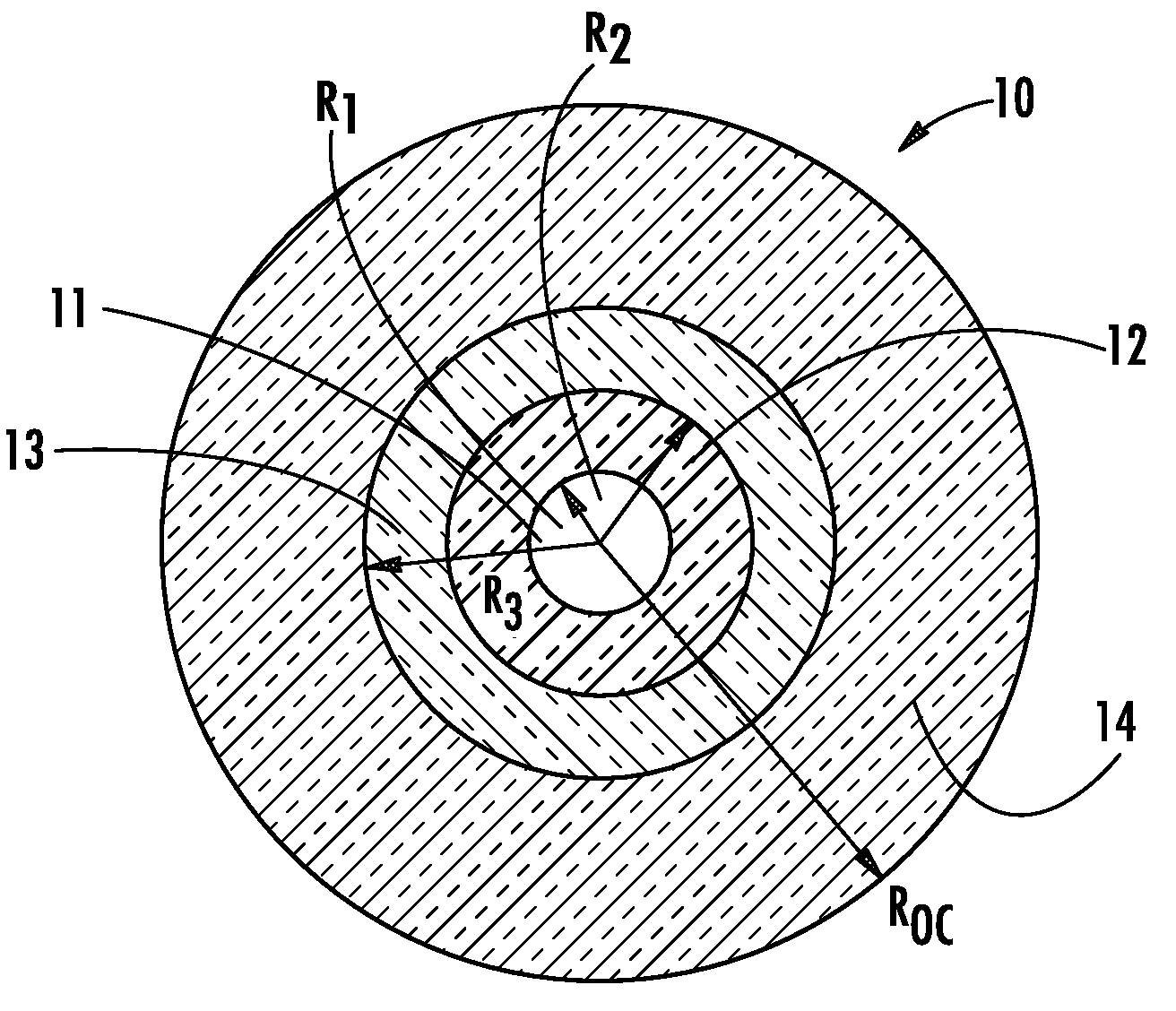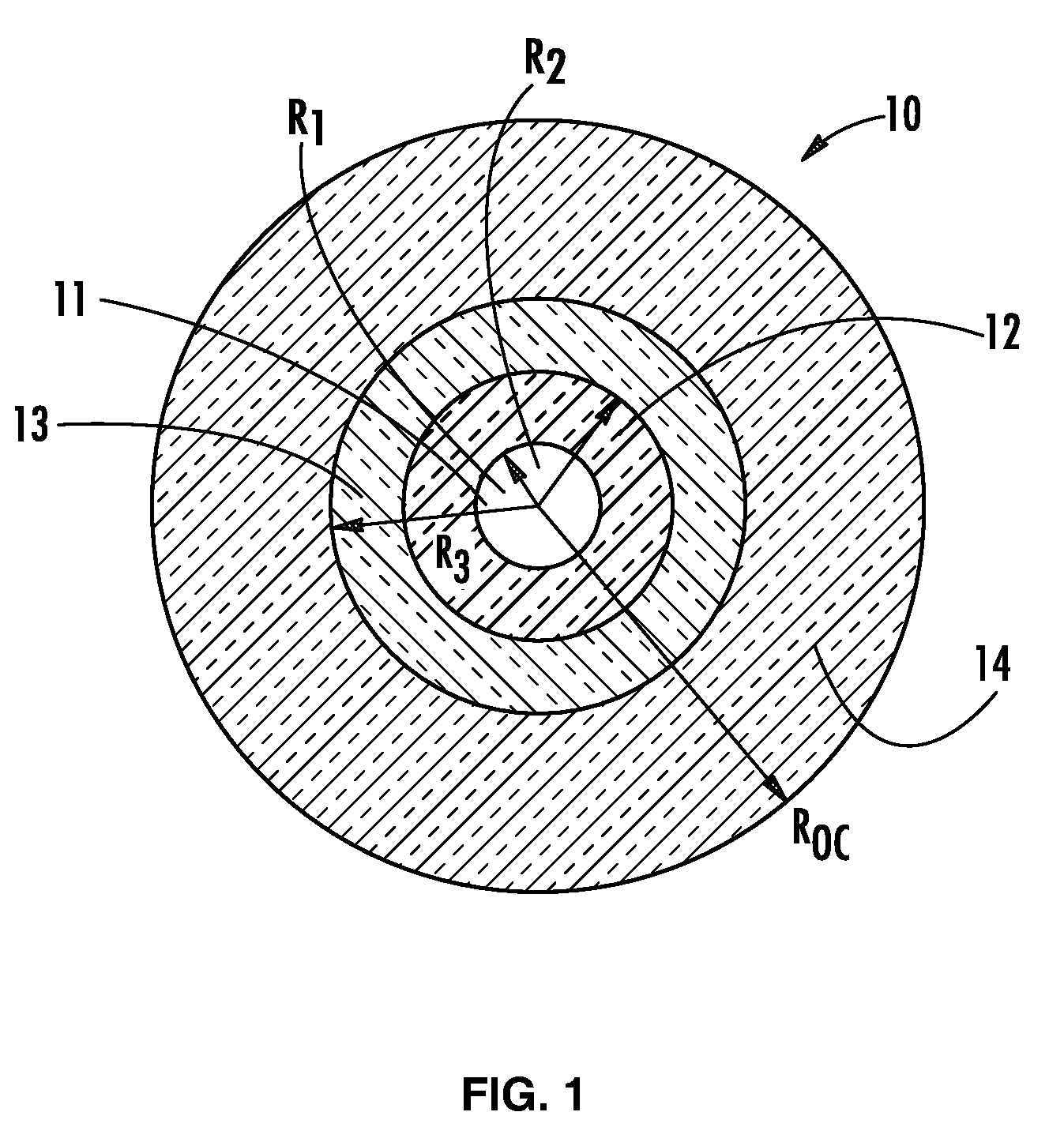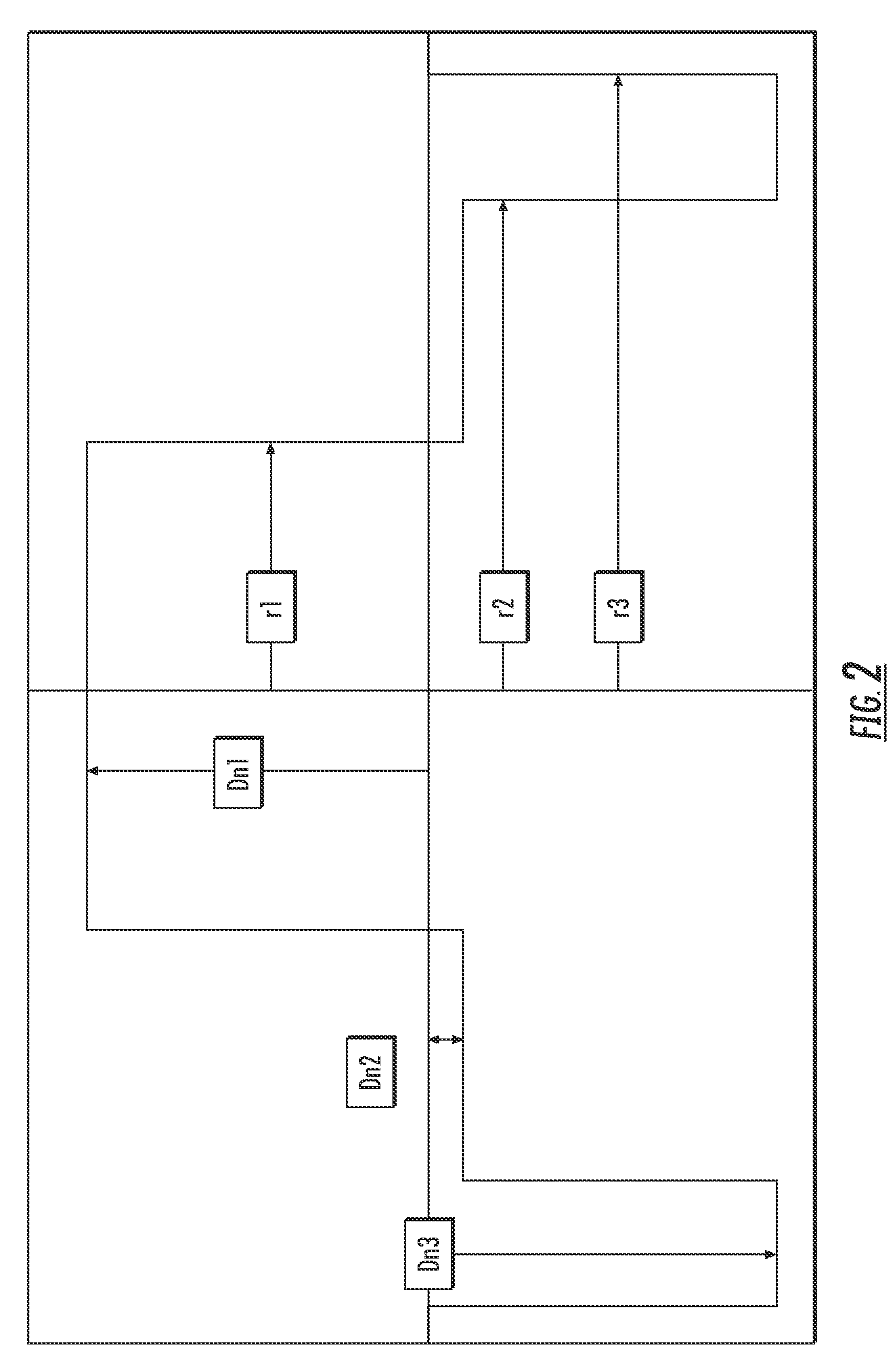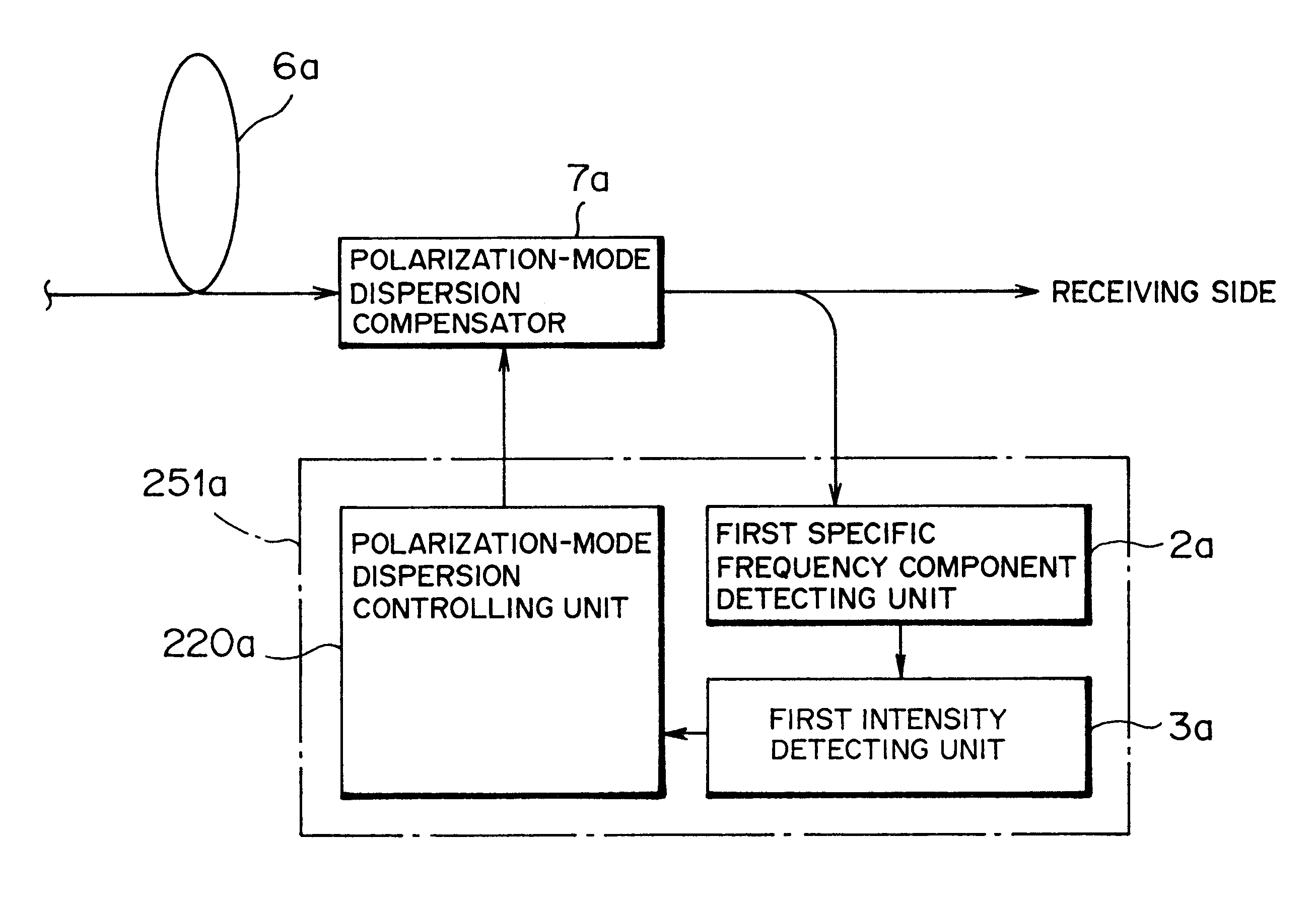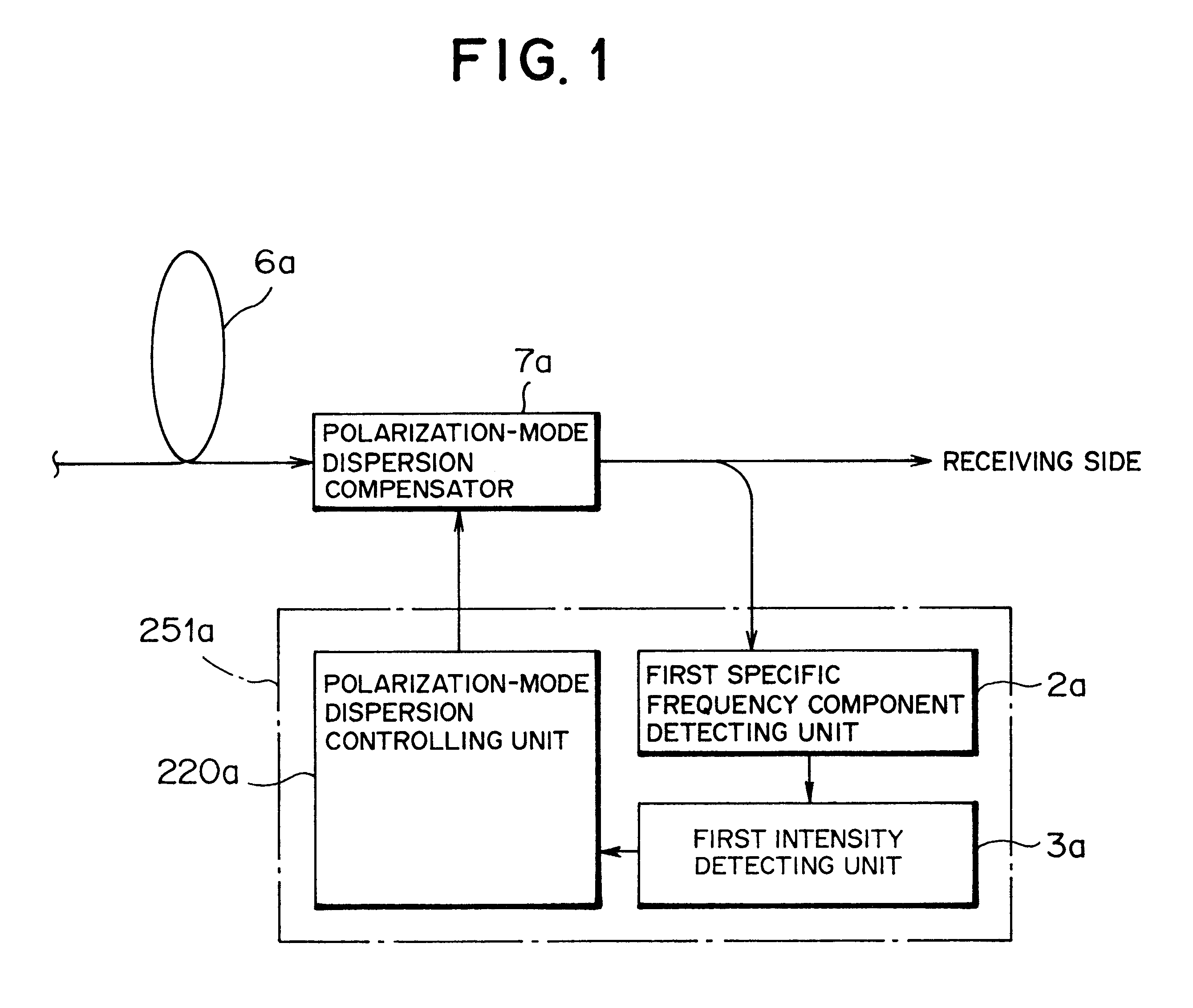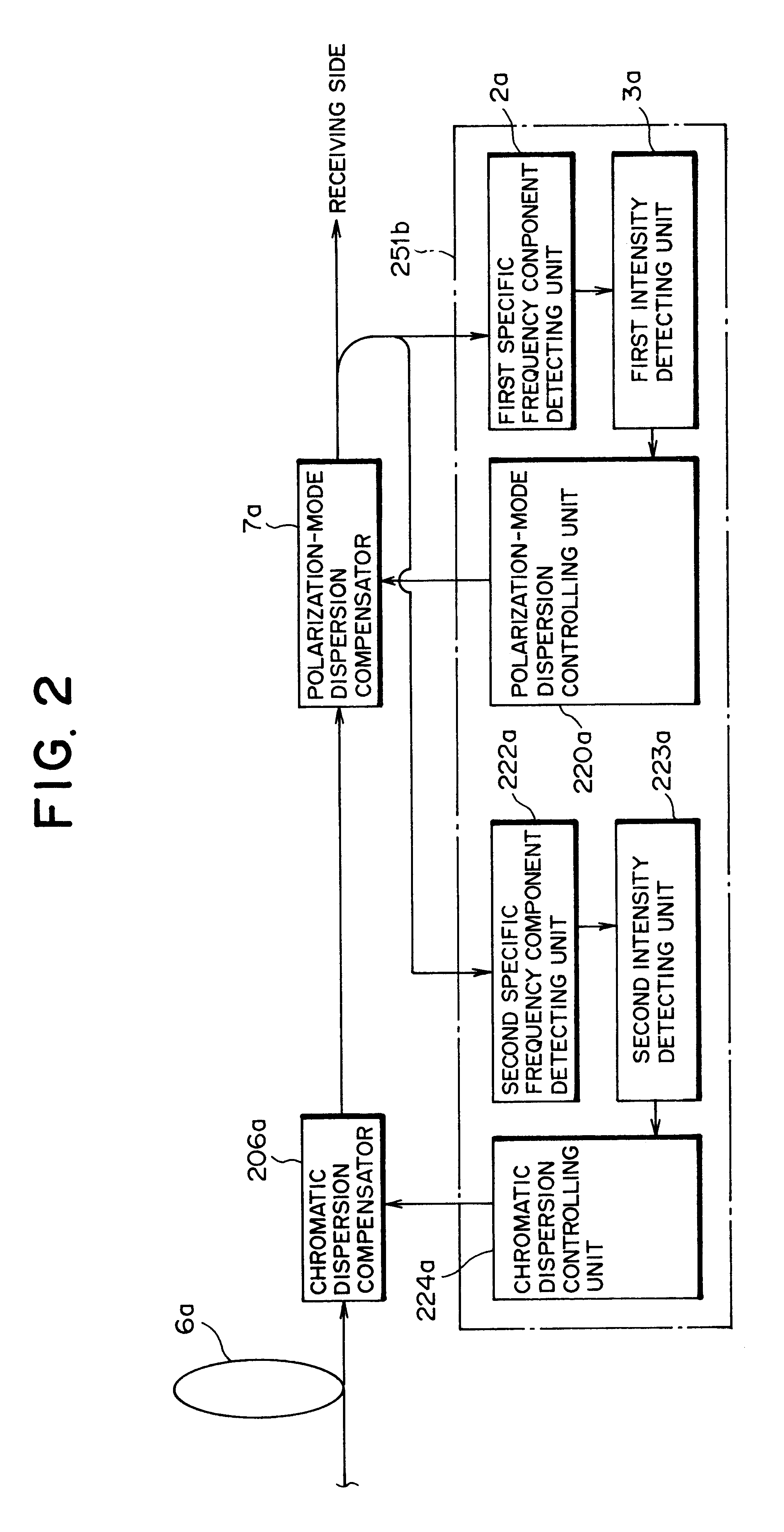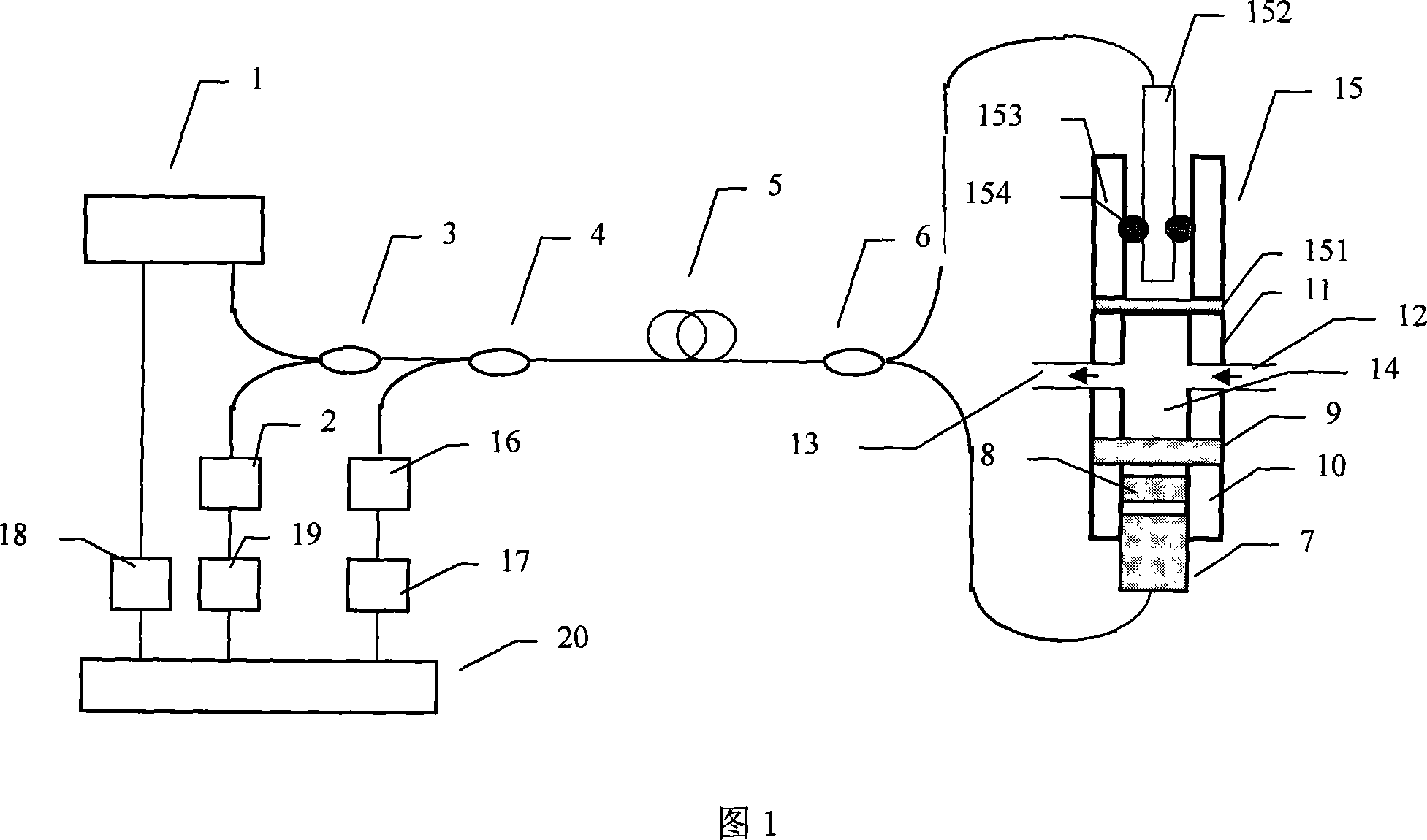Patents
Literature
Hiro is an intelligent assistant for R&D personnel, combined with Patent DNA, to facilitate innovative research.
1435 results about "Transmission fiber" patented technology
Efficacy Topic
Property
Owner
Technical Advancement
Application Domain
Technology Topic
Technology Field Word
Patent Country/Region
Patent Type
Patent Status
Application Year
Inventor
Data Transmission Fiber Optics. Data transmission fiber optics, simply put, is the sending and receiving of data from point-to-point via a network, thus the fundamental function of all fiber systems from small to large.
Optical fiber
ActiveUS7555186B2Optical fibre with multilayer core/claddingCoupling light guidesRefractive indexMaterials science
An improved optical fiber achieves both reduced bending and microbending losses, as well as a much higher Brillouin threshold, as compared to standard transmission fibers. The optical fiber comprises a core including at least two dopants and having a refractive index difference Δn1 with an outer optical cladding, a first inner cladding having a refractive index difference Δn2 with the outer cladding, and a depressed, second inner cladding having a refractive index difference Δn3 with the outer cladding of less than −3×10−3. The radial concentration of at least one of the core dopants varies continuously over the entire core region of the optical fiber.
Owner:DRAKA COMTEQ BV
Single-mode optical fiber
ActiveUS7587111B2Reduce leakageEffectively reduce the bending lossesOptical fibre with graded refractive index core/claddingOptical fibre with multilayer core/claddingEngineeringMaterials science
Disclosed is an optical transmission fiber having reduced bending and microbending losses that is commercially usable in FTTH or FTTC transmission systems.
Owner:DRAKA COMTEQ BV
Opto-acoustic imaging devices and methods
ActiveUS20080161696A1Improve accuracyFacilitate proper co-registrationUltrasonic/sonic/infrasonic diagnosticsCatheterLight beamPhotoacoustic imaging in biomedicine
In one aspect, the invention relates to a probe. The probe includes a sheath, a flexible, bi-directionally rotatable, optical subsystem positioned within the sheath, the optical subsystem comprising a transmission fiber, the optical subsystem capable of transmitting and collecting light of a predetermined range of wavelengths along a first beam having a predetermined beam size. The probe also includes an ultrasound subsystem, the ultrasound subsystem positioned within the sheath and adapted to propagate energy of a predetermined range of frequencies along a second beam having a second predetermined beam size, wherein a portion of the first and second beams overlap a region during a scan.
Owner:LIGHTLAB IMAGING
Single-mode Optical Fiber
ActiveUS20070280615A1Reduce leakageEffectively reduce the bending lossesOptical fibre with multilayer core/claddingOptical waveguide light guideEngineeringMaterials science
Disclosed is an optical transmission fiber having reduced bending and microbending losses that is commercially usable in FTTH or FTTC transmission systems.
Owner:DRAKA COMTEQ BV
Phototherapeutic wave guide apparatus
InactiveUS6953457B2Minimize and eliminate such damageEliminating aberrant wave conductionDiagnosticsCatheterAnnular LesionProximate
Owner:CARDIOFOCUS INC
Chromatic dispersion compensating fiber
InactiveUS7483613B2Reduce the valueOptical fibre with multilayer core/claddingWavelength-division multiplex systemsSpectral bandsEngineering
Disclosed are an improved system and a related method for compensating the chromatic dispersion of a given length of a transmission fiber over a given spectral band by employing at least two chromatic dispersion compensating fibers that, with respect to the slope of the slope of the chromatic dispersion (SSi), have values of opposite signs.
Owner:DRAKA COMTEQ BV
Multi-photon endoscopic imaging system
An imaging system includes a pulsed laser, a pre-compensator for chromatic dispersion, a transmission optical fiber, and a GRIN lens. The pre-compensator chirps optical pulses received from the laser. The transmission optical fiber transports the chirped optical pulses from the pre-compensator. The GRIN lens receives the transported optical pulses from the transmission optical fiber. The GRIN lens has a wider optical core than the transmission optical fiber and substantially narrows the transported optical pulses received from the transmission optical fiber.
Owner:LUCENT TECH INC
Fibre Channel switching fabric
The Fibre. Channel standard was created by the American National Standard for Information Systems (ANSI) X3T11 task group to define a serial I / O channel for interconnecting a number of heterogeneous peripheral devices to computer systems as well as interconnecting the computer systems themselves through optical fiber and copper media at gigabit speeds (i.e., one billion bits per second). Multiple protocols such as SCSI (Small Computer Serial Interface), IP (Internet Protocol), HIPPI, ATM (Asynchronous Transfer Mode) among others can concurrently utilize the same media when mapped over Fibre Channel. A Fibre Channel Fabric is an entity which transmits Fibre Channel frames between connected Node Ports. The Fibre Channel fabric routes the frames based on the destination address as well as other information embedded in the Fibre Channel frame header. Node Ports are attached to the Fibre Channel Fabric through links.
Owner:AVAGO TECH WIRELESS IP SINGAPORE PTE
Bandwidth allocation in a synchronous transmission network for packet oriented signals
InactiveUS20030074449A1Mitigate and obviateDigital computer detailsTime-division multiplexESCONSynchronous network
A method of transporting a packet oriented client signal which uses a buffer-to-buffer flow control mechanism over a synchronous transmission network by assigning an arbitrary synchronous payload, where the synchronous payload bandwidth may be significantly smaller than the full bandwidth of the client signal. Flow control over the synchronous network is provided by the buffer-to-buffer flow control mechanism of the client signal to automatically regulate the data throughput to ensure no data can be lost. The method is independent of the Client Signal Data Rate and the provisioned SDH / SONET bandwidth, and SDH / SONET payload which may be non-concatenated, contiguously concatenated, or virtually concatenated. In particular, the method may be used to support the transport of Fibre Channel (1G, 2G and 4G), and ESCON (200M) in a synchronous payload.
Owner:CIENA
Opto-acoustic imaging devices and methods
ActiveUS7935060B2Improve accuracyFacilitate proper co-registrationUltrasonic/sonic/infrasonic diagnosticsCatheterLight beamPhotoacoustic imaging in biomedicine
Owner:LIGHTLAB IMAGING
Optical system comprising an FM source and a spectral reshaping element
InactiveUS20060029358A1Extending optical transmission lengthImprove toleranceColor television with bandwidth reductionColor television signals processingOptical propertyFrequency modulation
In one form of the present invention, there is provided a fiber optic communication system comprising: an optical signal source adapted to receive a base binary signal and produce a first signal, said first signal being frequency modulated; and an optical spectrum reshaper adapted to reshape the first signal into a second signal, said second signal being amplitude modulated and frequency modulated; characterized in that: the frequency characteristics of said first signal, and the optical characteristics of said optical spectrum reshaper, being such that the frequency characteristics of said second signal are configured so as to increase the tolerance of the second signal to dispersion in a transmission fiber. In another form of the present invention, there is provided an optical transmitter comprising: a frequency modulated source for generating a first frequency modulated signal, and an amplitude modulator for receiving the first frequency modulated signal and for generating a second amplitude and frequency modulated signal. In another form of the present invention, there is provided a method for transmitting an optical signal through a transmission fiber comprising: receiving a base binary signal; operating an optical signal source using the base binary signal to produce a first signal, said first signal being frequency modulated; passing the frequency modulated signal through an optical spectrum reshaper so as to reshape the first signal into a second signal, said second signal being amplitude modulated and frequency modulated; the frequency characteristics of said first signal, and the optical characteristics of said optical spectrum reshaper, being such that the frequency characteristics of said second signal are configured so as to increase the tolerance of the second signal to dispersion in a transmission fiber; and passing the second signal through a transmission fiber. In another form of the present invention, there is provided a method for transmitting a base signal, comprising: using the base signal to produce a frequency modulated signal; and providing an amplitude modulator for receiving the frequency modulated signal and for generating an amplitude and frequency modulated signal.
Owner:II VI DELAWARE INC
Systems and methods for spectroscopy of biological tissue
InactiveUS7647092B2Rapid and natureAccurate assessmentSurgeryScattering properties measurementsCoronary artery diseaseSpectroscopy
The system and method of the present invention relates to using spectroscopy, for example, Raman spectroscopic methods for diagnosis of tissue conditions such as vascular disease or cancer. In accordance with a preferred embodiment of the present invention, a system for measuring tissue includes a fiber optic probe having a proximal end, a distal end, and a diameter of 2 mm or less. This small diameter allows the system to be used for the diagnosis of coronary artery disease or other small lumens or soft tissue with minimal trauma. A delivery optical fiber is included in the probe coupled at the proximal end to a light source. A filter for the delivery fibers is included at the distal end. The system includes a collection optical fiber (or fibers) in the probe that collects Raman scattered radiation from tissue, the collection optical fiber is coupled at the proximal end to a detector. A second filter is disposed at the distal end of the collection fibers. An optical lens system is disposed at the distal end of the probe including a delivery waveguide coupled to the delivery fiber, a collection waveguide coupled to the collection fiber and a lens.
Owner:MASSACHUSETTS INST OF TECH
Low bending loss multimode fiber transmission system
ActiveUS20090092365A1Low bend-lossOptical fibre with graded refractive index core/claddingOptical waveguide light guideEngineeringEffective refractive index
A bend-loss tolerant multimode fiber transmission system is provided. The system includes: a transmission fiber having a core and a cladding, and a mode-launching system for selectively exciting only a useful portion of the transmission modes, that portion corresponding to high effective refractive indices relative to a refractive index of the cladding the useful portion corresponding to a substantial number of modes. The mode-launching system may include a lead-in fiber, coupled to the transmission fiber, supporting a number of lead-in modes substantially corresponding to the number of transmission modes in the useful portion. The transmission fiber may have a refractive index profile, within a region of its core that is aligned with the lead-in fiber core, which has a shape that matches a refractive index profile shape in the lead-in fiber core. The transmission fiber core may have a graded refractive index profile that is parabolic or nearly parabolic or truncated.
Owner:LUMENTUM D O O OPTICNA VLAKNA
Systems and methods for transmitting quantum and classical signals over an optical network
ActiveUS7248695B1Reduce Optical NoiseKey distribution for secure communicationSecret communicationMultiplexingLength wave
Systems and methods for transmitting quantum and classical signals over an optical network are disclosed, wherein the quantum signal wavelength either falls within the classical signal wavelength band, or is very close to one of the classical signal wavelengths. The system includes a deep-notch optical filter with a blocking bandwidth that includes the quantum signal wavelength but not any of the classical signal wavelengths. The deep-notch optical filtering is applied to the classical signals prior to their being multiplexed with the quantum signals to prevent noise generated by the classical signals from adversely affecting transmission of quantum signals in the transmission optical fiber. Narrow-band filtering is also applied to the quantum signals prior to their detection in order to substantially exclude spurious non-quantum-signal wavelengths that arise from non-linear effects in the optical fiber. The present invention allows for the quantum and classical signals to have wavelengths within just a few nanometers of one another, which has benefits for both classical and quantum signal transmission on a common transmission optical fiber.
Owner:MAGIQ TECH INC
Optical fiber coupling arrangement
Apparatus for optically pumping a clad amplifier fiber includes one or more transmission fibers arranged and configured to insert pump-light from a pump light source such as a diode-laser into the cladding of the amplifier fiber. The pump light propagates through the cladding and a portion of the pump light is absorbed in the doped core of the amplifier fiber. At least one of the transmission fibers is arranged to receive an unabsorbed portion of the propagated pump light from the amplifier cladding and re-insert the unabsorbed portion of the pump-light into the cladding for re-propagation through the cladding. This provides that pump light that would otherwise be wasted is circulated through the amplifier fiber for further absorption by the amplifier core.
Owner:COHERENT INC
Fluorine-doped optical fiber
ActiveUS7526177B2Improve the immunityReduce transmission lossOptical fibre with multilayer core/claddingOptical waveguide light guideRefractive indexSingle mode fiber transmission
Owner:DRAKA COMTEQ BV
Electronic endoscope with three-dimensional image capturing device
InactiveUS6933962B2Reduce the overall diameterTelevision system detailsOptical rangefindersLight beamOptoelectronics
An electronic endoscope comprises a housing and a flexible tube. A light-transmitting optic fiber and a light-receiving optic fiber are provided in the flexible tube. A light source and an imaging device are provided in the housing. The light source outputs a pulsed distance-measuring light beam, which is transmitted along the light-transmitting optic fiber, and irradiated to a subject. A reflected light beam generated by the subject due to the distance-measuring light beam is transmitted along the light-receiving optic fiber, to enter the imaging device, in which an electric charge corresponding to the subject image (i.e., an image signal of a three-dimensional image) is accumulated. A timing of the accumulating operation of the imaging device is delayed depending on the lengths of the fibers.
Owner:RICOH IMAGING COMPANY
Optical fiber systems for delivering short high power pulses
InactiveUS20060233554A1Minimal distortionMinimum non-linear impairmentDistortion/dispersion eliminationOptical light guidesNonlinear distortionFew mode fiber
Described is an optical fiber system for delivering ultrashort pulses with minimal distortions due to nonlinearity. The system is based on delivering the optical pulses in a higher order mode (HOM) of a few-moded fiber. The fiber is designed so that the dispersion for the HOM is very large. This results in a dispersion length LD for the delivery fiber that is exceptionally small, preferably less than the non-linear length LNL. Under these conditions the system may be designed so the optical pulses experience minimum non-linear impairment, and short pulse / high peak power levels are reproduced at the output of the delivery fiber.
Owner:FURAKAWA ELECTRIC NORTH AMERICA INC
Endoscopic system using an extremely fine composite optical fiber
InactiveUS20050192480A1Precise applicationClear pictureCladded optical fibreEndoscopesEyepieceLaser light
Endoscopic system 40 comprises composite optical fiber 34 that consists of a large-diameter, laser light transmitting optical fiber surrounded by a large number of image transmitting fibers that are bundled together to form an integral assembly with the central fiber, laser applying and image observing optical unit 42 that is connected to the eyepiece portion of said composite optical fiber such that it launches laser light into said large-diameter optical fiber and that the image being transmitted through said image transmitting optical fiber is focused on a camera to become observable, and an illuminating light transmitting unit that transmits illuminating light to the tip of the objective portion of said composite optical fiber for irradiation purposes.
Owner:NAT INST FOR QUANTUM & RADIOLOGICAL SCI & TECH +2
In-line forward/backward fiber-optic signal analyzer
ActiveUS20110091155A1Reduce catastrophic damageAvoid damageExcitation process/apparatusFibre transmissionAudio power amplifierSignal analyzer
An optical connector having a plurality of directional taps and connecting between a plurality of optical waveguides (e.g., such as a connector between a waveguide that is part of, or leads from, a seed laser and / or an initial optical-gain-fiber power amplifier, and a waveguide that is part of, or leads to, an output optical-gain-fiber power amplifier and / or a delivery fiber), wherein one of the directional taps extracts a small amount of the forward-traveling optical output signal from the seed laser or initial power amplifier (wherein this forward-tapped signal is optionally monitored using a sensor for the forward-tapped signal), and wherein another of the directional taps extracts at least some of any backward-traveling optical signal that may have been reflected (wherein this backward-tapped signal is optionally monitored using a sensor for the backward-tapped signal).
Owner:LOCKHEED MARTIN CORP
Hub for a passive optical network hub
ActiveUS20050036786A1Wavelength-division multiplex systemsCoupling light guidesOptical pumpingRare earth
A hub for use in a passive optical network (PON) includes a transmission fiber on which an information-bearing optical signal is received, a double-cladded, rare-earth doped fiber located along the transmission fiber for imparting gain to the information-bearing optical signal, and a combiner having an output coupled to the transmission fiber and a plurality of inputs. The output is coupled to the transmission fiber such that optical energy at pump energy wavelengths but not signal wavelengths are communicated therebetween. At least one pump source is optically coupled to one of the inputs of the combiner for providing optical pump energy to the double-cladded, rare-earth doped fiber. An optical splitter is also provided. The optical splitter has an input coupled to the transmission fiber for receiving an amplified, information-bearing optical signal and a plurality of outputs for directing portions of the amplified, information-bearing optical signal to remote nodes in the PON.
Owner:GOOGLE TECH HLDG LLC
Energy-transmitting or ultraviolet light-transmitting optical fiber preform and production process thereof
InactiveUS20090208760A1Reduce transmission lossIncreased durabilityGlass making apparatusGlass/slag layered productsHigh energyUltraviolet lights
The present invention is to provide an optical fiber preform suitable for the production of an energy-transmitting or ultraviolet light-transmitting optical fiber, which has an excellent transmittance of a high-energy light of 50 KW / cm2 or more in terms of laser peak power or an ultraviolet light, to be transmitted through the optical fiber and which exhibits excellent durability that causes almost no deterioration by the irradiation with those two lights; and a production process thereof. The present invention relates to an energy-transmitting or ultraviolet light-transmitting optical fiber preform, having a core and a cladding each comprising a silica glass, wherein the core has an average OH concentration of 0 to 10 ppm, an average O2 concentration of ≦1015 molecules / cm3, an average ODC (I) concentration of ≦1013 defects / cm3, an average ODC (II) concentration of ≦1012 defects / cm3 and an average F concentration of ≦1,000 ppm, and the cladding has an average OH concentration of 0 to 10 ppm, an average F concentration of ≧7,000 ppm, an average O2 concentration of ≦1016 molecules / cm3, an average ODC (I) concentration of ≦1013 defects / cm3 and an average ODC (II) concentration of ≦1012 defects / cm3.
Owner:ASAHI GLASS CO LTD
Method and apparatus for optical delivery fiber having cladding with absorbing regions
ActiveUS7835608B2Reduce concentrationReduce riskLaser detailsOptical fibre with multilayer core/claddingEngineeringFiber amplifier
Apparatus and method for distributed absorption of pump light over a length of delivery fiber that is, for example in some embodiments, fusion spliced to an end of a multiply clad gain fiber that has significant unused pump light at the end of the gain fiber. In some embodiments, this includes coupling a fiber amplifier to a passive-core delivery fiber that includes a distributed pump dump. In some embodiments, at an output end of the amplifying fiber there is still a significant amount of pump power. If all this pump power is dumped in one small place (e.g., at a splice between the amplifying fiber and a passive delivery fiber) a hot spot will result, leading to unreliable devices that fail (have catastrophic changes in operating performance). The present invention provides a distributed pump dump built into a delivery fiber that is passive to the signal in its core.
Owner:LOCKHEED MARTIN CORP
Transmission Optical Fiber Having Large Effective Area
ActiveUS20110044595A1Increase the effective areaRestrict propagationOptical fibre with graded refractive index core/claddingOptical waveguide light guideUltrasound attenuationLength wave
The present invention relates to a transmission optical fiber. The optical fiber includes, from its center to its periphery a central core, an intermediate cladding, and a depressed cladding. The optical fiber has an effective area (Seff) of at least about 120 μm2 at a wavelength of 1550 nm and an effective cutoff wavelength (λCeff) of less than 1600 nm. The optical fiber has an effective area of more than 120 μm2 with a cutoff wavelength limited to less than about 1600 nm without degradation of other optical parameters (e.g., attenuation losses and dispersion).
Owner:DRAKA COMTEQ BV
Fiber optic probe and coupler assembly
InactiveUS6292610B1Precise alignmentAccurate placementInvestigating moving fluids/granular solidsCoupling light guidesEngineeringOptical communication
A fiber optic probe and optical coupler assembly, and methods for making the assembly and reproducibly aligning a plurality of optical fibers therein. The coupler is used with a probe that includes a housing or probe body, a probe tip, at least one light-transmitting fiber, at least one light-receiving fiber spaced apart from the light-transmitting fiber, and (if desired), in-line devices such as filters and lenses positioned in optical communication with the fibers. The coupler includes at least one aligning pin that helps maintain the transmitting and receiving fibers in precise, reproducible relative alignment therein; thus, the coupler can be cut to install filters and other in-line devices, then readily re-assembled for use with the cut ends precisely and accurately realigned. The coupler is simple and rugged, and can be manufactured and assembled without the need for high-precision machining or optical alignment procedures.
Owner:INTERNAL REVENUE SERVICE
Multicore transmission and amplifier fibers and schemes for launching pump light to amplifier cores
ActiveUS20110279888A1Fibre transmissionActive medium shape and constructionAudio power amplifierEngineering
An optical transmission and amplification system includes a multichannel transmission span with a length of a multicore transmission fiber having a plurality of individual transmission cores. A first tapered multicore coupler provides connectivity between the plurality of transmission cores of the multicore fiber and a respective plurality of individual transmission leads. A fiber amplifier is provided having a plurality of individual cores including at least one pump core and a plurality of amplifier core. A second tapered multicore coupler provides connectivity between the amplifier cores of the fiber amplifier and a respective plurality of amplifier leads, and between the at least one pump core and a respective pump lead.
Owner:OFS FITEL LLC
Opto-Acoustic Imaging Devices and Methods
ActiveUS20110172511A1Improve accuracyEfficient methodUltrasonic/sonic/infrasonic diagnosticsCatheterLight beamPhotoacoustic imaging in biomedicine
In one aspect, the invention relates to a probe. The probe includes a sheath, a flexible, bi-directionally rotatable, optical subsystem positioned within the sheath, the optical subsystem comprising a transmission fiber, the optical subsystem capable of transmitting and collecting light of a predetermined range of wavelengths along a first beam having a predetermined beam size. The probe also includes an ultrasound subsystem, the ultrasound subsystem positioned within the sheath and adapted to propagate energy of a predetermined range of frequencies along a second beam having a second predetermined beam size, wherein a portion of the first and second beams overlap a region during a scan.
Owner:LIGHTLAB IMAGING
Transmission optical fiber having large effective area
ActiveUS8041172B2Increase the effective areaLimit the bending and microbending lossesOptical fibre with graded refractive index core/claddingOptical waveguide light guideAttenuation lossMaterials science
The present invention relates to a transmission optical fiber. The optical fiber includes, from its center to its periphery a central core, an intermediate cladding, and a depressed cladding. The optical fiber has an effective area (Seff) of at least about 120 μm2 at a wavelength of 1550 nm and an effective cutoff wavelength (λCeff) of less than 1600 nm. The optical fiber has an effective area of more than 120 μm2 with a cutoff wavelength limited to less than about 1600 nm without degradation of other optical parameters (e.g., attenuation losses and dispersion).
Owner:DRAKA COMTEQ BV
Polarization-mode dispersion detecting method, and a dispersion compensation controlling apparatus and a dispersion compensation controlling method
InactiveUS6728491B1Inhibit deteriorationGreat contributionDistortion/dispersion eliminationElectromagnetic transmittersUltra high speedFrequency spectrum
A dispersion compensation controlling apparatus used in a very high-speed optical communication system adopting optical time division multiplexing system comprises a first specific frequency component detecting unit (2a) detecting a first specific frequency component in a baseband spectrum in a transmission optical signal inputted to a receiving side over a transmission fiber as a transmission line (6a), a first intensity detecting unit (3a) detecting information on an intensity of the first specific frequency component detected by the first specific frequency component detecting unit (2a), and a polarization-mode dispersion controlling unit (220a) controlling a polarization-mode dispersion quantity of the transmission line (6a) such that the intensity of the first specific frequency component detected by the first intensity detecting unit (3a) becomes the maximum, thereby easily detecting and compensating polarization-mode dispersion generated in a high-speed optical signal.
Owner:FUJITSU LTD
Optical fiber gas sensing method and sensor
InactiveCN101055243AReduce noiseNo polarization effectUltrasonic/sonic/infrasonic wave generationMaterial analysis by optical meansLight energyBand-pass filter
A optical fiber gas sensor employs a optical fiber Fabry-Perot interferometer constituting a low reflection cavity lens and a measurement optical fiber to detect sound pressure wave signal generated by gas after absorbing light energy, and a realization method for optical acoustic gas sense technique is provided. Pulse modulated excited light is emitted by an excitation light source, passes through a band-pass filter and enters a gas cavity from a gas cavity window; the excited light emitted into the gas cavity generates a sound pressure wave which strength corresponds to measured gas concentration in the gas cavity after absorbing by the measured gas; the sound pressure wave is transmitted to vibration of a vibrating film sheet by the vibrating film sheet which is equipped at other end of the gas cavity; a measuring light signal emitted by measuring light source driven by a first drive power supply passes through a optical fiber wave combination equipment, a transmission optical fiber and a optical fiber wave separation equipment and enters a measuring optical fiber of the Fabry-Perot interferometer; concentration value of the measured gas is obtained by optical path difference of the return light beam and the light beam directly reflected by an optical end face.
Owner:NANJING XUFEI PHOTOELECTRIC
Features
- R&D
- Intellectual Property
- Life Sciences
- Materials
- Tech Scout
Why Patsnap Eureka
- Unparalleled Data Quality
- Higher Quality Content
- 60% Fewer Hallucinations
Social media
Patsnap Eureka Blog
Learn More Browse by: Latest US Patents, China's latest patents, Technical Efficacy Thesaurus, Application Domain, Technology Topic, Popular Technical Reports.
© 2025 PatSnap. All rights reserved.Legal|Privacy policy|Modern Slavery Act Transparency Statement|Sitemap|About US| Contact US: help@patsnap.com
